gair rhydd

In this week’s issue: Jocelyn Davies AM on the “smacking ban,” NUS Wales President Beth Button on student democracy, building the perfect CV and giving blood while playing video games






In this week’s issue: Jocelyn Davies AM on the “smacking ban,” NUS Wales President Beth Button on student democracy, building the perfect CV and giving blood while playing video games




Afreedom of information request has revealed that Cardiff University holds a number of assets in the petrochemical industry valued at over £2.5million.
Data provided to Gair Rhydd shows that the institution has strong financial interests in numerous companies including petroleum companies BP, Tullow Oil and Shell and mining corporation Rio Tinto.
Also listed are commodity traders Glencore, oil and gas multinational Total, and American energy giant

Chevron Corporation.
In total, Cardiff University is shown to have financial links with nine companies in the sector, all of which deal in allegedly environmentally damaging practices and in the trade of non-renewable energy sources.
e University’s individual investments range from nearly half a million pounds (£410,800) in Royal Dutch Shell to £194,200 in Glencore. e institution’s total holdings in the industry amount to £2,504,881.

e figures were obtained from the Finance Divsion by student campaign group People and Planet. A campaigner told Gair Rhydd that their request had taken “about six weeks” to receive a response, despite Freedom of Information requests having a legally enshrined deadline of four weeks (or 20 working days).
People and Planet alleges that the sum is part of a £1.9 billion investment in the petrochemical industry by British universities. If this figure is accurate, then it equates to an av-

erage of £2,083 per student enrolled across the country’s institutions.
Of this, a small proportion is alleged to be invested directly in the shares of the numerous companies that control the world’s oil, coal and gas reserves.
e revelations come in the wake of a Student Senate debate focused upon the University’s investment portfolio, with Ethical and Environment Officer Daniel Roberts stating that “investing in companies that put our world at risk can only be a negative”.
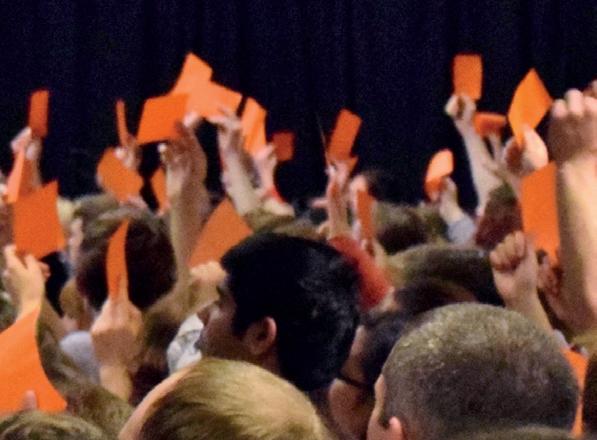




EDITOR
Michael O’Connell-Davidson
DEPUTY EDITOR
Georgia Hamer
GAIR
RHYDD CO-ORDINATOR
Elaine Morgan
NEWS
Georgia Hamer
Katie Evans
Alexander Norton
Anna Lewis
ADVICE
Kirsty Fardell
COMMENT
Anne Porter
Olivier van den Bent-Kelly
COLUMNIST
Jason Roberts
POLITICS
Carwyn Williams
Lauren Boyd
Rhiannon Tapp
SCIENCE
Shanna Hamilton
Meryon Roderick
SOCIETIES
Hannah Sterritt
TAF-OD
Steffan Bryn Jones
Morgan Owen
SPORT
David Hooson
Rory Benson
Joe Atkinson
PRODUCTION
EDITOR
Sum Sze Tam
EDITORIAL
ASSISTANTS
Amin Rali
Davie Whyte
SPECIAL THANKS
Extensive photography this issue came from Taliesin Coombes and Laura Sargent. Both have contributed a great deal to the aesthetic quality of this issue, so many thanks to both from the GR team.
Want to join the team?
Editorial conferences are each monday at 5PM. Proofreading takes place on Thursdays at 6PM in the media office during print weeks.
Write us a letter letters@gairrhydd.com Tweet us: @gairrhydd Online at: gairrhydd.com
I read a Spectator article about student democracy earlier earlier this month, and I did so with considerable interest. If you haven’t read it yet, google the term ‘Stepford Students,’ (a term derived from “the stepford wives,” a novel about a neighbourhood of robotic partners), and the name of the author, Brendan O’Neill. O’Neill suggests that the students of today are not particularly interested in free speech, and would instead prefer to live in a world where speech they did not like was eradicated or otherwise sidelined. It’s an exceptional piece of writing, and worth reading whether or not you turn out to agree with it.
I must say that from a personal perspective I share some of O’Neill’s concerns. Student activists from across the political spectrum seem to enjoy banning things with a zeal shared by some of the more regressive regimes across the world. at isn’t to say that any one group is less justified, or that certain things don’t warrant banning, but I find myself continuously surprised by how frequently the B-word creeps into some so-called “debates.”
e time of Cardiff Students’ Union Annual General Meeting (a sort of student congress, where anybody can represent themselves and their viewpoints) is good time to meditate on thoughts and feelings like this. I spoke to Daniel Palmer, the chief exec of the Students’ Union, prior to the AGM; he’s worked in other SUs, and he told me that events like the AGM at Cardiff are becoming increasingly rare. I think that’s a shame, because the AGM is arguably student politics at its best.
Yes, it’s about how well you can sway the room - too often, it’s about the strength of your rhetoric and not the strength of your argument. But it’s the one time when a statistically significant part of the student body comes together and makes decisions, and that’s something that too many Students’ Unions are losing.
Let’s use the most controversial motion of the evening as a case study, Motion II: Becoming a Pro-Choice Union. I won’t wade into my opinion of the motion or how I voted, and I don’t think it’s my place to use this page to do so. Instead, I’d like to commend all sides for having a passionate debate that didn’t resort to an adhominem firestorm. Yes, it was noted that more men spoke against the motion than women - but that isn’t an ad-hominem argument, that’s a clear observation, and it’s one that needed to be made.
It bothered me that such a motion didn’t make specific provisions for student media, or, rather, that our ability to field viewpoints of all disciplines wasn’t clarified, but there is no argument to say that such a motion shouldn’t have been brought in the first place. Equally, not everything revolves around us, nor should it.
e hour where we spoke about it was considerably reassuring for me, and I think the fact that such a motion was brought and debated so fervently is a sign that, at least at Cardiff, we’re not Stepford Students at all. We are capable of discussing things that make us uncomfortable, capable of running campaigns and holding discussions that might make us uncomfortable, and I do not see that changing anytime soon.
is mentality extends beyond the AGM. e debate between representatives for Atheism and Islam drew quite a crowd, but not once did that crowd fall below a standardof acceptable conduct. e mainstream media likes to paint Atheists and Muslims as demagogues of the same breed, yet time and time again both communities have proven that they are capable of interfacing with each other’s beliefs with calm respect and a shared interest in open discussion.
I love Cardiff University, and I love Cardiff Students’ Union for fostering an atmosphere of tolerance. I love that it makes me feel uncomfortable - and often it does - because it means that I have the same freedom to make others feel uncomfortable with my beliefs - and I’m certain I often do.
I want to make it clear to everybody reading this that I invite people of all political creeds to write for this newspaper. It is of diminished value if it only represents the views of interest groups and the media class that feel the need to write for Gair Rhydd from the perspective of their CV. We’re noticeably lacking conservative viewpoints (in terms of both big C and small C conservativism), but that’s not down to me, it’s down to the crop of writers and what they choose to contribute.
I know for a fact that Cardiff University holds people of all beliefs, and I know that because I attended AGM. Long live AGM, and long live intellectual diversity. Bring your varied ideologies to this newspaper and have them immortalised. is isn’t anybody’s dominion: it’s the free word.
I have received a large number of emails and tweets describing our distribution situation as a bit bleak. This issue of the paper will be on campus on Tuesday because of AGM coverage causing us to move our print slot back, but if you noticed that this issue didn’t arrive at the time you’d expect, we need to hear from you. Please email editor@gairrhydd.com and explain
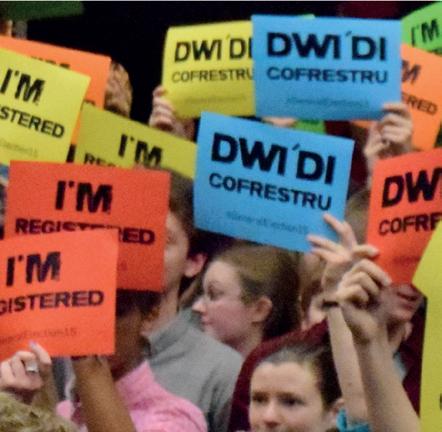
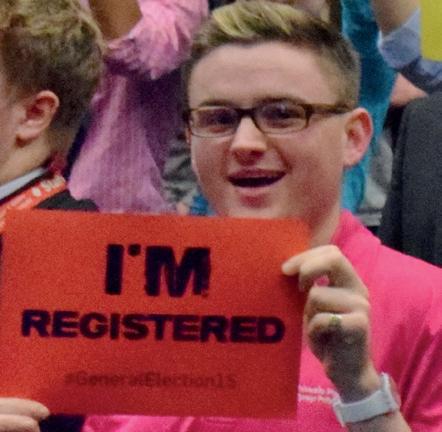
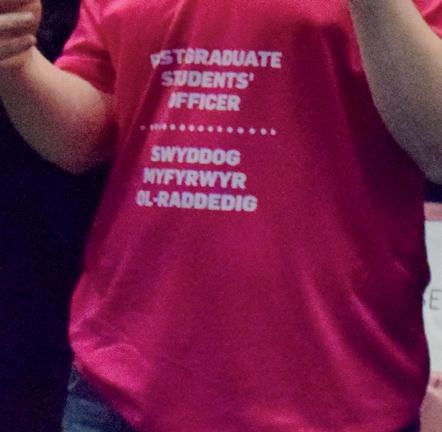

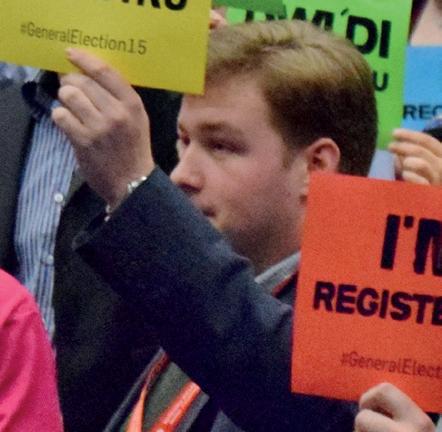
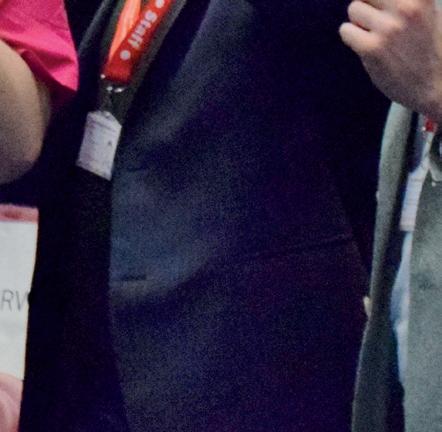
where you expected to find the paper and when, and I’ll note it down and pass it on to our distribution team. I am going to set a target next semester to see the paper everywhere it is expected to be, on time, week on week. However, we need to know what we’re getting wrong to start getting it right. Get in touch and help us (quite literally) spread the word.
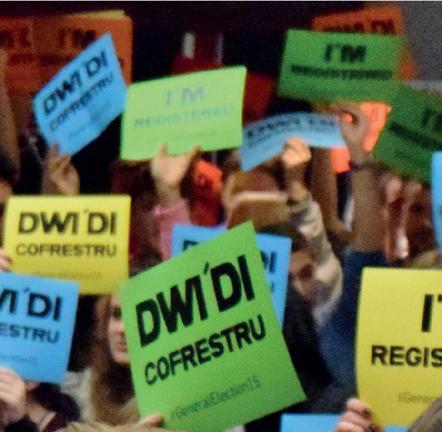
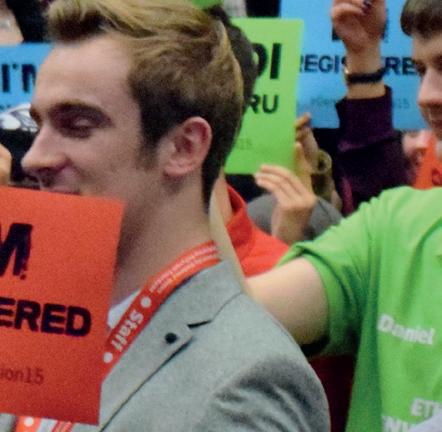
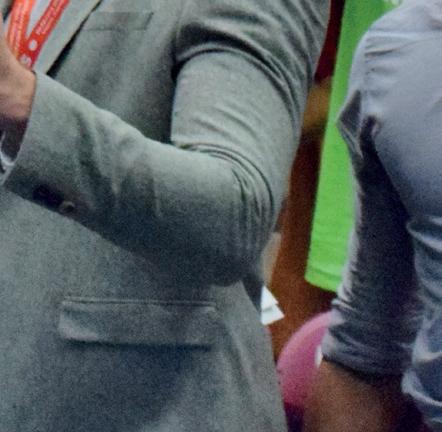
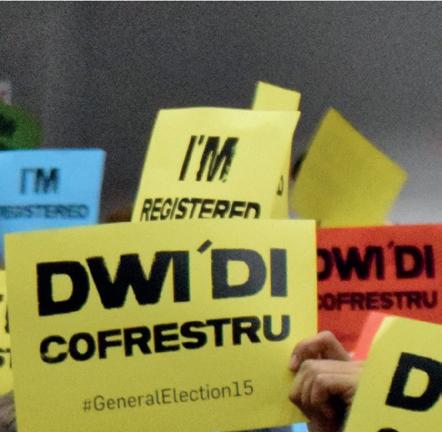
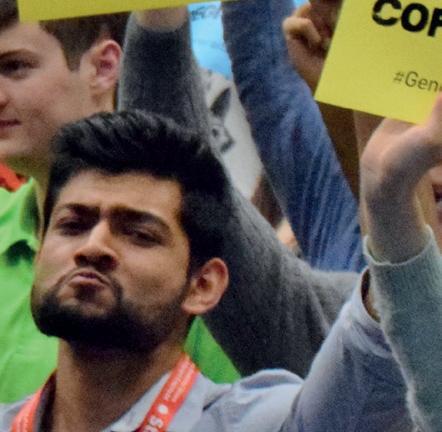
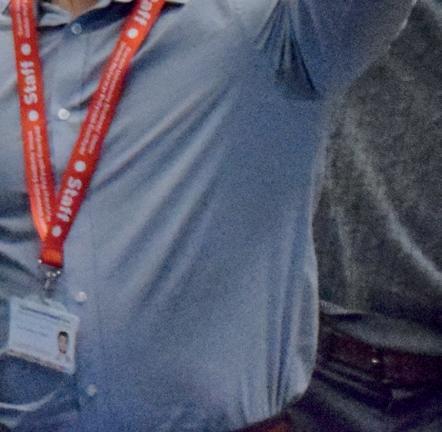
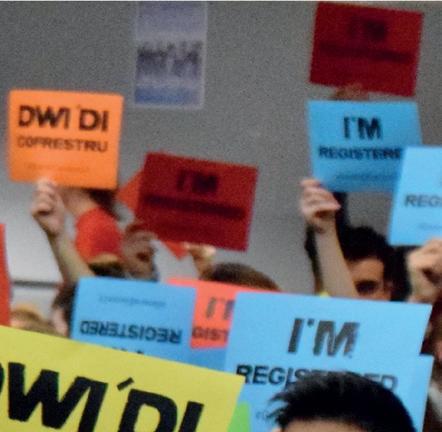
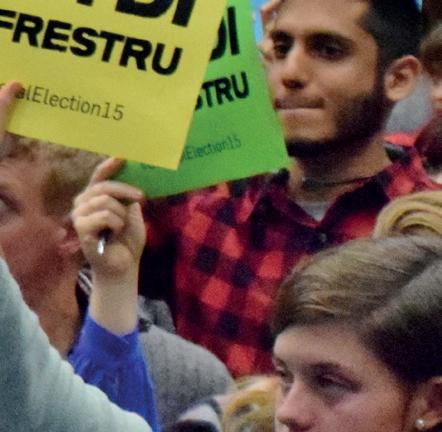
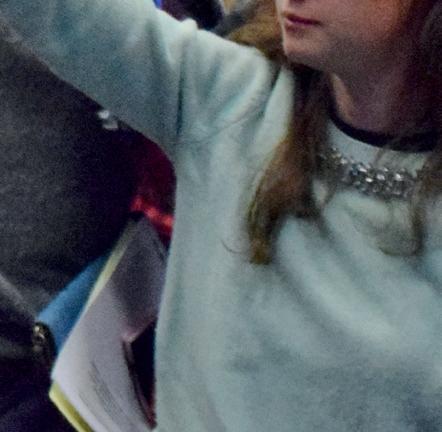



 Joe Atkinson
Alexander Norton
Joe Atkinson
Alexander Norton
Cardiff University Students’ Union held its Annual General Meeting last week, with a number of important motions on the agenda. Voters decided not to adopt a pro-choice policy or ban arms manufacturers from career fairs – but did decide to recognise the State of Palestine.
e Kooks came to Y Plas for a well received show, with the ‘She Moves In Her Own Way’ hit makers hosting a seventy-five minute set at the newly refurbished venue. e next artists to grace the Students’ Union stage will be Liverpudlian sixpiece Echo and the Bunnymen.
e University welcomed a delegation from the Beijing Normal University in China, with a two-day summit culminating in the signing of an agreement that will see the creation of the Beijing NormalCardiff Chinese College, which will see Chinese Studies undergraduates located in Cardiff and Beijing for two years apiece.
Wales’ national team manager Chris Coleman, who has seen his side go unbeaten in the opening four games of their European Championship qualifying campaign, dropped in to open Cardiff University’s new 3G (third generation) football pitch. e facility has already been used by international rugby sides.
e University has reportedly backed down over plans to dock staff participating in a nationwide marking boycott 25% of their pay. e strike, led by the University and Colleges Union (UCU), began on 6th November at sixty-nine UK institutions over proposed changes to long standing pension plans.
Cardiff University has been revealed to have a £2.5 million portfolio of investments in major oil and gas corporations, after a Freedom of Information request was submitted by campaign group People & Planet. e investments, which include companies such as BP, Royal Dutch Shell and Total, have attracted criticism from numerous student groups, including the Student Senate.
Finally, the first ever Medics’ Varsity took place and was a success - in more ways than one. Not only did it happen without a hitch, but Cardiff Medics won every single game. Good job, team!
Last week, we thought an MP had called some police officers ‘plebs’. is week, we know that an MP called some police officers ‘plebs’. Former Chief Whip Andrew Mitchell was found guilty by a judge of using the term back in 2012, following a libel case against e Sun. For the pleasure of reminding the general public of his idiocy, Mitchell is facing legal fees of up to £2million, but that’s probably pennies for him though, the toff.
Net immigration rose by 78,000 to 260,000 in the year to June. David Cameron upon election in 2010 said he planned to cut the figure to 100,000 before the 2015 election – another sterling job Dave.
Britain once again demonstrated its rampant capitalism on ‘Black Friday’ last week, as shoppers fought each other for slightly discounted Christmas gifts - the true meaning of the holidays shining through again.
e backlash of Ed Miliband’s appearance on e Agenda rumbled on as Angelina Jolie cast into doubt her future living in the UK should a Labour government introduce a mansion tax. is came after Myleene Klass’ “Paxman-style” grilling of Miliband on the ITV show over the planned policy. While initially Miliband was mocked for his poor showing against former pop group ‘Hear’Say’ member Klass, it turns out that the majority of Britons don’t have much time for the rich moaning in times of austerity.
Talking of austerity, somebody in Wales decided to spend £518,000 on a private number plate. e plate, which reads ’25 O’, was bought just hours after the buyer had purchased a similar plate for a pittance of £130,000. Stretching times indeed.
For the first time since 1996 the sales of vinyl records went through the one million mark, a significant resurgence for an industry believed to have been pretty much killed since the inception of the CD and more recently the MP3. Finally, something we can love hipsters for.
There has been major fallout to say the least in the USA over the police shooting of Michael Brown in Ferguson, Missouri following the acquittal of police officer Darren Wilson. Protests have turned to riots with growing anger over police brutality against African Americans, with this being only one of a number of similar incidents to plague the States.
Staying in America, there were some serious snowstorms over the last couple of weeks on the North East coast of the country, with New York blanketed with ‘historic’ levels of snowfall. The city of Buffalo received more snow in three days than the city is expected to receive in a whole year – so hold off on turning your heating on a little longer – it could be worse.
There was terribly sad news in sport as Australian cricketer Phillip Hughes died two days after being hit in the back of the head by a ball despite wearing a protective helmet. Hughes, 25, competed in last year’s Ashes tests. The sporting world rallied around bowler Sean Abbott, who unfortunately delivered the fatal ball.
North Korea continues to keep things in the family, as Kim Jong-un’s sister has been promoted to a senior party position. Kim Yojong, reportedly 26, has been seen by her brother’s side on numerous occasions and is thought to have a close relationship with the North Korean leader.
Pope Francis once again controversially went against a common-held Catholic belief, this time regarding animals going to heaven, giving hope to pet lovers the world, cryptically saying: “For other creatures, who are not called to eternity, death just means the end of existence on Earth.”
There was bad news for the Pope though, as topless FEMEN protestors kidnapped were depicted kidnapping a clergyman in France. FEMEN, a radical feminist movement as part of a protest against the Pope’s upcoming state visit.
tweet us @gairrhyddnews
email us news@gairrhydd.com or visit us online at gairrhydd.com/news/



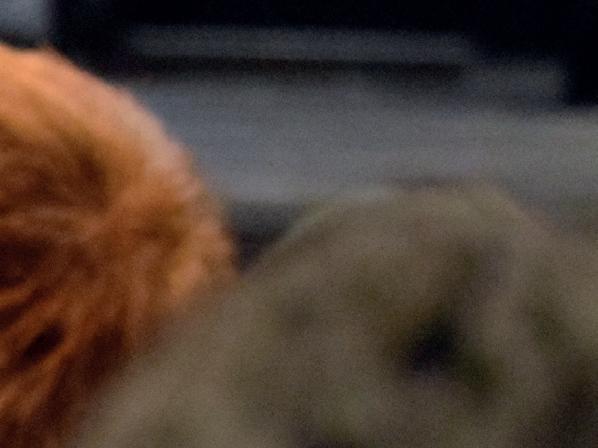


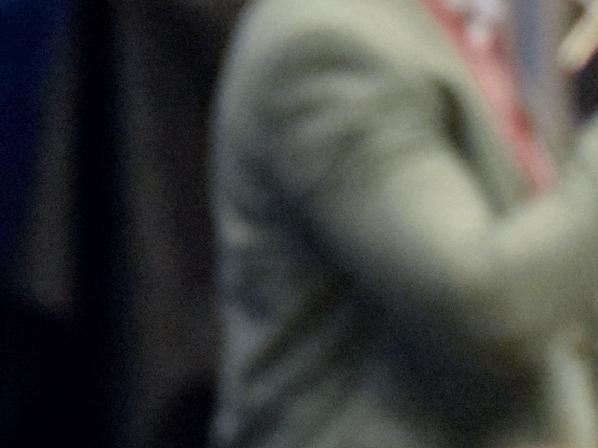
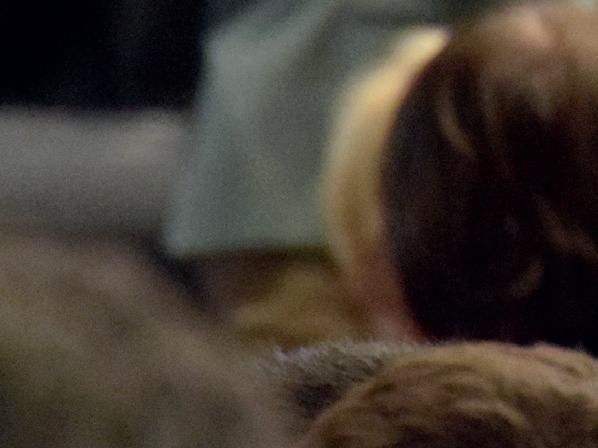

The Cardiff University Students’ Union Annual General Meeting took place last ursday raising a number of controversial issues for debate.
e event, held in the Great Hall of the Students’ Union, was opened by SU President, Elliot Howells. Howells welcomed students, describing the AGM as the “most important debate in the yearly calendar”.
Reflecting on recent progress, he described 2013 as an “exciting year” for the Student’s Union, with the largest capital development of the building since its initial construction. Howells also noted a marked increase in student involvement within the union, including society membership and participation within the Job Shop.
However, Howells was unable to answer questions bought up by Welsh Language Officer, Steffan Bryn Jones, regarding budget expenditure on the Welsh language. e Students’ Union President admitted that this was an issue which required further attention.
e meeting followed with a talk from NUS Wales President, Beth Button, who stressed the importance of politics. In the run up to the General Election, Button, urged students to register their vote, emphasising the sheer weight of the student voice in ar-
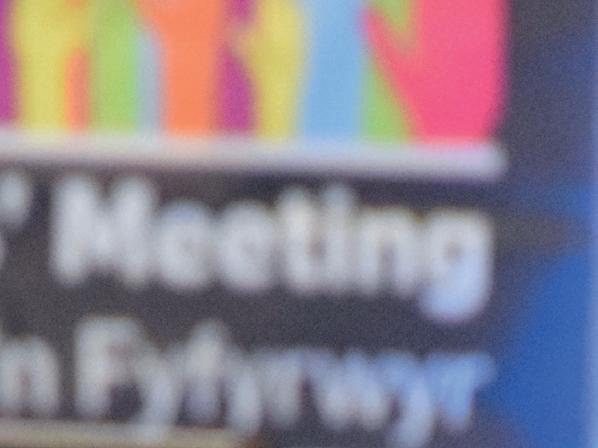


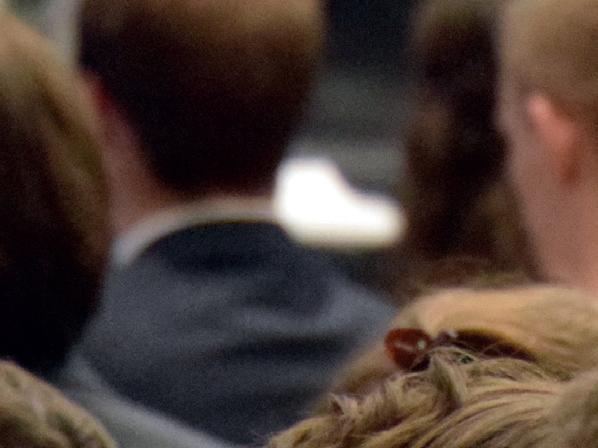



e most significant date on the student political calendar has come and gone. We go through the motions
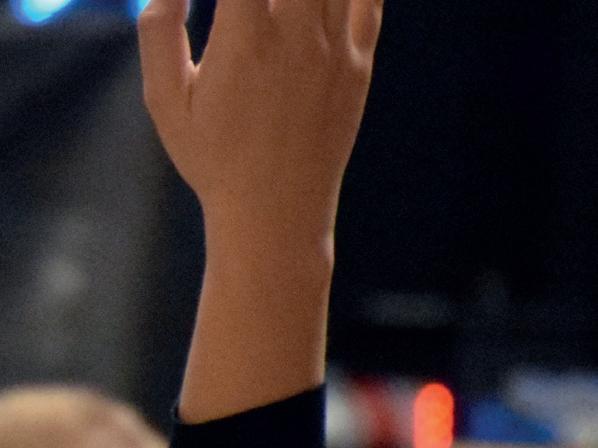
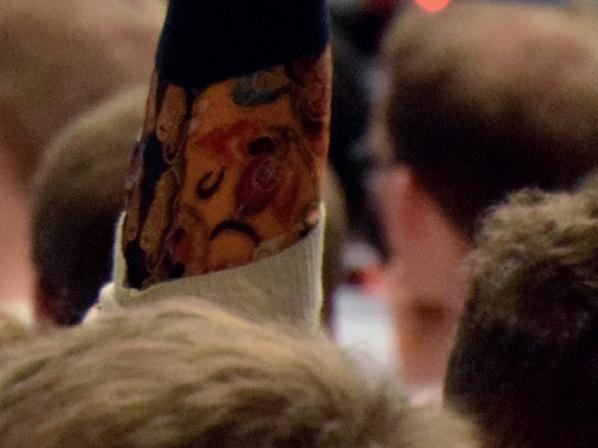

eas such as Cathays – the second most densely student populated constituency in the UK.
“Students can be an incredibly powerful force to be reckoned with”, Button explained. “It is by turning up to vote that we can tell politicians that we are a vote worth winning,” she said.
Former Student’s Union President, Cari Davies, chaired the meeting, following the approval of those present.
e first motion, submitted by LGBT+ Officer, Sam Cook, called for greater representation for LGBT+ women within the Union.
e motion was bought to AGM after passing at the first Student Senate meeting of this academic year and proposed splitting the position of LGBT+ Officer to include a separate women’s role.
In the meeting, Cook argued that the LGBT+ movement within the Union has, in the past, predominately been led by gay men, and that no one individual can work to represent the needs of all LGBT+ identities sufficiently.
By splitting the role to include a separate women’s role it was argued that the representation of women within the Union would be increased, thus encouraging more women to run in the student elections for the LGBT+ position and other roles.


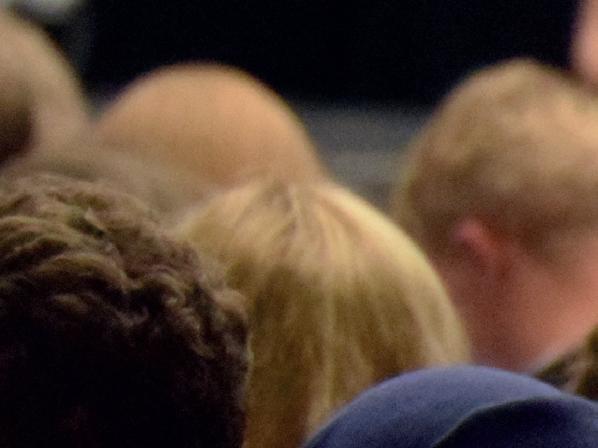

“Recently, women’s issues have been taken to the forefront of the Students’ Union, as seen with the decision to ban Dapper Laugh’s from performing. is needs to be continued”, he argued, adding: “We need to ensure that men do not continue to dominate the discussion with LGBT+ matters.”
Due to the complexity of splitting the LGBT+ role, Postgraduate Officer, Ollie Wannell, proposed that the motion should be taken back to Senate where it could be discussed at length. Wannell raised the issue of whether or not it would be fair to allow two LGBT+ officers a seat each on the Student Senate, as outlined in the motion. Cook accepted the proposal and the decision passed with the overwhelming majority of students voting in favour.
is bought the meeting on to one of the more controversial issues of the night - a motion, proposed by Rachael Melhuish, calling for the Students’ Union to define itself as pro-choice. e motion also suggested that the Union provide information about abortion and emergency contraception and appose restrictions to abortion rights being passed in Parliament.
Following a lengthy and heated debate, the motion fell by an extremely narrow margin.
Opposition to the motion included Postgraduate Officer, Ollie Wannell, who expressed that “free speech can only take place in a neutral space”.
“ e Student’s Union should be neutral and unbiased, in order to allow rational debate about abortion without alienating one side of the argument” he said.
President of the Catholic Society, Sarah Johnson, also voiced her concerns with the motion, explaining that by adopting such a stance the Catholic Society would have no choice but to withdraw from the Union.
In response to this, Rachael Melhuish defended the motion by outlining that the motion would not limit free speech but encourage debate. She said:
“It is about prioritizing helping women in a vulnerable position, not party politics or making people feel unwelcome.”
A pro-choice motion also failed at a Student Senate meeting in April earlier this year after religious groups and the Union’s pro-life society raised concerns against the motion.
Last year’s Women’s Officer, Emma Carragher, proposed the motion at the Senate for the Union to officially become a ‘pro-choice union and support other unions, especially in Northern Ireland, in their campaigns for abortion rights.’
Beth Button, NUS Wales President
Students can be an incredibly powerful force to be reckoned with “ “
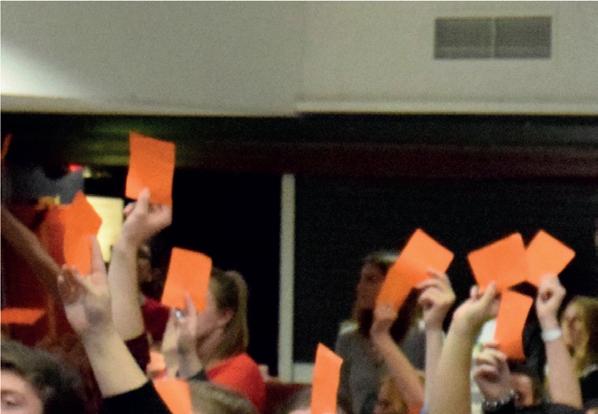

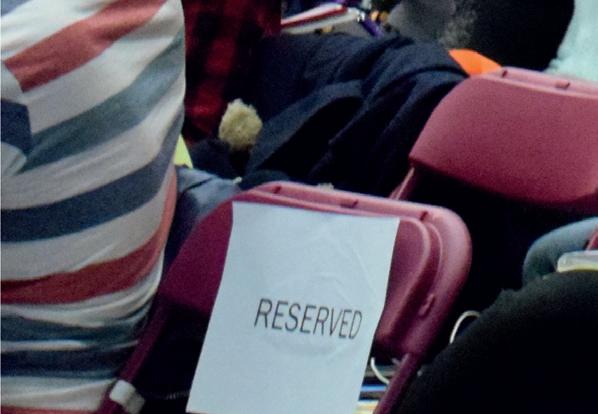
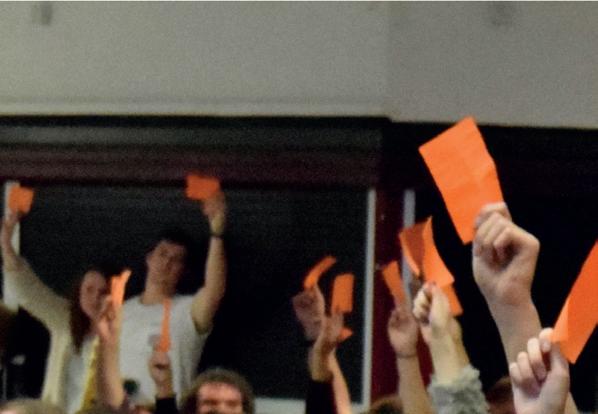
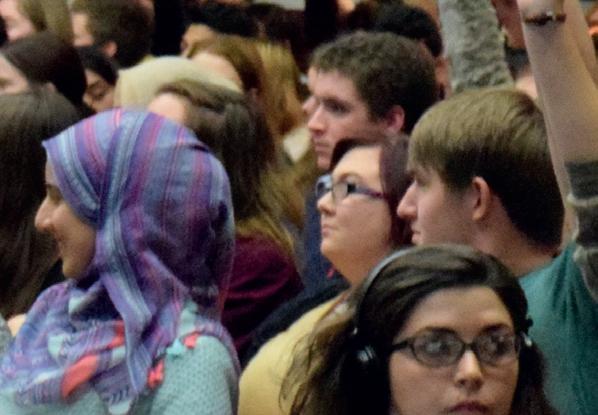
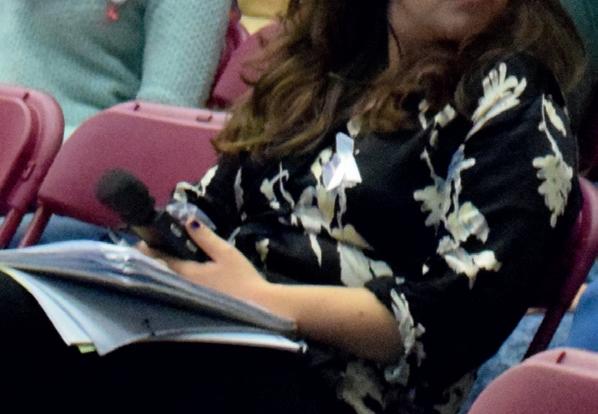
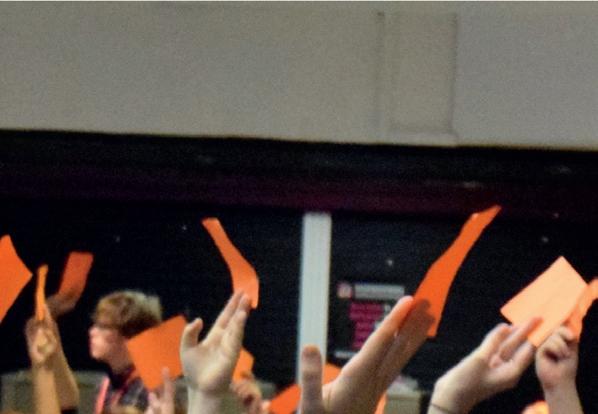
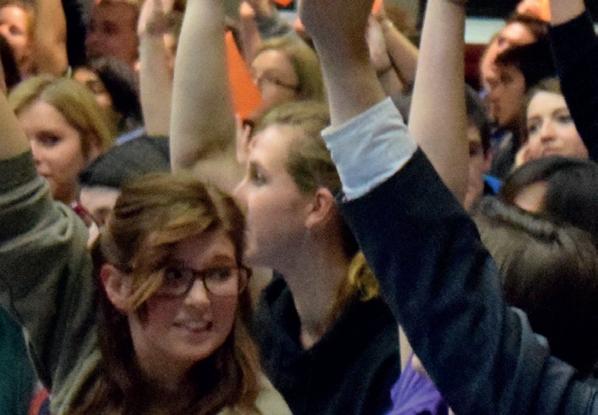
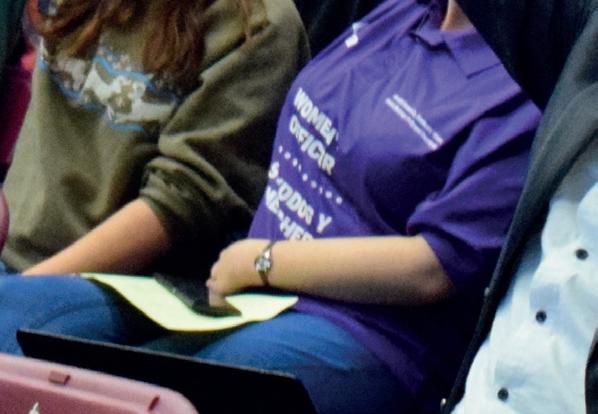
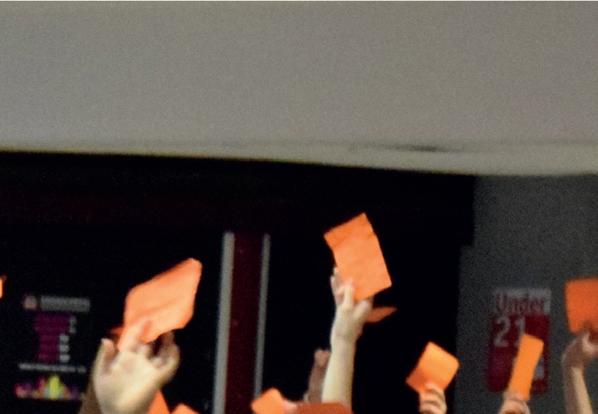
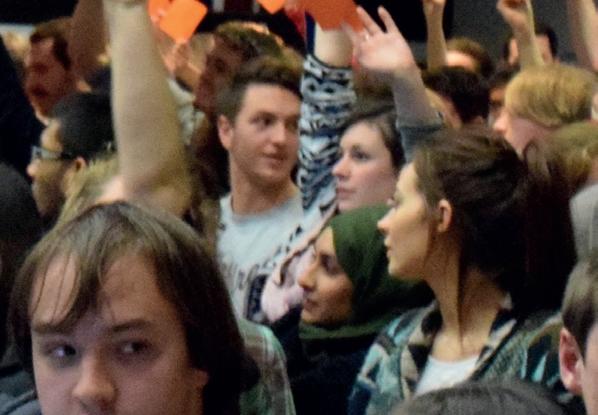
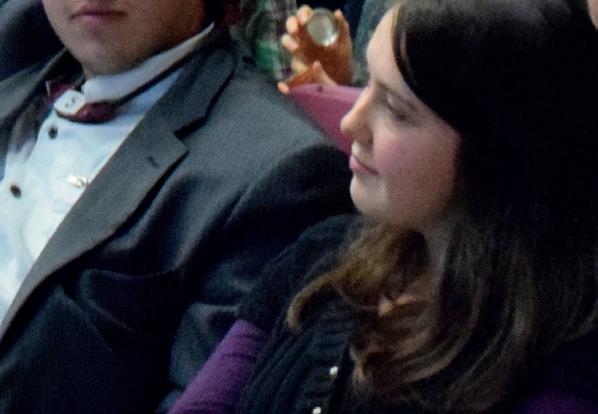
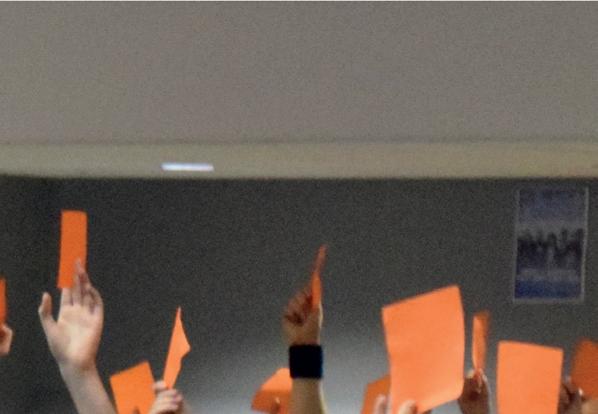
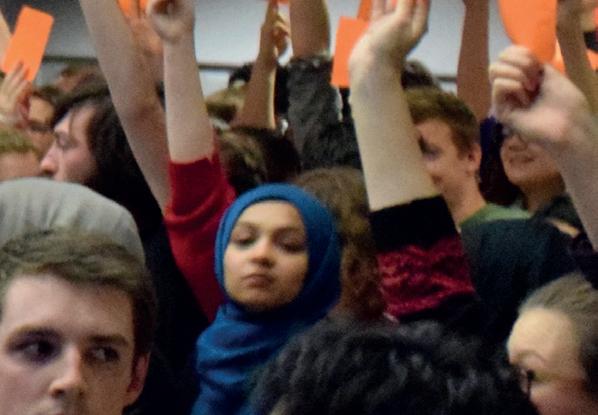
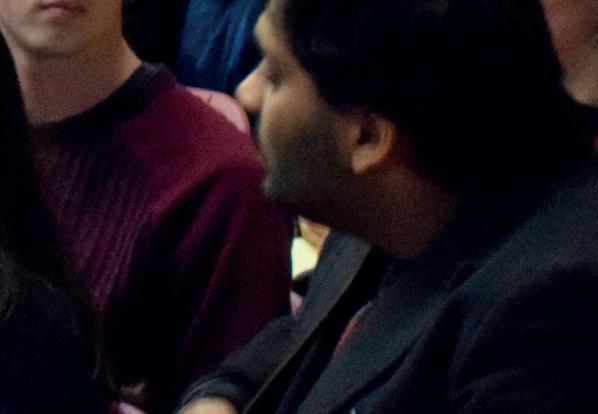

Cardiff University is a global institute.
It is part of our moral and ethical rights to speak out for justice
Omar Kamal“
Issues raised in opposition to the motion were similar to those raised at the AGM, including fears the motion would dismiss individual opinions and violate freedom of speech concerning the issue of abortion, as some felt the motion intended to silence certain groups within the University.
e Senate believed censoring a group of students because of their views was in direct contradiction to the spirit of the Students’ Union, and as a result the motion failed.
After the debate was drawn to a close the meeting moved on to the first of two motions submitted concerned with Palestine. e third motion up for discussion, proposed by Omar Kamal,
Greater Representation for LGBT+ Women in our Students’ Union
Deferred to Student Senate
Becoming a Pro-Choice Union Rejected Palestine University
Twinning Motion
Passed, clear majority
Recognise the State of Palestine
Passed, clear majority
Ban BAE Rejected
Improving Postgraduate Student Representation
Passed, clear majority
Student Media Restructure
Passed, clear majority
called for the Students’ Union to acknowledge the plight of the Palestinian people in a public statement of support ‘condemning the current inhumane situation in Gaza’.
It was noted that 30 nationals and 17 students with a Palestinian home address have been enrolled at Cardiff University in the last 10 years.
“Cardiff University is a global institute. It is part of our moral and ethical rights to speak out for justice”, Kamal said.
Kamal gave a strong argument for the motion, stating: “this motion does not have an agenda to isolate Israeli students. It is about giving respect and recognition to Palestinian students.”
No one stood to speak in opposition of the motion and it passed with a clear majority.
e second motion concerning Palestine to be passed by the AGM was submitted by Maryam Bham, and proposed that Cardiff University should twin with the Islamic University of Gaza.
As the largest university in Palestine, Bham suggested that the twinning would act as ‘an act of solidarity for the damage done to the institution’ following the three wars that the region has suffered from.
Bham explained that there are few alternative non-violent tools that would effectively overcome the issue. Twinning with the University of Gaza would provide the people of Palestine with both economic and social advantages.
Following a suggestion from the audience that other Palestinian universities would benefit more from being twinned with Cardiff University, Bham concluded that after incorporating students from other war-stricken universities, the University of Gaza would make most of the relationship.
e fifth motion of the evening, also proposed by Maryman Bham, condemned the Union’s relationship with
BAE Systems – the world’s third largest arms manufacturer.
e motion claimed that BAE Systems are ‘notorious for its corruption and sales to nations with extremely poor human rights records’. BAE Systems are currently allowed to recruit at events run by the University’s Careers Service, primarily at events such as the Business and Technology Spring careers fair.
In light of this, the motion called for the Union to campaign for Cardiff University to ‘adopt a comprehensive ethical investment policy’, and end all investment in the arms trade and publicly denounce careers fairs, which include arms manufacturers such as BAE Systems.
However, the motion was met with fierce opposition by the President of the Engineering Society, who argued that banning all companies involved in the arms industry would have “detrimental hidden consequences” to the Engineering course.
e motion would include a large number of companies, many of which provide a significant amount of equipment used within the department.
Fellow student, Chiara Alessandri, also argued against the motion, stating that “we have a right to choose where we want to work. It is not the role of the Union to provide leading information which could deter people from applying for future jobs.”
As a result of the backlash, the motion failed by a large majority.
e sixth motion was proposed, by current part time Postgraduate Officer, Ollie Wannell, in view of improving postgraduate representation at Cardiff University.
Wannell argued that the Students’ Union needs ‘to seriously re-engage with the 7,520 postgraduate student body’. He expressed the view that postgraduates are “under-represented” within the Union and that documents released have the tendency to focus

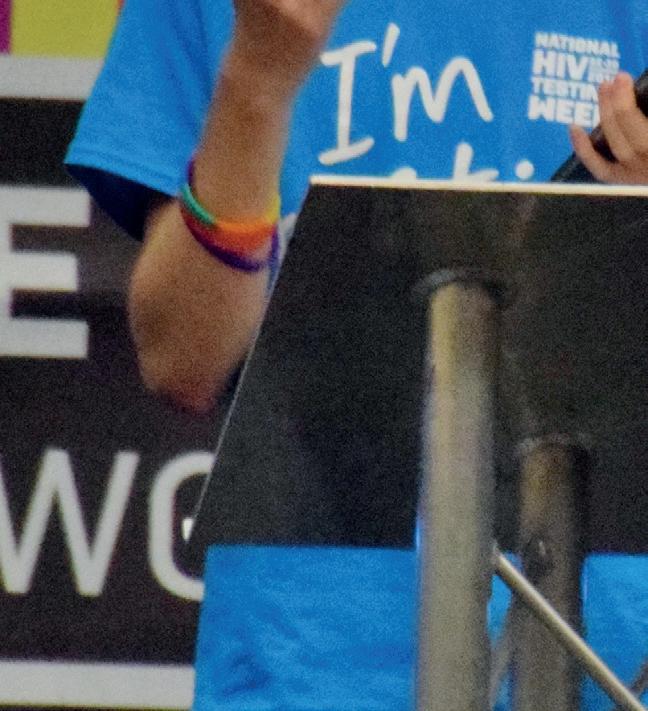
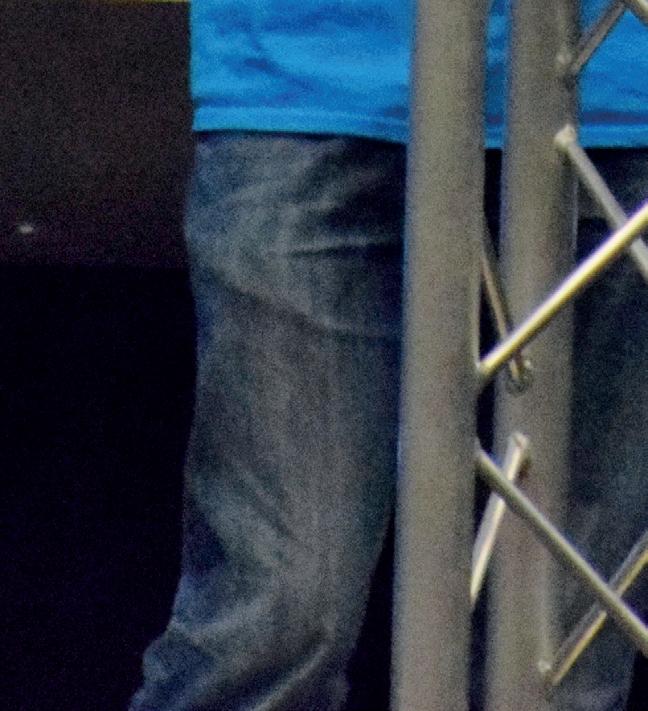


tweet us @gairrhyddnews
email us news@gairrhydd.com or visit us online at gairrhydd.com/news/
















solely on undergraduates.
To overcome the issue, it was proposed that a full time role of a Postgraduate Students Officer should be created, in order to ‘match the representation of undergraduate students’.
Approving the introduction of a new full time officer position could, as noted in the motion, be achieved either by adding the position to the current team of seven sabbatical officers or alternatively, by changing the current structure to create a VP Education & Welfare (Undergraduate) and VP Education & Welfare (Postgraduate).
e motion was opposed by the President of Sexual Health and Awareness Group (SHAG), who expressed concern about the financial implications of introducing another full time officer.
He explained: “whilst it is clear that more needs to be done to help improve representation of postgraduates, this can be achieved without the full cost of an full time officer.”
In spite of this criticism, the motion was supported by a significant number of students, including postgraduates who expressed their concern about a lack of integration within the Union. Research student, Emma Davies, said: “I feel alienated within the Student’s Union. Working on a research-based postgraduate, I find it is particularly difficult to engage with it.”
e seventh and final motion of the evening proposed a restructure of Cardiff Student Media – an issue of hot debate in recent weeks.
e motion, submitted by the current heads of each platform within Student Media, called to remove the position of VP Media & Marketing from the Elected Officer team and the Trustee Board as of the next academic year.
It was also proposed that ‘a comprehensive review of Student Media’ should be carried out, ‘led by its key volunteers’ and submitted for approval by the Students’ Union Board of Trus-


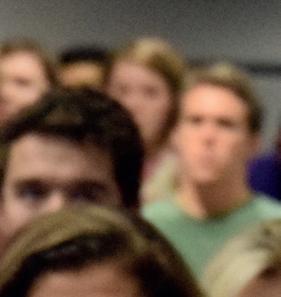
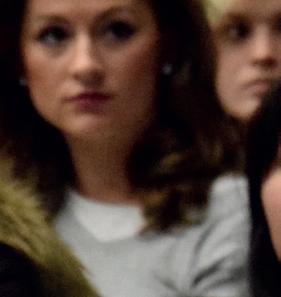
tees. Josh Edwards, Head of Broadcasting, was met which a vocal reception as he took to the stage to introduce the motion on behalf of the heads of Student Media.
Edwards noted the possibility of a conflict of interest caused by having an elected officer, sitting on a role on the Union Board of Trustees, as head of Student Media and subsequent Gair Rhydd Editor.
Criticising the nature of student elections, he went on to add that: “Student Media is the sum product of its 450 sincere and dedicated volunteers. It is not about dressing up for a week for elections and handing out sweets.”
A number raised questions about when the restructure would take place. In response to this, SU President, Elliot Howells, added that it was hoped a decision could be reached by Easter.
Concerns were also raised that the motion was too vague. Edwards stressed that restructuring Student Media as a whole is a lengthy process requiring great deliberation and this time was simply not available in the run up to the AGM given recent circumstances.
e motion passed with overwhelming majority and as a result a comprehensive review of the structure of student media will follow.
According to Gair Rhydd editor Michael O’Connell-Davidson, the process will now comprise of consulting both executive members of Student Media and contributors to see what they want before compiling a report.
is drew the meeting to a close –almost four hours after students took up their seats in the Great Hall.
It would appear the length of the event proved too much for some.
Chair, Cari Davies, was forced to make repeated announcements throughout the evening requesting that students refrain from leaving the meeting in order to avoid numbers falling below quorum.



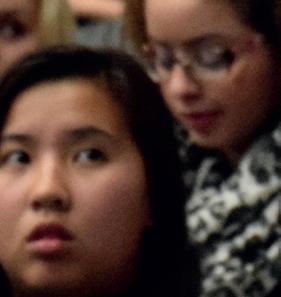
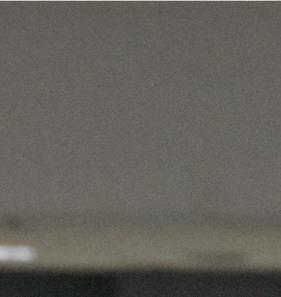
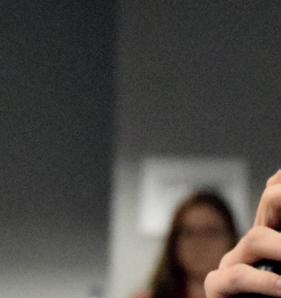
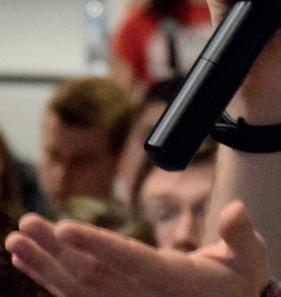
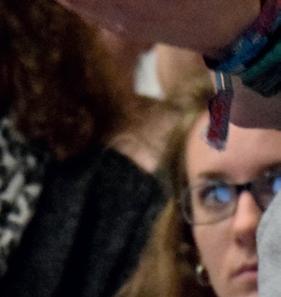



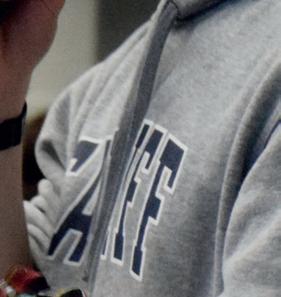
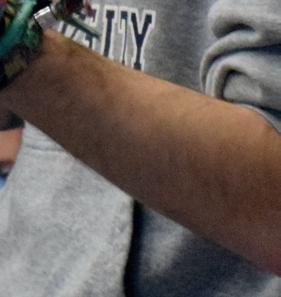
Whilst it is clear that more needs to be done to help improve representation of postgraduates, this can be achieved without the full cost of an full time officer
James Ledward, President of SHAG
“


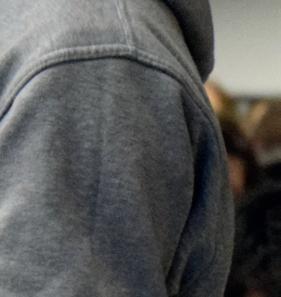
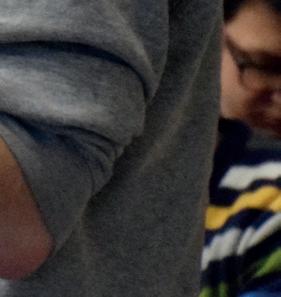




Continued from front page
e motion, which passed with a clear majority, called for an endorsement of the Fossil Free UK campaign, as well as quarterly updates on the University’s investments, a student presence on investment committees and future divestment from fossil fuels.
It is unclear as to whether the Students’ Union Board of Trustees will uphold the Senate’s decision. A Cardiff University spokesperson, speaking to Gair Rhydd, has stated that they “do not consider that university divestment from the fossil fuel industry is the solution.”
e revelations have sparked protest amongst students, with the Cardiff chapter of People and Planet (whose parent organisation is the originator of the Fossil Free campaign) scheduled to hold a number of events over the coming weeks in protest at the University’s controversial investment portfolio.
A Cardiff University spokesperson, speaking to Gair Rhydd, has stated that they “do not consider that university divestment from the fossil fuel industry is the solution.”
“People want their Students’ Union [and Universitiy] to be progressive and representative. We already do not invest in arms companies. e next stop is fossil fuel divestment,” said Cardiff student and campaigner Robert omas.
“Oil is running out, so it doesn’t make much monetary sense to still be investing in these companies either. We should look at investing in green technology, local firms and co-operatives, and more ethical businesses.”
e Fossil Free campaign is currently planning initiatives including the circulation of a petition amongst students and staff, workshops on divestment, and a landmark talk in Cardiff University’s Main Building on Wednesday evening.
e latter event will feature Julian Rosser of Stop Climate Chaos Cymru, and Friends of the Earth activist and author Jonathan Neale.
Despite the controversy emanating
from both the elected student body and third party campaign groups, Cardiff University has moved to defend its financial links with the petrochemical industry.
A Cardiff University spokesman told Gair Rhydd that the University “has robust systems in place to ensure any investments are appropriate and advance our purpose to be a worldleading university”.
“Like most world-leading universities, Cardiff University collaborates with a number of public and private sector companies on a wide range of leading research projects, including in
the fossil fuel sector.”
However, the spokesperson insisted that despite this, “the University is committed to sustainability at the highest level, in our research activity and in our actions as an organisation.”
e revelation that the institution has substantially invested in the fossil fuel industry undermines its environmental credentials. In the past, its image had been enhanced by a series of environmentally conscious initiatives. e University has been quick to publicise to environmentally friendly nature of its new buildings, with green architecture at the heart of the Univer-
sity’s regeneration project.
An environmental focus is also likely to be at the heart of the University’s planned ‘Innovation Centre’, a £300m project which is focused on solving many of society’s most pressing issues.
“It’s difficult to swallow the fact that whilst Cardiff University are preaching environmentally friendly policies in public, behind doors they’re in bed with oil and gas,” said second year student Tom.
“I think it’s something we have every right to be concerned about – especially as it’s happening with our tuition fees.”

Davie Whyte
Leading Welsh graduate scheme
GO Wales is to close on December 31st, the Higher Education Funding Council for Wales (HEFCW) have announced.
e scheme, which has helped more than 8,000 graduates gain employment since its inception in 2003, has ceased to receive funding from the European Union Social Fund.
During its 11-year lifespan, GO Wales worked with local employers to provide work placements lasting 6 to 10 weeks for students leaving university, with HEFCW figures suggesting a 65 per cent re-employment rate after a placement.
Additionally, the scheme provides a free-of-charge platform for Welsh employers to advertise vacancies to
graduates, and career advice for students.
ese services have helped numerous young people kick-start their careers in fields such as marketing, PR and media amongst others. But GO Wales’ end now leaves a hole to be filled when it comes to guidance for unemployed 20-somethings leaving university. Plans are underway to fill this hole, and a HEFCW statement has stated funding has been submitted for “a student programme and a graduate employability programme”. at funding is yet to be obtained, though, and the outcome will remain unknown until at least partway into 2015.
e closure also means as many
as 70 staff employed by the scheme could lose their jobs, according to Insider magazine, although some could transfer to other positions within their institutions.
is does not spell the end for all current employability support in Wales; the Welsh government’s flagship youth employment scheme, Jobs Growth Wales, has enjoyed moderate success, with 93 per cent of the 262 graduates involved with the scheme since April 2012 going on to secure full-time employment.
But this number pales in comparison to the number of placements organised by GO Wales, and for the time being, graduate employment opportunities in Wales have been dealt a significant blow.











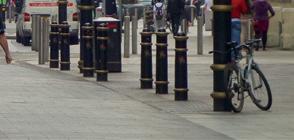
We have created a system whereby everybody feels they are getting a bad deal
“Alexander Norton
‘[SPARK campus] has provoked controversy as a result of the reported £300m cost of the wider project
tweet us @gairrhyddnews
email us news@gairrhydd.com
or visit us online at gairrhydd.com/news
Around three-quarters of students will be unable to repay their students loans, according to a new report released by the Higher Education Commission.
e report describes the current university funding system as unsustainable and blames the revisions made to the fees system by the current government for creating a funding ‘black hole’.
e report warns ‘We have created a system whereby everybody feels they are getting a bad deal’, adding, ‘ is is not sustainable.’
e release of the commission’s findings coincided with the recent student protest in London against tuition fees, which saw thousands of university students take to the capital’s streets calling for free higher education.
Welsh students may not directly feel the pinch, as Wales’ devolved government subsidises student fees in order to maintain the £3,000 annual fees. However, nonnative students attending Welsh universities are not eligible for the same funding. is disparity between fees across the UK feeds back into a funding ‘black hole’ that is putting institutions at financial risk.
Introduced in 2012, the aim of the £9000 tuition fees was to make the university and higher education system more reliant on the taxpayer, however those responsible for making the report have said that the
changes are causing the Government in Westminster to indirectly subsidise higher education by wiping off the majority of student debts.
e report estimates that the average student will be landed with a debt of £44,015. e main point of contention surrounds what the report describes as the ‘middle earners’, such as health professionals, teachers and public sector workers, who are the least likely to be able to pay off such a large amount of debt.
e report shared deep concerns surrounding the repayment system, declaring: ‘We are deeply concerned that the Government may have created a loan repayment system where, for example, a teacher is unable to secure a mortgage at age 35 because of the high level of monthly loan repayment.’
e impact of the ‘black hole’ could cause certain institutions to fail, and a drop in confidence in UK HE could be seen to affect even prestigious universities, which would have serious implications for the future of the HE system.
JOMEC postgraduate student, Dominic Booth, echoed sentiments expressed by the commission, commenting: “I think the fees need to be lowered so the loans will be repaid - ultimately the government will lose money if people can’t pay back their loans”, adding that “the current situation is ridiculous.”
e NUS’ Vice President for Higher Education, Megan Dunn,
spoke to the Independent, remarking: “Forcing debt onto students as a way of funding universities is an experiment that has failed not just students but our country.”
Recommendations made by the commission includes allowing
international students to work in the UK for two years after graduating, improving strategies for recouping debts from students living abroad and a development of an overall better higher education funding model.
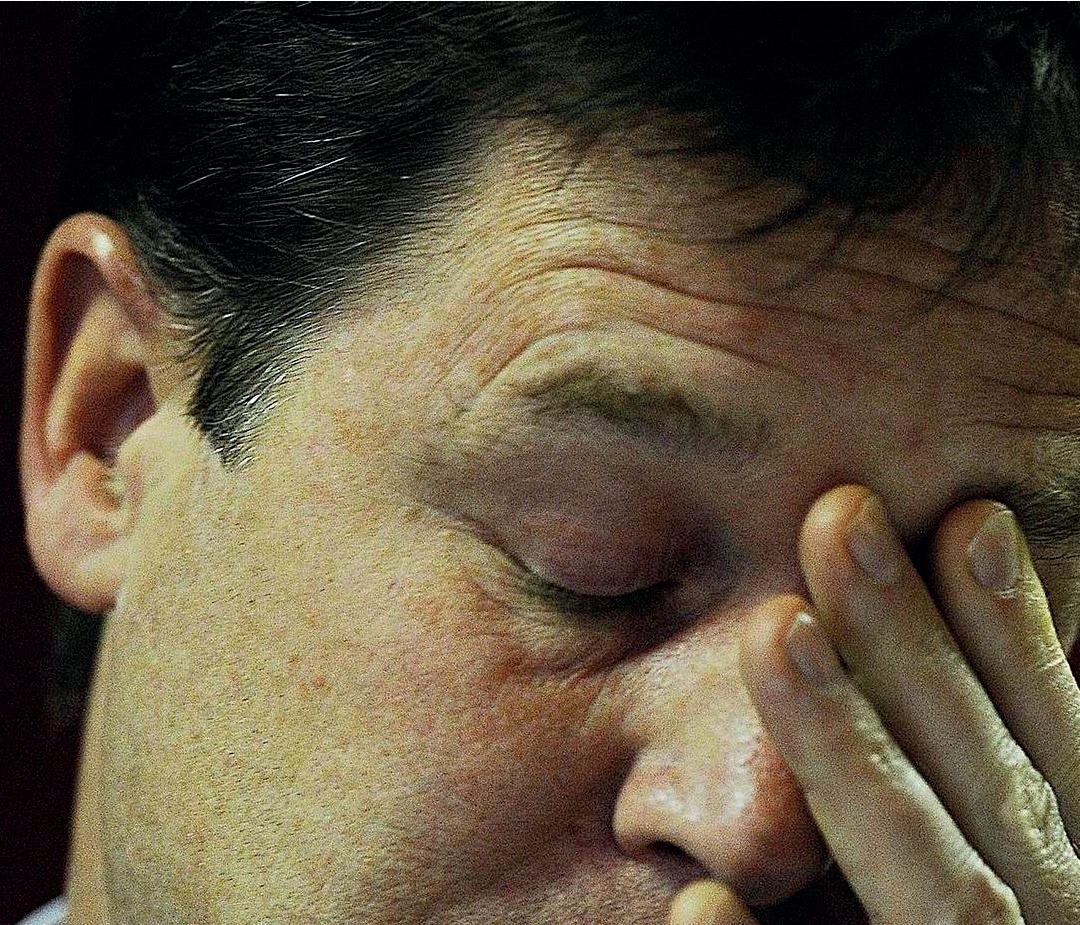
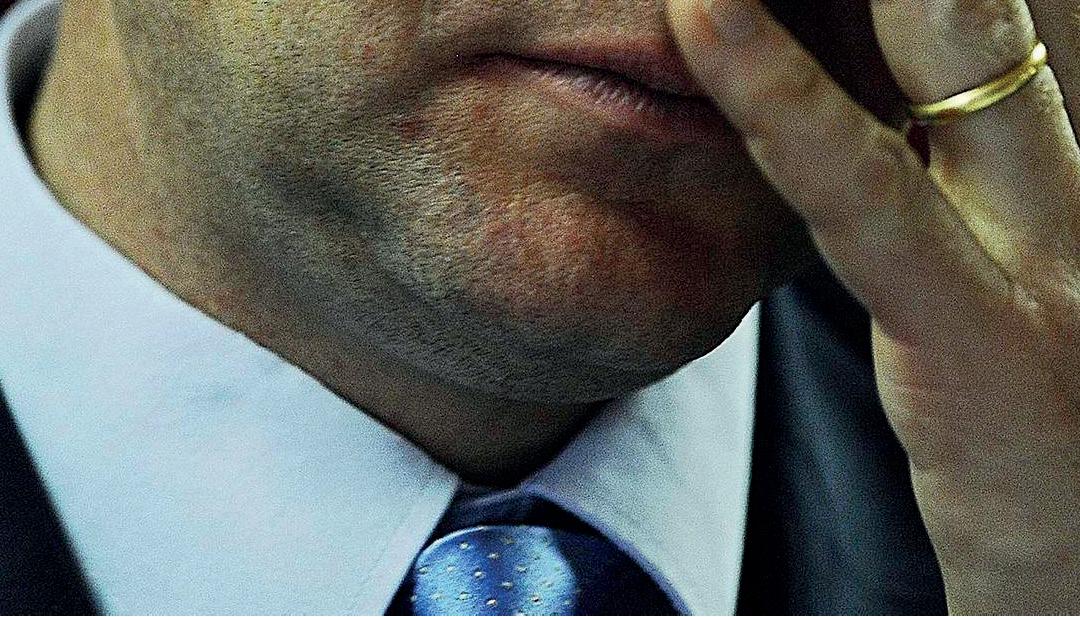

Cardiff University is committed to leading the search for solutions to the global social problems, according to University’s Dean of Research, Innovation and Enterprise.
Professor Rick Delbridge was speaking at a meeting of research universities in Leiden, the Netherlands, which he attended as part of a delegation from the Russell Group.
e mammoth investment in the Social Science Research Park (SPARK), construction of which has now begun in Cathays, is set to be a catalyst for the institution’s standing in the discipline.
e first-of-its-kind development, which is a key component of a wider ‘innovation campus’, has provoked controversy as a result of the reported £300m cost of the wider project.
“I think that this shows we have to question the size of the University’s financial surplus, and how justifiable it is to continue charging top rate interest fees,” Steffan, a third year student, told Gair Rhydd.
However, the institution insists that the development is a worthy investment, particularly in terms of producing
internationally recognised research and subsequent solutions to relevant issues.
“ e social sciences are vital to help us understand how society can function more effectively in an increasingly interdependent world,” Delbridge said.
He added: “ e Leiden Declaration is clear that the type of work we are proposing is essential to address the fundamental problems facing the world.”
Social sciences covers a wide range of subjects, many of which the University ranks highly in both nationally and internationally – such as journalism, psychology and sociology.
However, the bold nature of the university’s intentions has drawn some ire from students.
“Even though it’s a Russell Group university, you don’t really think of Cardiff as producing solutions to real problems – it’s difficult to think of any examples of them doing so,” an anonymous student commented.
It remains to be seen whether that perception changes with the opening of the new campus, which is projected to open in 2017.


At the time, the [Griff Rhys Jones] incident was labelled “grossly embarrassing” by University Court member Professor Brian Ford “ “ 53 per cent reported reasons such as ‘inconsistent teaching quality’
Additionally, only one in four believe that attending seminars is actually useful
The consumer watchdog
Which? has revealed in a recent report that students feel they are not being adequately challenged at university.
According to an article written by e Independent, out of the 4,500 students asked, less than 50 per cent of undergraduates felt that their course was demanding. Only one in four believed that seminars were useful to attend and less than half thought they could achieve decent marks without much independent study.
When graduates were asked about their experiences of university, 18 per cent thought that their degree programme was not worth the fees paid. 53 per cent reported reasons such as ‘inconsistent teaching quality’ and ‘a lack of job-seeking support’. 47 per cent felt that they didn’t receive enough hours of tuition and 45 per cent reported that they had experienced too many lecture
cancellations or ‘poor timetabling’.
When second year Cardiff students were asked about their views, many stated that they felt challenged by their degrees. ‘I wouldn’t say that first year was particularly challenging, but I know that’s because we all need to be on the same page to further our learning in the two years that count.
I’m definitely finding second year a lot more challenging in terms of course content and pace.
‘I do feel that the support is there if you need it but in degrees like English, the independent learning element is really important for personal progression,’ said one English literature student. ere is an ongoing debate over whether humanities and science students should pay the same tuition fees per year due to significant differences in amount of time spent in lectures. When the students were asked about this, there were mixed feelings. One medic student believed
that her degree was ‘undoubtedly good value for money as medics are in university for most of the week and have access to many useful resources’.
Some humanities students agreed that they should pay less than science
students due to less contact hours. However some disagreed, feeling that lowering the tuition fees for humanities students would devalue their degrees. ‘We work just as hard as science students; it’s just a different way of learning.’

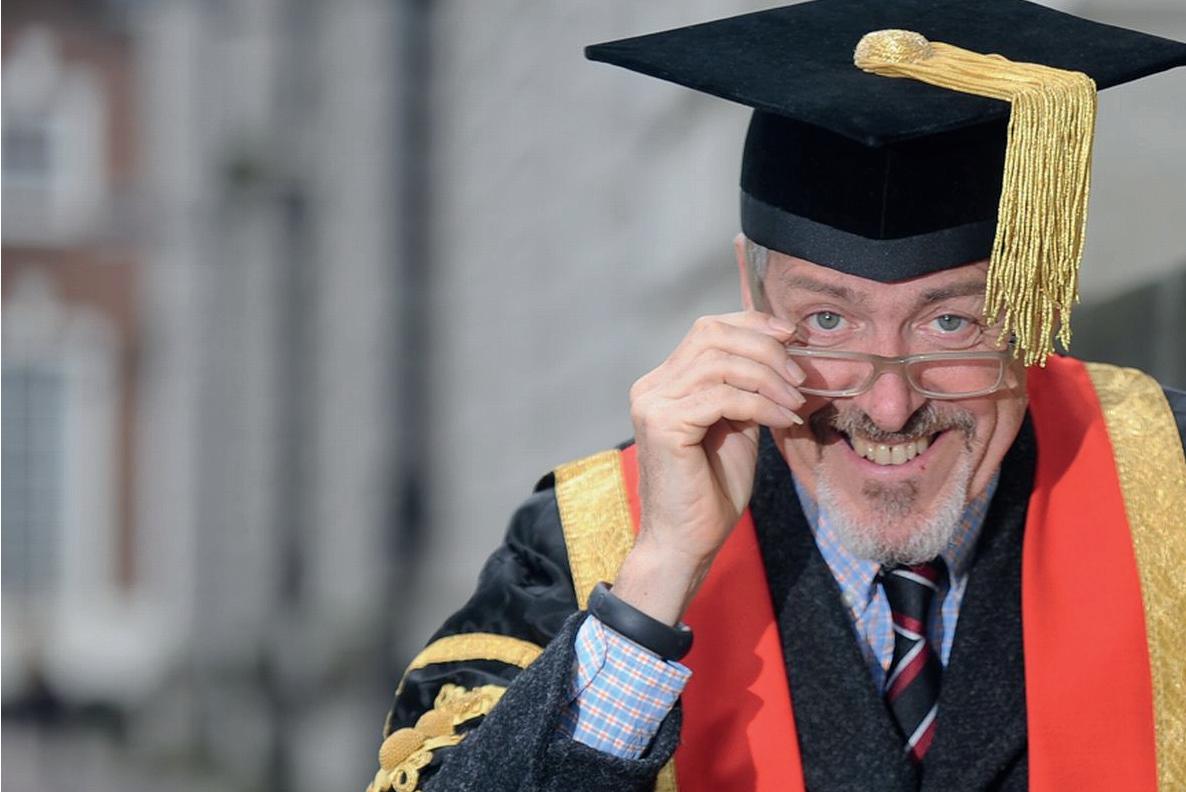
Cardiff University has refuted claims that it is looking to abolish its Court in the wake of the failed appointment of comedian Griff Rhys-Jones as Chancellor, despite the launch of a consultation.
As one of the bodies responsible for dictating Cardiff University policy, the Court came under heavy scrutiny following the last minute cancellation of Rhys-Jones’ appointment in April.
e University Court is responsible for appointing the Chancellor, Vice-Chancellor, the Council and the Court itself, as well as assisting the University Council in governing the institution.
However, its role in this April’s
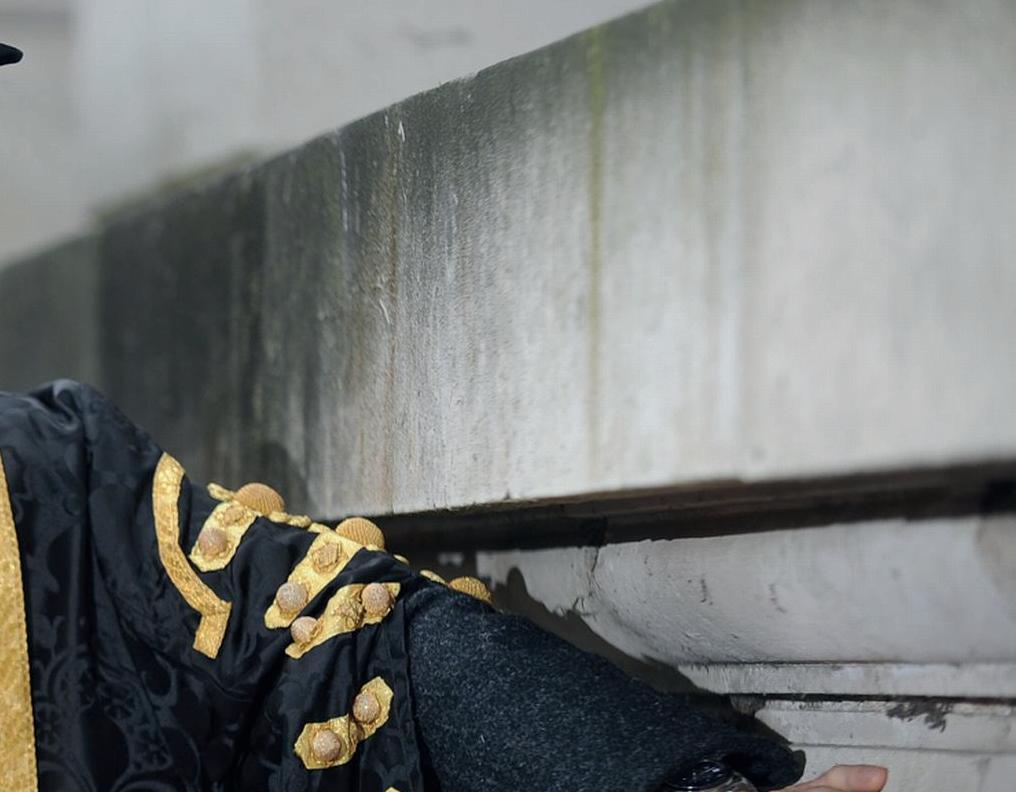
attempt to appoint Welsh entertainer Rhys-Jones, 61, to succeed Nobel Prize winning scientist Sir Martin Lewis as the ceremonial head of Cardiff University was a cause of public humiliation.
When it was discovered that Lewis had not been offered the opportunity to retain the role, the University Court blocked RhysJones’ appointment.
e u-turn came just an hour before the Cardiff-born comedian’s investiture, and he later withdrew his candidacy for the role despite already having been pictured in ceremonial dress around the Cathays campus.
At the time, the incident was labelled “grossly embarrassing” by University Court member Professor
He subsequently suggested whether the Court had been undermined to the extent that its very existence was in question –and according to ‘ e Times’, the University has now launched a consultation on the subject.
e question posed is: “Given that council is the governing body of the University, is there a continuing role for the court?”
It also poses questions over whether the Chancellor of the University should be eligible for a second term. A University spokesman indicated that there would be further consultation on the subject before any firm decision could be taken.
Hit-and-run victim urges witnesses to come forward
A75 year-old man injured in a hitand-run incident outside the Students’ Union on Park Place is urging witnesses to come forward and identify the driver who fled the scene.
Around 5.45am, Saturday November 22nd, the victim’s car was involved in a collision and the victim taken to the Heath Hospital where he was later discharged with whiplash and trauma to his arm.
e victim, a partially disabled man who is reliant on a car for transport, was accompanied by his son in the car at the time of the reported incident.
Police were called to the scene but were unable to obtain sufficient information to identify the driver of the other vehicle. e victim has been in touch with the Students’ Union in the hope that students who witnessed the collision will come forward to help identify the driver of the other car.
Concerned about his insurance claim, the victim suspects he will be unable to cover the costs of insurance premiums and a new car, which he will be forced to pay for, unless a witness comes forward to corroborate his account of the incident for his insurance provider and deny any wrong-doing on his part that led to the collision.
Anyone with information in relation to the incident is encouraged to contact the local authorities or the gair rhydd news desk at news@ gairrhydd.com
The victim, a partially disabled man who is reliant on a car for transport, was accompanied by his son in the car at the time of the reported incident.
TLast year an average of 70% of students were in full-time employment 6 months after graduating
Kirsty FardellWelcome to our new Advice section, where we bring you tips for surviving Cardiff university life email us: advice@gairrhydd.com
he Higher Education Careers Service Unit (HECSU) conducts a large study every year to find out what happens to graduates. Last year they found a drop in the number of unemployed students six months after graduating, with 7.3 per cent being unemployed compared to 8.5 per cent the previous year. Across all subjects, an average of 70 per cent were in fulltime employment after 6 months. However, as hopeful as these figures look, a lot of those are made up of people working in retail, catering, waiting and bar staff rather than something relevant to their degree. So if you don’t want to be one of those figures it is best to start looking ahead to graduation now and working on finding yourself in a job you have worked for. Also, a
lot of companies application processes for graduate jobs close between now and Christmas, so starting one now will ensure you don’t miss out on your dream job.
ere are a range of options after graduating. You could be desperate to go into full-time employment and start earning money, or maybe you want to further your studies and complete a Masters or postgraduate course. Either way, now is the time to start applying. If you want to start looking for a job you firstly need to decide on the location. en you should start searching the area for possible organisations that offer graduate jobs. Take the time to fill out their application forms – the interview is where you can really shine but applications are the only way to get
your foot in the door, unless you know someone. It is worth reaching out to that distant family member or friend of your mum’s if they’re working somewhere you want to work at. Just put the word out that you’re looking for something in marketing, or engineering, or whatever it may be – they may be able to put in a word for you that doesn’t really cause them much effort. So you have nothing to lose, if you don’t ask, you don’t get.
Perhaps you’re not ready to go into the world of work just yet, and just want to refine your subject by doing a Masters. ere are a few different types of Masters that vary in duration. e standard MA or MSc are completed within one year full-time and include a dissertation, or two to three years part-
time. A postgraduate diploma (PgDip) is the same as a Masters but only takes nine months, as it doesn’t include a dissertation. A postgraduate certificate (PgCert) can be done in six to nine months and less extensive as a PgDip. e cost of a Masters varies, and could be anything from £5,000 to £1,500 depending on the course and duration. ere is funding and bursaries you can apply for to cut down the cost, so don’t be put off by the hefty fee.
Whatever you decide to do after your undergraduate days, be sure to look around and keep your options open. ere is something for everyone as long as you keep persevering and don’t count on one application to get you a job – stick at it, shop around and get what you want.
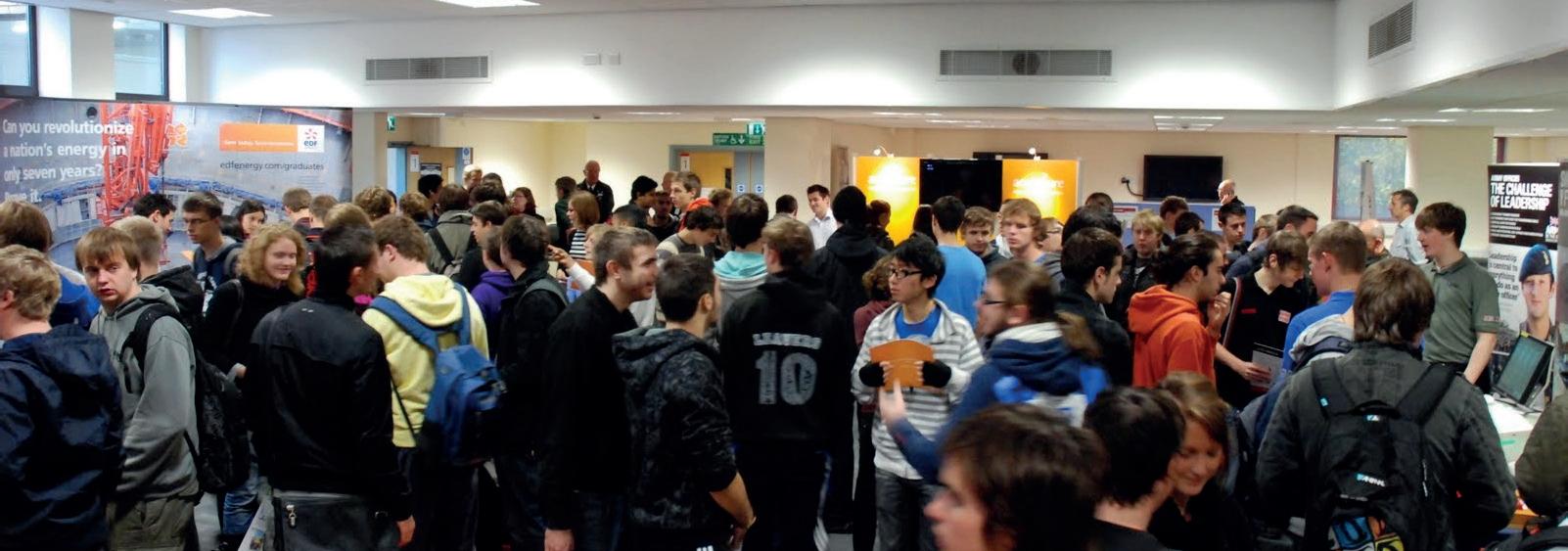

What do you think? Have your say: advice@ gairrhydd. com
Your curriculum vitae is an important part of your job search. ey act as the window into your educated soul for employers, so they need to be squeaky clean but unmissable.
Always start with your personal information – name, address, email and contact number. It may be worth having two CV’s if you’re applying to jobs in two locations –perhaps your hometown and your uni town, and put the appropriate address on each one. Make it clear who they are getting to know, and that you’re local. en proceed with a run down of your academic achievements. Start with
your most recent qualifications, include your university and degree title with your overall result for any years you have completed. is gives them an idea of what you’re expected to obtain. en list your A levels or equivalent with the name of your sixth form followed by your highest grade and subject to your lowest. Include your GCSEs, stating each result that may be relevant for some jobs. Just making clear you achieved so many from A*-C can be enough, but always state that they include Maths and English. Most employers expect you to have at least a C in both of these, so make sure to make it clear.


















Continued from the previous page >>>
e next section should be an explanation of your previous employment. Key experience should always come first, so depending on what kind of job you’re hoping to get, order them accordingly. For example, if you’re applying to a graduate job for which you have relevant experience, put this first. If the job is a part-time retail job then put your customer facing experience first.
Always show how you are suitable for the vacancy straight away – that way everything else will look like more reasons to hire you. So, perhaps include two headings such as ‘Key Experience’ and ‘Other Experience’ so that you have all your employment listed. Give rough dates of employment and give a brief short paragraph of
Always show how you are suitable for the vacancy straight away – that way everything else will look like more reasons to hire you
Cardiff Council have created the website ‘Cardiff Digs’ specifically designed for student housing
what your work entailed. e inclusion of dates will show that you weren’t just hopping from job to job to find the most laid back position, you were committed to doing well at one job.
For shop-style jobs always highlight that you have previously worked on tills handling money and give typical examples of things that you presume you will have to do for their vacancy that you have done before. is way they will know that your experience is relevant and you have the social skills required for a customer-facing environment.
Remember you are selling yourself, so think about presentation just as you will if you get an interview. Make it look smart, clear and easy to read
and show your proficiency with computing as well as language. In brief, big yourself up but don’t exceed two pages.you’re applying to a graduate job for which you have relevant experience, put this first. If the job is a part-time retail job then put your customer-facing experience first.
Always show how you are suitable for the vacancy straight away – that way everything else will look like more reasons to hire you. So, perhaps include two headings such as ‘Key Experience’ and ‘Other Experience’ so that you have all your employment listed.
Give rough dates of employment and give a brief short paragraph of what your work entailed. e inclusion of dates will show that you weren’t just hopping from job to job to find the
most laid back position, you were committed to doing well at one job.
For shop-style jobs always highlight that you have previously worked on tills handling money and give typical examples of things that you presume you will have to do for their vacancy that you have done before. is way they will know that your experience is relevant and you have the social skills required for a customer-facing environment, as opposed to being an unknown quantity.
Remember that you are selling yourself, so think about presentation just as you will if you get an interview. Make it look smart, clear and easy to read and show your proficiency in computing as well as language. Be brief; big yourself up, but don’t exceed two pages.

Cardiff Council have some advice that will help
It is no secret that letting agencies in Cathays are mostly appalling.
Last week’s issue included the results of an investigation into housing with the results of a questionnaire published, which included endless complaints about student houses not being what they should be. It’s clear that the agencies stereotype our student status and assume we will be too lazy to do anything drastic about the problems or won’t really know what is not an acceptable living standard –but there are steps you can take. Everyone has a story about how they flagged up issues in their property to their letting agency and received little to no help, which is something our housing investigation has shown as a common issue. Cardiff Council have created a website called ‘Cardiff Digs’ that is specifically designed for student housing and living advice. It provides detailed information about what your landlord’s responsibilities and your rights are within a property and how to go about fi xing certain issues. It also provides information on acceptable reasons for losing some of your deposit, so you can be clear if
you’re being ripped off.
For students currently looking for housing for next year there is a specific checklist that you should take a look at before signing a contract to make sure you’re not going to be at a disadvantage. e ‘Avoiding the Pitfalls’ campaign is a great way to understand student housing from viewings to deposits so that you are well prepared.
e Council also advises to check whether the letting agency are a regulated agency registered with ‘ARLA’ or ‘RICS’ which will ensure that they have proper complaints procedures, codes of practice and insurances. Ask around and find out who your friends have rented with and what they thought of their letting agents. Last week’s issue did rank twelve agencies according to how they responded to their tenants from the questionnaire results, so that too will work as a good indication of the service you might receive.
Cardiff Digs also gives you information on when it is appropriate to go beyond your landlord for housing problems. For example you may have
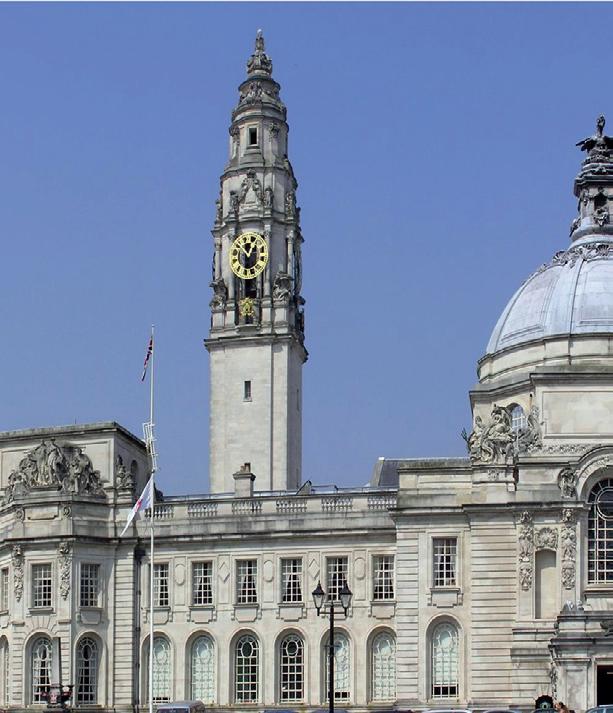
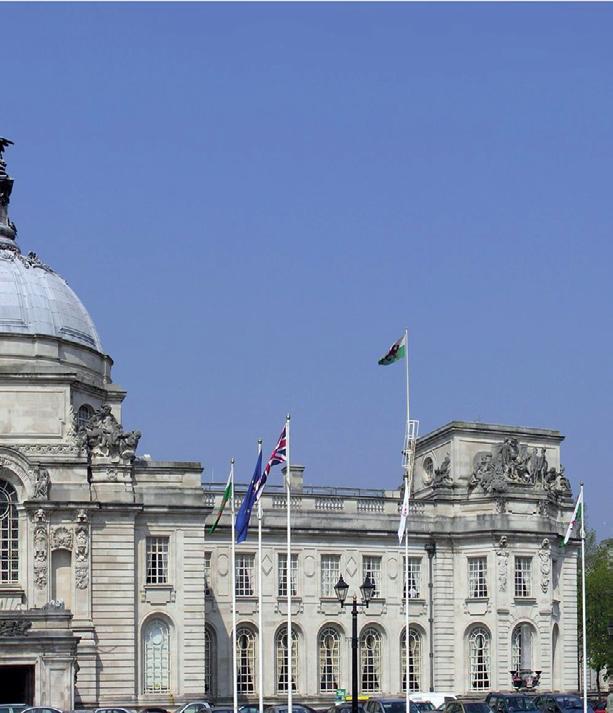
a chronic problem with noisy neighbours that is interrupting your studies that it may be suitable to inform the Noise Enforcement Officers about, or a persistent pest problem could be resolved by the council pest control. Most importantly, if you try to reach out to your landlord hoping they will resolve your issues and receive no response, then you should contact housing enforcement by emailing privatesectorhousing@ cardiff.gov.uk or ringing them on 02920871762.
So don’t put up with irresponsible landlords. Visit www.cardiffdigs. co.uk to find out exactly what you can do to improve your housing.









Surely universities putting extra security measures in place to prevent radicalisation isn’t such a bad thing?

Should universities do more to tackle the risk of home-grown terrorists at their institutions?
Iwant to make something clear, I don’t believe that terrorists are an overwhelming threat to universities. I’m not influenced by the moral panic the media have induced on the British public - who try and claim that there is a terrorist hidden round every corner. What I’m more concerned with are the practical precautions that universities should implement to tackle the risk of home grown terrorism and radicalisation of young individuals.
Such cases are pretty rare, but they have happened. It wouldn’t be ridiculous to have some sort of policy that attempts to prevent this occuring. Teresa May last week advocated a new counter-terrorism bill to be enforced - something that should be reflected throughout unversities.
I’m not saying that you’re suddenly going to see armed police patrolling campuses across the country, demanding strip searches from any student acting slightly suspicious. But surely universities putting extra safety precuations in place to prevent radicalisation isn’t such a bad thing? The chances of radicalising happening are obviously very slim - but if any students were worried about the threat of terrorism, it would be much more of a reassurance than not being at a university without any policy in place.
Screening processes for guest lecturers for instance - if they are considered to be a threat in the potential radicalisation of students they shouldn’t be allowed to have a
platform. This isn’t a restriction on free speech but an action to reduce the risk - and something Cardiff Students’ Union has faced before.
Adding more safety measures would simply assure that such bookings definitely will not occur and will bring up a red flag early on.
For prospective students - no, this won’t result in fear mongering that will make individuals scared to come to Cardiff or any other British university. The UK this year has set its terrorist level to ‘High Alert’, has that deterred people from entering the country or living here? Has it created a country where we all live in utmost fear?
The answer is obviously no, again. Complacency should be never be an option (despite how fearful that sounds). It’s common sense that if we have the resources, there should be an effort to give students the best security on offer by universities. Lets say Cardiff University did put more meausures in place to tackle terrorism. The reality is there wouldn’t be a significant apparent difference. If we’re honest, most students would probably not even know that there had been heightened security added to their institutions. It would cause minimal disruptions in the daily lives of students, but add the knowledge that there is something in place to deal with the issue of radicalisation that could potentially occur on campus. And that doesn’t seem like too much of a disaster to me.
The news that Nasser Mothana was reported to have joined ISIS in Syria disturbed life for students at university and caused a media frenzy. The story has faded but measures to counter radicalisation could only make the ideology of terrorism more pronounced and provoke acrimony within religious groups at the University.
The UK hosts large numbers of international students who look into the profile of a university before starting their graduate programs. Propagation of policies to counter terrorism would lead these students to believe that universities are prone to such evils and portray an atmosphere of suspicion.
In the worst scenario, these international students might get discouraged to take up degree courses in the UK. Terrorist groups around the world have been divulged by the media which has spread ample awareness about them. The University should focus on quality education, increasing employability for students and providing a healthy campus life - not terrorism. Focusing on radicalisation and terrorism would deviate the universities from its mission itself.
Compliance to the new antiterrorism bill introduced by Teresa May would mean that a substantial amount of time and finances will be spent on initiatives to address radicalisation. Resources could be
spent instead on productive tasks within the campus. Radicalisation is a concept of the mind and transcends normal life. On-campus action about this would only permeate the idea of terrorism more vividly to students. Universities are not places to resolve international political problems.
It is an onus upon the government to tackle issues relating to terrorism, universities are not the harbingers of such moves. Life at uni should not be compelled to infiltrate such issues. Students don’t want it. In fact a lot of them would simply roll their eyes at such a suggestion. It is a common response to uninteresting and unnecessary campaigns that run in the campus.
A congenial student life and agendas of militant groups or terrorism cannot coexist. Irrespective of whether it is the recent upheaval of ISIS or a number of militant groups that have been functional for the past years, graduates exhibit heterogeneity of thought. While some of them turn a blind eye to it, others feels uncomfortable to discuss such matters. It could unintentionally hurt sentiments or instigate heated debates. The government is keen to take steps to ensure extremists don’t preach on campus and could lead to large numbers of people being barred from public address within universities when their motives are clean. Doesn’t freedom of speech matter?
The University should focus on quality education, increasing employability for students provising a healthy employability
It’s essential to remember that simply saying one side emerged ‘victorious’ over the other is incorrect
tweet us @gairrhyddop email us comment@gairrhydd.com or visit us online at gairrhydd.com/opinion

What do you think? Have your say: letters@ gairrhydd.com
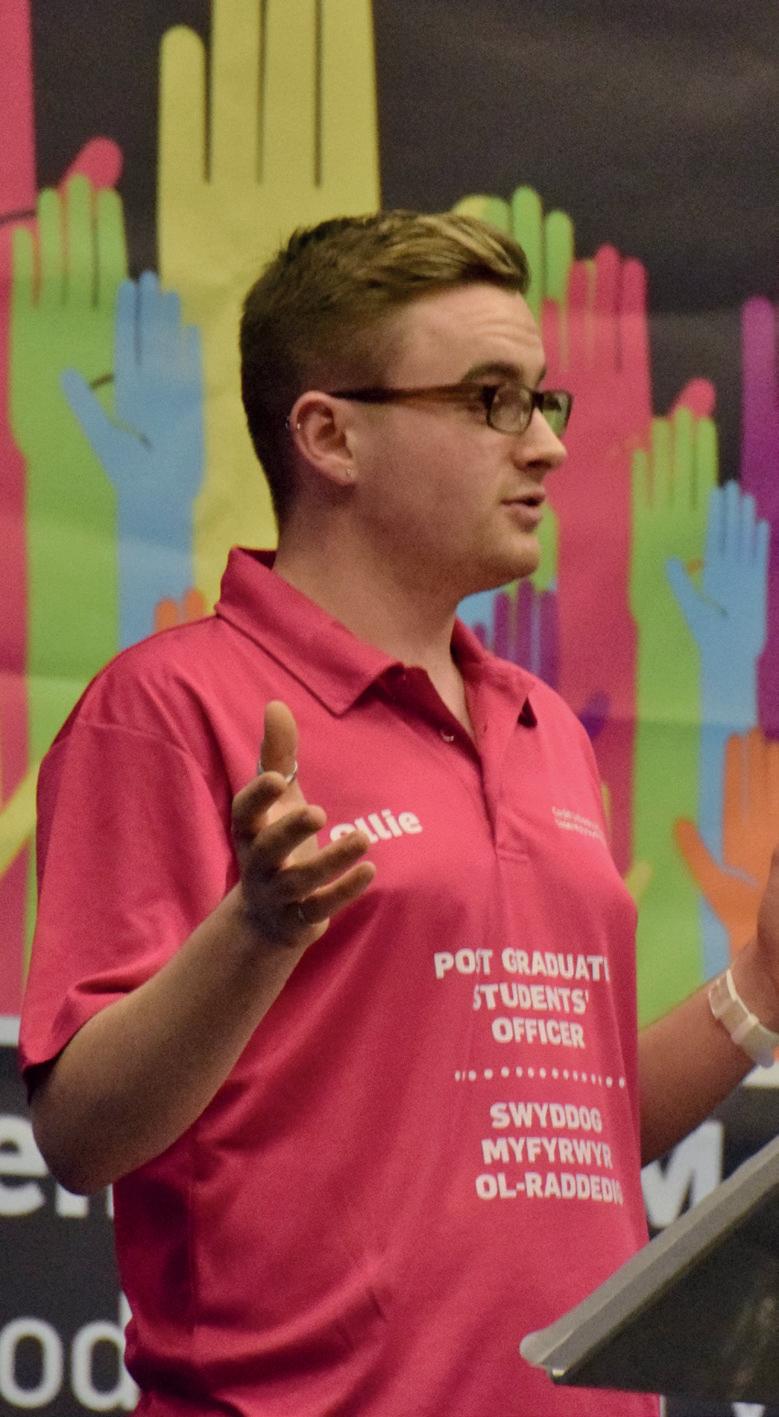
The AGM is over. After over three hours of discussing seven motions, Cardiff Students’ Union has a new sabbatical officer restructure for 2015/16, given public support to Palestine and called for further discussion on LGBT+ representation. But those seem somewhat overshadowed by motion two - making the Union pro-choice. After an extremely heated debate, which heard countless people speak, the AGM resolved to reject the motion and keep the SU neutral. But what does this decision now mean for the Union, its students and the groups both opposing and supporting the motion?
It doesn’t seem appropriate for Gair Rhydd to take a stance on the motion - enough discussion has taken place on it. What is appropriate is to reflect on the evening and see how it has affected the future for the groups involved. And it was a topic that brought about a divide that resembled something of a Mexican Standoff.
Individuals who identified as members of the Women’s Association and LGBT+ Group proposed the motion and argued strongly that it was the SU’s responsibilty to
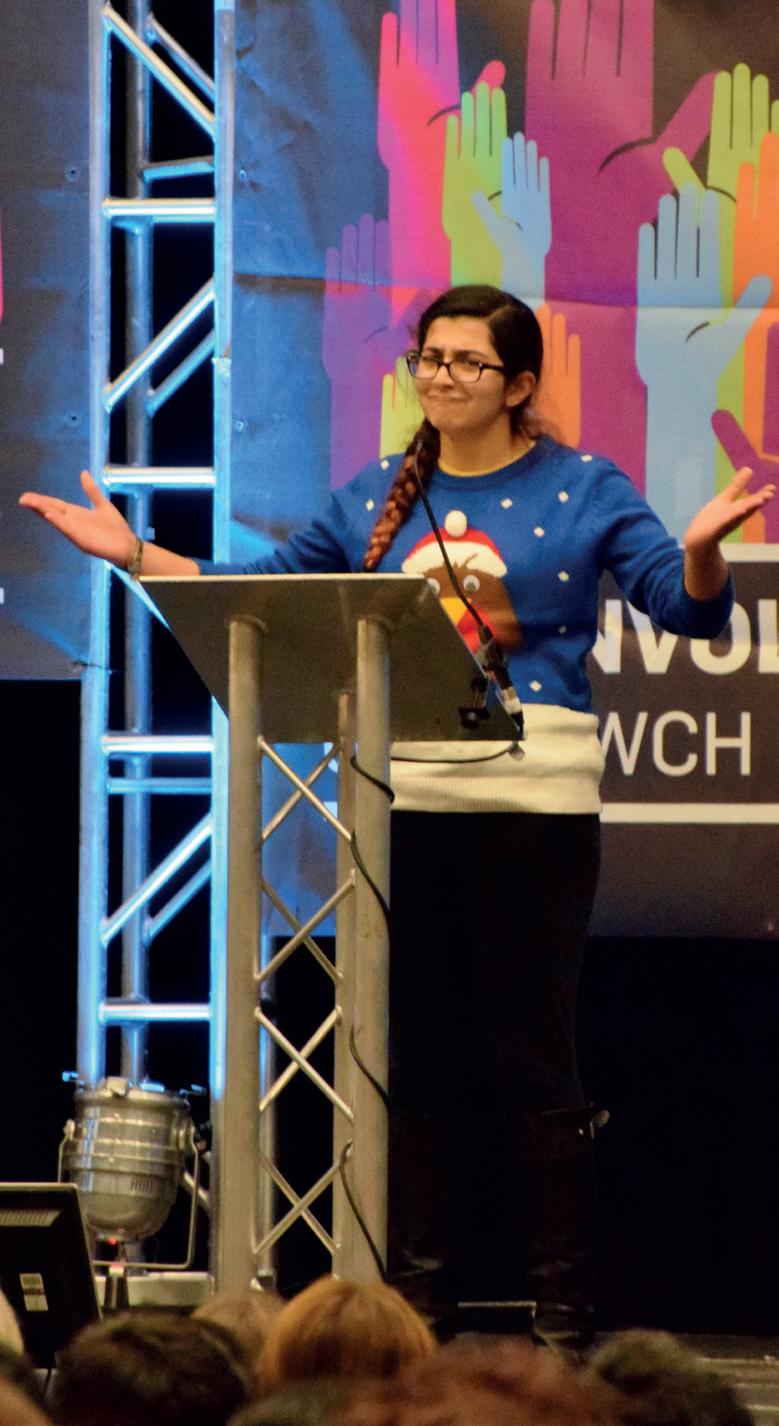
provide services to vulnerable women. CathSoc, Islamic Society and the Atheist Society were the most prominent opposing partiescontesting their freedom of speech and representation was threatened. Whilst a compromise was on the agenda for some motions, this was definitely not one of them. You see what the issue was here was that both sides had too conflicting views for them both to reach a decision that satisfied all people. With the AGM over, the limelight now needs to switch on to what course of action the Women’s Association will take next. Laura Carter, the Women’s Officer, reviewed the evening stating her disappointment but emphasising the importance of “planning and creating a pro-choice campaign with the Cardiff Women’s Association and Cardiff University next semester. We need to actually clarify to students what being pro-choice means and why it is so important for women students”. And she is right. e role of the Women’s Association is to promote women’s issues and this AGM should not mean the destabilising of the group.
CathSoc and Students For Life meanwhile were two of the most


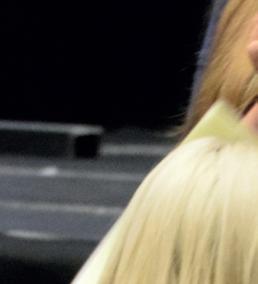
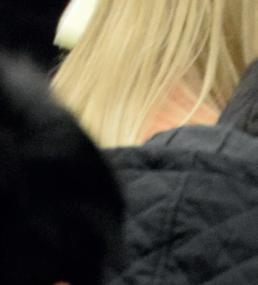

affected student groups opposing the motion. Finding a somewhat surprising ally in the Atheist Society, the President of it stressed what accepting the motion would have meant for Catholics - arguing that it would directly have conflicted with Catholic metaphysics and deep rooted beliefs from within the Church.
Whilst the AGM’s decision means that societies such as Cathsoc will, as they put it, feel welcome in the SU, they cannot simply return to their own little bubble. What kept coming up in the AGM discussion was the need for debate - and that is what such groups opposing the motion need to engage in. ere isn’t room for university groups to hold grudges against each other. ere must be a dialogue now and the SU must take steps to ensure that this happens. It is encouraging to see that they want to participate in this.
CathSoc stated that whilst they are obviously delighted at the outcome, they “Hope to work with the Women’s Association in the future with certain parts of the motion, such as improving access to information for student parents, and this motion has given us a baseline to start communicating and working


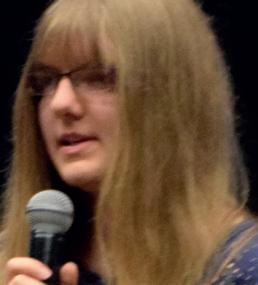


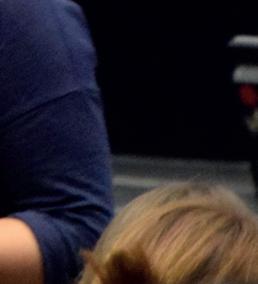




together”. Such statements from both sides are encouraging that this is not the end for such an important women’s issue.
It’s essential to remember that simply saying one side emerged ‘victorious’ over the other is incorrect. Trivialising such a serious topic to simply ‘who scored points over who’ denies the fundamental importance of having a debate on the issue of prochoice/pro-life and what needs to be addressed to improve the situation. And that is exactly what the AGM is there for - to provide a platform where such discussion can occur. It is important that we now advocate for a forum that includes groups opposed to making the Union pro-choice, the Women’s Association and the SU itself.
Failing to engage in any sort of discussion of all groups would be failing Cardiff students. is shouldn’t mean the beginning of open hostility between pro-choice and pro-life, or those that approved and rejected the motion. e fact is, we need a healthy discussion to take place in greater detail - not confined to heated emotions and four minutes arguments. Only then a successful dialogue take place.
Failing to engage in any sort of discussion of all groups would be failing Cardiff students “
Izzy Lyons
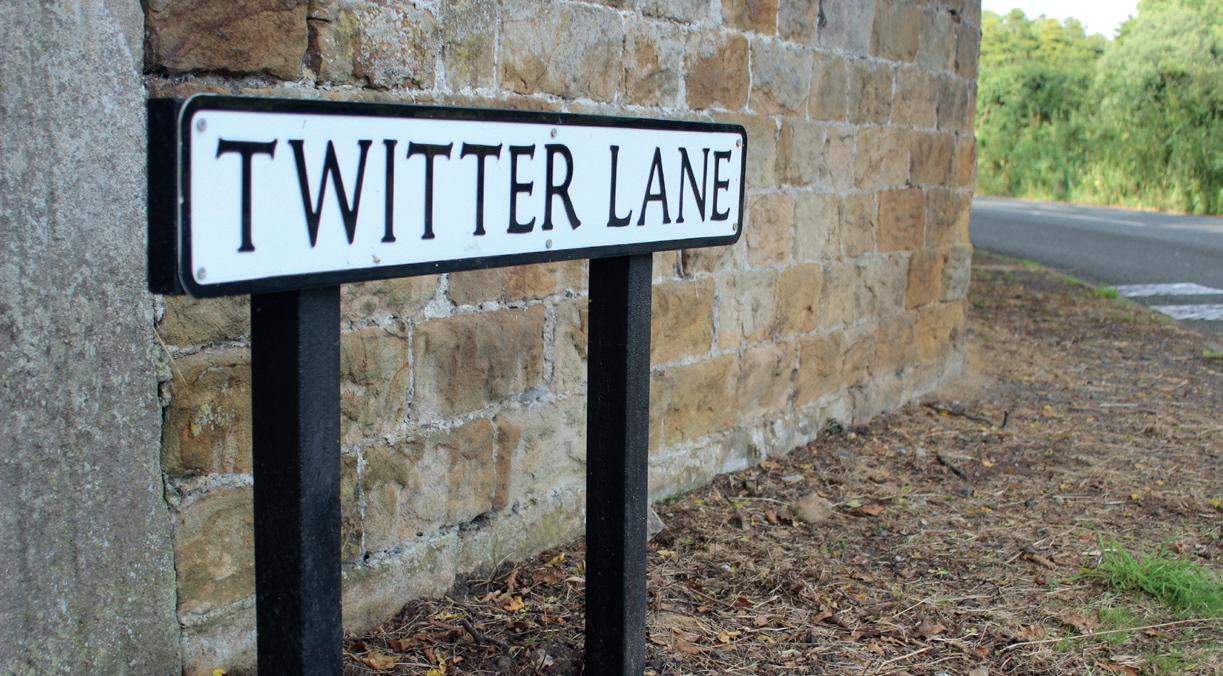
Social media is wonderful, it allows for the rapid spread of news, allows people to be in contact worldwide, allows for storage of pictures and video and is used by politicians, business and charities to communicate their messages to thousands. Social media is wonderful - but people who use it can be idiots.
Emily ornberry, a Labour MP tweeted a picture with a tagline ‘ e image in Rochester’ on the day of the by-election. I am not convinced that the image, or the tweet are controversial but can understand the reasons why it was perceived that way.
A politician should be aware of imagery, be aware of what they say and do and how this links with their political beliefs. Like anyone who loses their job over their use of social media, she probably feels as though the reaction is over the top. Her intentions in posting become irrelevant, her followers on Twitter can re-tweet adding commentary and, by posting online she lost control of the image and the story associated with it. I am not convinced she should have lost her role on the shadow cabinet but am very much aware of the perils of social media. You have the right to
Psay whatever you want (on twitter or elsewhere) but you should absolutely be held accountable, whether this be by an employer, friends, your university or the law. Say what you want BUT there may be consequences. I would like to think that most people would support the idea of free speech, to be able to say what you believe to be right without being victimised or harassed. I also think that most people accept that every day we limit free speech in order to protect those in society who may be vulnerable. An example of this can be seen at our own Students’ Union in the anti-lad policy, if you use certain language that, for example, glorifies violence against women or encourages inappropriate sexual behaviour you can be banned. Say what you want BUT there may be consequences.
Before coming to Cardiff University to do my nurse training I have had several jobs where my employer has had policies on acceptable use of social media. As an employee I agree to abide by these rules and understand that if I break them I may be disciplined. Everyone is briefed about these policies but I have seen plenty of people who have breached them and lost their jobs. Insulting customers or criticising
colleagues on social media is not sensible and by being an employee you agree not to do so. Say what you want BUT there may be consequences.
As a student I am governed by the law, Cardiff University rules and alsoas a student nurse - the rules laid out by my professional body, the NMC. I do not really feel as though any of these stop me from doing what I would normally do online. I use Twitter and Facebook but would never tweet anything about any frustrations I had about the University, my course or placement. It is not the appropriate forum to raise any concerns and anything that happens on placement is confidential. e NMC say that my actions must not bring the profession into dis-repute and I would not want to do this or jeopardise my career. I do not feel this restricts me however as there are ways to voice concerns. I believe I am free to say what I want but I am aware of the consequences and am not an idiot.
All of this being said, I love to use Twitter to get things done and will start to tweet ‘@GairRhydd, where are you? #NotAt eHeath’ if there are still empty newspaper bins – I think this is safe… (Ed: Yeah, it’s safe. But maybe not for much longer. *wink* )
Palestine is everyone’s responsibility. Here’s why.
alestine couldn’t be more topical. After the violence erupted again in July this year and with the death toll exceeding 2,000, the historical struggle has once again forced the world, leading political figures and the British public to take a stand. With the issue being as sensitive now as it was back then, the opinions different groups hold on the matter can never, and should never, be underestimated or assumed.
Yet in this continuous battle, the British public and its moral-make-up chose a side. With the vote in October this year that recognised Palestine as an independent State (274 votes to 12) and London playing home to the National Demonstration for Gaza, our nation’s stance on the matter seems clear. e Spanish parliament voted similarly in favour of recognising Palestine (319 against 2) and earlier this month Sweden became the 135th member of the United Nations to officially recognise Palestine as an independent state. It was time for Cardiff to do its bit – something that students stepped up to at last week’s AGM. As a University we are made up of various ethnicities and nationalities - a priceless diversity. Yet through censoring and discouraging the presence of a pro-Palestine campaign in Cardiff, this diversified student community is
being exploited of a basic democratic right. We should be allowed to participate in any campaign that rightly stands for the ethical and moral convictions that our University celebrates and stands for. is free political expression is essential in maintaining a sense of harmony within Cardiff.
Yet the principle reason Cardiff needed to deepen it’s involvement with a pro-Palestine campaign is because it is morally the right thing to do. Regardless of the religious and political sensitivity, when has it ever been acceptable to turn a blind-eye to the slaughtering of 456 children? ree times as many civilian men being killed as men in combat? When women and children make up 33 per cent of the known casualties? Universities up and down the UK are challenging these shocking statistics and Cardiff should undoubtedly be involved.
As a strong believer in political and social equality, like many of my fellow students, Cardiff ’s lack of action on this borders on embarrassing. While the rest of leading UK universities show signs of a strong Pro-Palestine movement, Cardiff is lagging behind in a smothering bubble of PC indifference. A bubble that has now thankfully popped.
e proposer of the motion, Omar Kamal, stated “Cardiff University is a

global university with interest in what goes on in the world. It is our moral and ethical duty to speak out for human rights and justice and not stand by silently. Cardiff University should recognise the state of Palestine alongside the state of Israel, as a main contribution to ensuring all students are equal in dignity and rights”. And he’s right, with an estimated 20,000 tons of explosives being dropped on Gaza, it is our responsibility, as members of a safe, democratic university, to insist exactly this for Palestine.
We shouldn’t shy away from the fear of being too involved in an understandably controversial subject, but be driven on the desire to see even a mi-
croscopic amount of peace restored in the lives and landscape that compose Palestine.
As a student at Cardiff, I deeply hold the values of democracy and freedom of expression that we are constantly reminded our country is built and thrives on. Our student community at Cardiff is made up of these very same ideals. erefore, our lack of contribution to the pro-Palestine movement is counteractive to our reputation and deceitful of our morals. Our desire for a stable Palestine shouldn’t be confined to the demonstrations in London’s streets or the activity of Westminster. Cardiff needs to stand up, take account and get involved.
Every day we limit free speech in order to protect those in society who may be vulnerable “ ”
It is our moral and ethical duty to speak out for human rights and justice and not stand by silently “
It seems to me that cutting out the middle man of the estate agents is a good idea all round for tenants
After Gair Rhydd’s last issue looking at the performance of letting agencies, we discusses the benefits of cutting out the middle man and choosing a private landlord
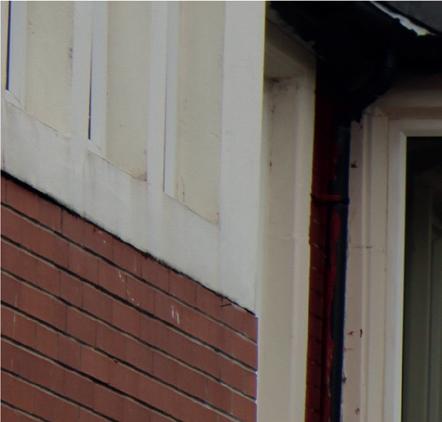

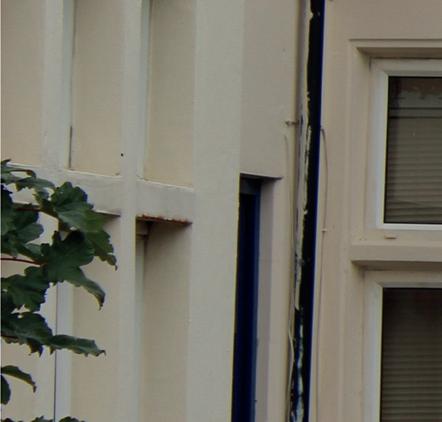
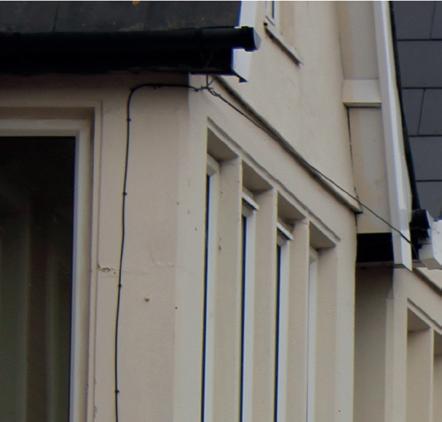


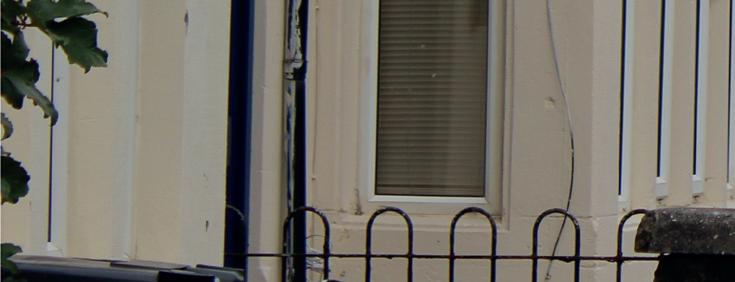

IWhat do you think? Have your say: letters@ gairrhydd.com
n week ten of living in my first student house, I’ve fully come to understand the meaning of cold. Spending nights in three layers of clothing, a blanket, a duvet and a thick throw and still feeling like my toes may just freeze off, it’s fair to say that winter is here. But I’m not in this temperature out of choice, oh no, my housemates and I could easily afford to put the heating on for at least two hours daily. This is the fault of our estate agents, who despite several notifications and angry visits to their branch, have taken seven days to fix our heating. The radiator in my bedroom is leaking, the extractor fan has never worked, one girl’s desk chair is broken, our sofa is ripped, the outside light won’t turn off, and we have to light the hob with a cigarette lighter as the ignition doesn’t work. These problems are the things we reported when we moved in, not to our landlord who
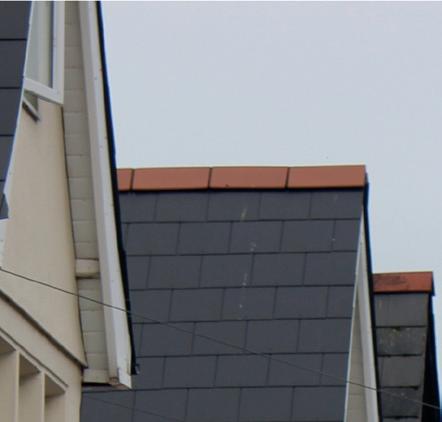
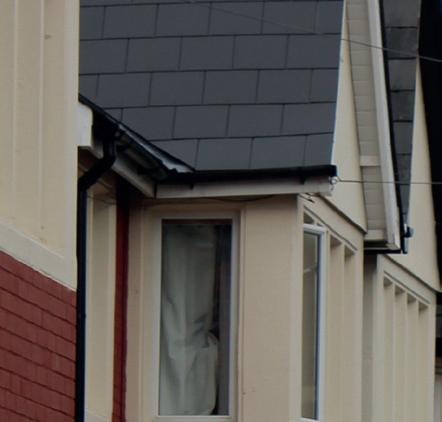
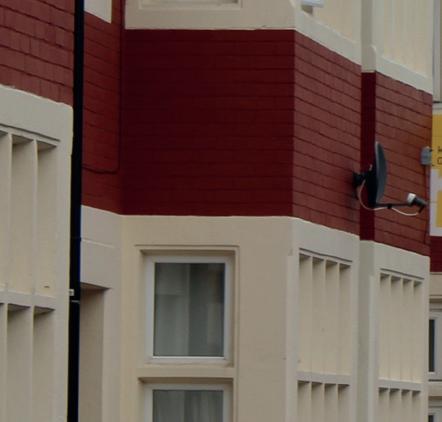

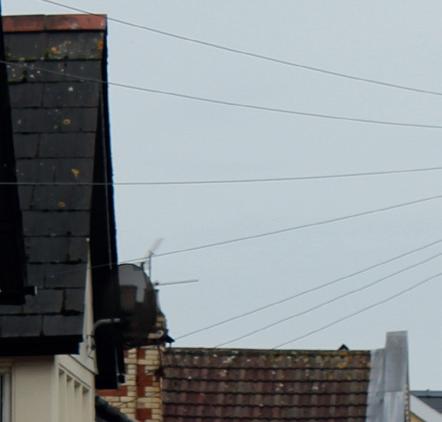

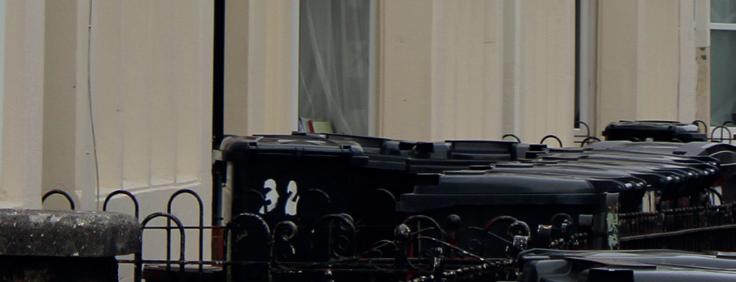
we have only met once when he popped in for five minutes in the first week, but to the estate agents who insist that every single query goes through them, rather than the man who owns the house. We are cold, we are uncomfortable, and we are fed up.
When looking for houses in our fresher year, we viewed a house not too dissimilar to the one we currently rent, that had a private landlord who personally furnished the home, saw to any problems the current tenants had within a day and personally welcomed his tenants to the home on the day of moving in. Unfortunately the house was too perfect and slightly out of our price range so we decided against it - a decision we now regret considering that we are living in what appears to be the Antarctic.
Not only do private landlords take the time to get to know you as people, not just as tenants, they

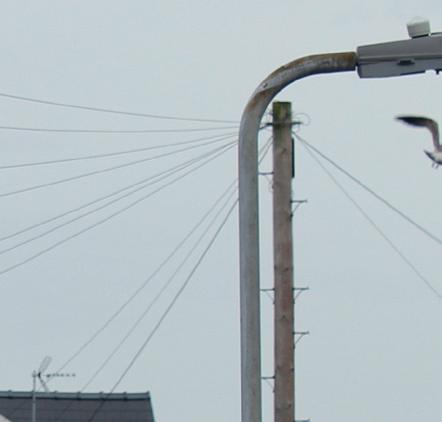

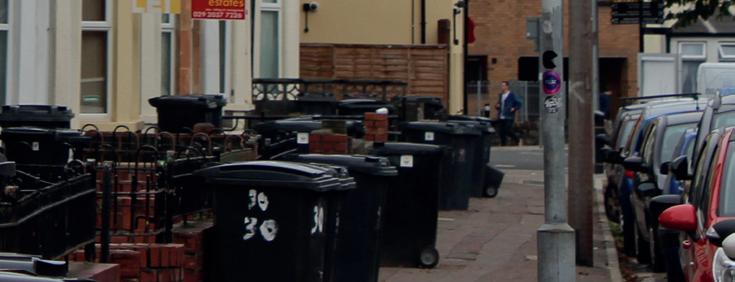
also rely on good reviews from students to persuade potential new tenants to sign for the house. They take care in the appearance of the house (this particular house we viewed contained artwork painted by the landlords wife, whereas our current house has a weird twiggy stick thing which we hastily hid behind a door) and problems are not only dealt with quickly, but actually quite rare to begin with. Not to mention the fact that if the boiler breaks or a pipe bursts in the middle of the night, you have a direct contact number for the landlord himself, whereas our current estate agents close at 7pm in the week and earlier at the weekend, meaning we are pretty much abandoned until a time that is deemed ‘reasonable’ to the people who are sleeping in a warm house that night.
It seems to me that cutting out the middle man of the estate agents is a good idea all round for tenants,

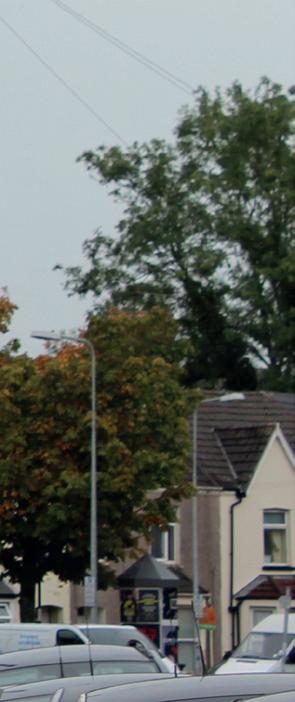

getting problems that may surface rectified quickly and maintaining a good relationship with the person who owns your home. It may be a little more expensive in the long run, but on that cold November evening when you’re clothes wont dry from the washing machine, and your shoes have mould growing on them, and everyone in your house has to spend evenings in the kitchen as that is the only warm room after everyone has cooked their dinner; after all that you do start to think “I could probably live on £20 less a month”.
After always having someone care for the place that I lived, my parents at home and the university run halls in my first year, it’s quite a shock to the system to live in a place where there is no thought to basic living standards. For our third year, we’re definitely searching for a private landlord instead of the hell we’ve endured this year.
...private landlords take the time to know you as people, not just tenants
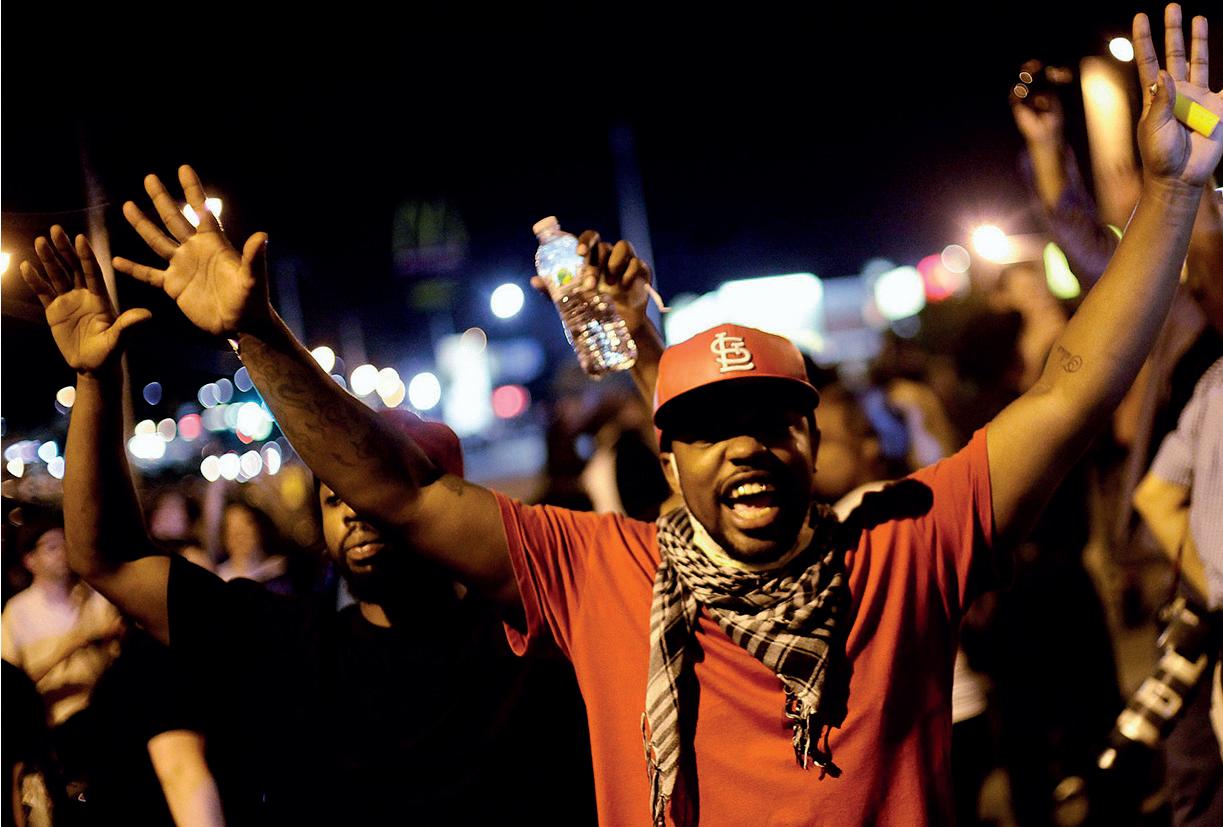
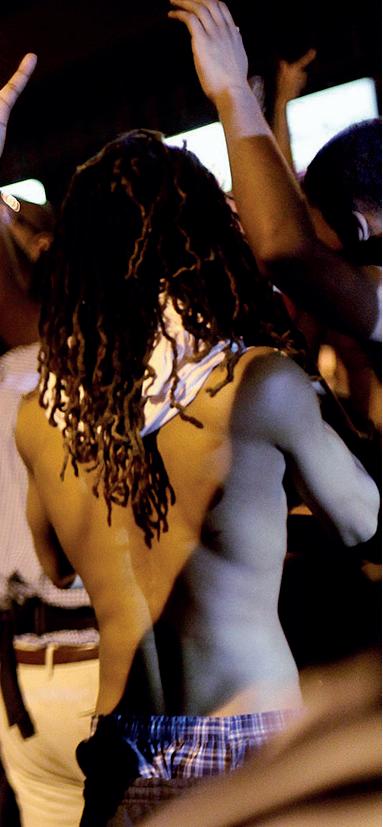
On the 9th of August in the town of Ferguson, Missouri, police officer Darren Wilson fired twelve shots at 18 year-old Michael Brown, hitting him with six and killing him. Brown was unarmed. Multiple witness statements say that he had his hands up. And last Monday, a grand jury ruled that officer Wilson would not face charges for his actions.
All of the facts listed above are true. There are other details to the case, but their veracity ranges from dubious, to unverifiable, to flat-out lies. The reason I haven’t elaborated on some of the contentious details is because I do not wish to be drawn into a debate on the possibilities of what happened on that day. I believe that in doing so, it inevitably detracts from larger issues at hand. You may believe Officer Wilson’s version of events. After all, a jury comprised of 9 whites and 3 blacks did. Or you may believe that his handling of the situation was utterly indefensible and goes against every ideal of law enforcement. I will leave that to you. In the wake of hearing that Officer Wilson was to be acquitted, Ferguson exploded. Cars were burned, homes and businesses destroyed, buildings razed to the ground. It’s very easy to
characterize every rioter and looter as opportunistic hooligans. But by doing so you devalue the cause of the protesters and uphold the dominant ideology, an ideology that still shows that black people are being treated like second class citizens in their own country. A popular quote floating around social media referred to riots as “the language of the unheard,” a phrase offered by none other than Martin Luther King himself. The worst thing was that in Ferguson, people were heard. They were just ignored.
Just as Britain is a society defined by class, America is a society defined by race. A society where white ‘gunsrights activists’ can walk down the street carrying automatic rifles, but a twelve-year old black boy holding a BB gun in a park is shot by police officers. A society where 1 in 3 black men can expect to spend some of their life in prison. A society where the Ku Klux Klan still exists. Black people in America are discriminated against on a daily basis. And the fact that in the self-proclaimed Land of the Free, founded upon the principle of all men being created equal, there is a universally acknowledged and accepted difference in the way that different races are treated in every
single facet of life is a total hypocrisy. Two out of every three citizens in Ferguson are black. Only three officers in the 53-man Ferguson Police Department can say the same. Put yourself in the shoes of a black resident, living in a town where another black man was shot dead unnecessarily at the hands of another white police officer, put there to protect and serve the community. Living in a country where instances like this are going unpunished to the point of no longer becoming news. I cannot place blame on someone who decides that they no longer care about the place that they live and the consequences of their actions, because the institutions around them have made it abundantly clear that they feel exactly the same way about them. And unless you have known real oppression, I would encourage you to consider whether you can as well.
The damage that resulted from the riots was tragic. Not just because it happened, but because it is now being used as a distraction from important conversations that need to happen. Now instead of discussing whether police militarization has gone too far, or on how fractured relationships between the police and
communities actually are, there will be so much focus on the destruction caused that eventually the reason why it was caused will be forgotten. There will be many saying that the protesters have lost their legitimacy when they let their anger get the best of them. But people don’t riot just out of anger. They riot out of desperation, they riot out of helplessness, they riot as a last resort when there’s nowhere left to turn. And the situation in Ferguson, and America as a whole, is all of these things and more.
One of the most exciting moments in my life was when Barack Obama was elected to the presidency in 2008. While nobody expected racism to die overnight, the vision of a post-racial America seemed much closer than it ever had before. On Monday night, with the buildings ablaze in Ferguson, that vision went up in smoke. Instead, you had the first black president of the United States on live television calling for restraint, while a split-screen showed the black people that elected him being sprayed with tear gas by white police officers. For a country that cannot come to terms with its own hypocrisies, there seems a no more appropriate image than that.
A scene from Ferguson
Just as Britain is a society defined by class, America is a society defined by race “
Is it ever reasonable to hit or smack a child? Yaseen Ali Ege, 7, of Cardiff, was beaten on several occasions by his mother, before dying of his injuries in 2010. His teachers noticed he was injured but it was never reported to the social services or the police.These instances are rare, but they do happen. The concern is whether these instances could be avoided.
Child welfare is certainly a priority in today’s society, however the law is currently very confusing, and parents can smack their children to an extent. A recent report by the UK Government reported that there is a lack of understanding about the law. This leads to people not reporting certain instances of assault on a child, because the parent uses the defense in court that it was in ‘reasonable defense’.
“Dubbed “the smacking ban”, Welsh Assembly Members were discussing this issue again last week, with a minister asking for a new committee to be set up
”
The authorities can only prosecute a parent after following many steps and tests, including seeing a visible injury on the child. Child abuse is illegal, however if you assault a child, in a court of law, you may use a defense of ‘reasonable punishment’, and potentially not get prosecuted. If you assaulted a child, you could have an excuse and potentially get away with it. A child, under 16, could be assaulted, kicked, have internal injuries, and the parent could get away with it. These are the current laws regarding child welfare in England and Wales at the moment.
This ‘excuse’ however only applies to children under the age of 16. Is it reasonable to be allowed to smack a 15 year old, or a 6 month old baby and have the law on your side, with it being completely illegal to smack an
adult or a 16 year old?
The United Nations’ Committee on the rights of the child has criticized UK policy, and told the government to remove the ‘reasonable punishment’ clause three times already, showing the UK is more in touch with old Victorian values than the rest of Europe.
Dubbed ‘the smacking ban’, Welsh Assembly Members were discussing this issue again last week, with a minister stating for a new committee being set up so that it can “help encourage public debate and engagement” on the issue.
It is important to remember that this is not a smacking ban, it is an amendment so parents who get charged with assaulting their child do not have the defense or excuse that it was ‘reasonable chastisement’.
The Welsh Assembly has debated this issue many times, dating back 12 years to 2002 when members first debated the issue, and now they have the potential powers to change the law, the Welsh Government has stalled once again.
Plaid Cymru AM Jocelyn Davies, is chair of the cross party group on Violence Against Women and Children to discuss this matter. Ms. Davies is calling on the Welsh Government to include the repeal of the ‘reasonable chastisement’ clause from the Children Act.
Having said that this has been government policy for over ten years and now that Wales has the power to change things, the Labour government has kicked the issue into the long grass and believes “Welsh government is afraid to offend ‘Daily Mail’ readers.” She goes on to say “the way we regard children in our

society should change...putting children first is really important.”
The AM seemed worried about the Welsh Government’s attitude towards the matter, and that party politics should not have an effect on child welfare. In a period leading up to a general election it seems the issue may be buried until after the 2016 election now because of the publicity such a law might create in the rest of the UK. The AM stated: “I really hope we can persuade this government in this assembly to do this.”
The powers the Welsh Assembly have are clear. However, should this amendment be passed, any bill it is attached to may be delayed by yet another visit by the Welsh Government to the Supreme Court over Assembly powers, a timely and expensive delay. However the Plaid Cymru member seemed confident that the Assembly does have powers to pass this law, and it probably won’t have a challenge to the courts. Should that be the case however, a passionate response stated, “I think it would be something well worth going to the Supreme Court over, I would relish that and argue for the defense of children.”
To have a national change of attitudes, I believe a national conversation needs to occur, with people discussing this matter much more, and Ms. Davies agreed with me, even stating that she and her son had a difficult conversation about smacking. People in our society do not talk about smacking on an everyday basis, and still believe that smacking children is okay for discipline purposes. However, attitudes are changing, with more people sup-
porting a ban every time a poll is held, but many people need to have this conversation with their parents over parenting skills, and more education needed for new parents.
It is also important to remember however that even if these parenting classes were available to parents, many will most likely not go. The web has a vast amount of information regarding parenting and an alternative for smacking but it seems some struggling parents are not coping well.
Many parenting associations do not endorse any physical smacking of children, and encourage better parenting techniques, but it seems the public opinion has been stubborn, with a YouGov poll earlier this year showing 69 per cent opposed a smacking ban. Ms. Davies replied to this stating in countries where a ban has been imposed, public opinion changes very quickly to support the motion. Other European countries condemn the UK’s policy on assaulting a child and numerous calls have been made by many to reform.
To look to the future, it seems ridiculous that every child has a right to privacy, education, health, but it seems in our country a child does not have a right not to be smacked. While this amendment is not a smacking ban, it seems to be a significant step in that direction should it ever be passed in the assembly after years of debate.
There is one thing that is more important than any of the politics involved in the decision, and that is for further assaults against children to be stopped, and for cases such as Yaseen Ali to be detected before they go too far.
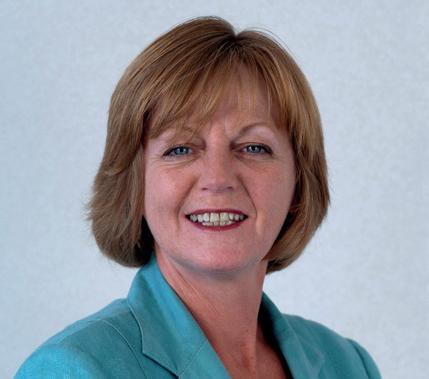
However, should this amendment be passed, any bill it is attached to may be delayed by yet another visit by the Welsh Government to the Supreme Court over Assembly powers
number of reports are being released suggesting there is a prison crisis. e number of preventable suicides is increasing rapidly across England and Wales. At HMP Cardiff, there have been two suicides in the last eighteen months which members of staff have suggested to be an ‘average’ number.
“Changes in suicide rates are related to a complex range of social, economic and other factors such as prison culture
”However, reports from the Howard League for Penal Reform have suggested the number of suicides in prisons to be at a ‘six year high’. e total number of deaths reported to be self-inflicted were 70 out of 199 deaths in total. e chief executive, Frances Crook said almost all the deaths had been “preventable”.
Changes in suicide rates are related to a complex range of social, economic and other factors such as prison culture. Typically, according to population trends, there are several circumstances which indicate when a prisoner is vulnerable to suicide. ese include: mental illness, social class, whether the prisoner was a professional before prison, drug addiction, history of family security and marital problems.
According to population trends there is also a possibility that gender has an influence on suicide rates, since
rates are higher among men than women. Self-harm also raises a cause for concern.
Reports show an overall rise in violence within prisons demonstrating how an inherent culture of violence is rising among inmates and their environment. A study of Elmley prison showed a 60 per cent rise in violence in Elmley prison, Kent, including 11 mini riots in as many months. Elmley, designed to hold 985 men, crams 1,252 men into it’s cells where they routinely spend 23 hours a day.
Last month the Howard League for Penal Reform announced that prison officer numbers have declined by 41 per cent since this government has been in office. is proves, in the charity’s opinion, why the prison service is in disarray. e prisons Minister responded to these claims stating “they are well-run, due to the dedication of the hard-working staff in them. Consistently trying to claim otherwise helps no one.”
Clearly evidence is mounting across the board, and the point of concern is that following this there is no resulting intent to make changes. is seems typical of coalition behaviour regarding the public sector.
Chris Grayling, Minister for Justice,
wrote for the Guardian, claiming that ‘leftist critiques of the prison systems bear no relation to reality’. However, findings in a report from the International Cooperation Group would suggest concerns about prisons are legitimate. France and Italy were revealed as the worst for recorded suicides in prison in 2011 with 100 and 63 suicides respectively, shortly followed by the UK with 59.
Evidence from the Guardian investigation this October indicated that suicide rates in the UK are now up to as many as 6 suicides a month. is statistic would suggest the yearly average, at 72, is now well above Italy and catching up with France, proving the
UK to be firmly among the highest for suicide toll.
Alongside this claim, Grayling argued that ‘inmate suicides have nothing to do with coalition policies’ and ‘we are doing more to help prisoners than Labour did’. is shouldering of responsibility is not just typical behaviour from the coalition, but damaging to any attempt to create a solution. Whilst he claims that he sees a ‘public sector which is adapting to a much lower budget’, it is not necessarily the economic situation within prisons which has lead to rising inmate suicide rates, but our society’s approach towards mental health, rehabilitation and penal reform.
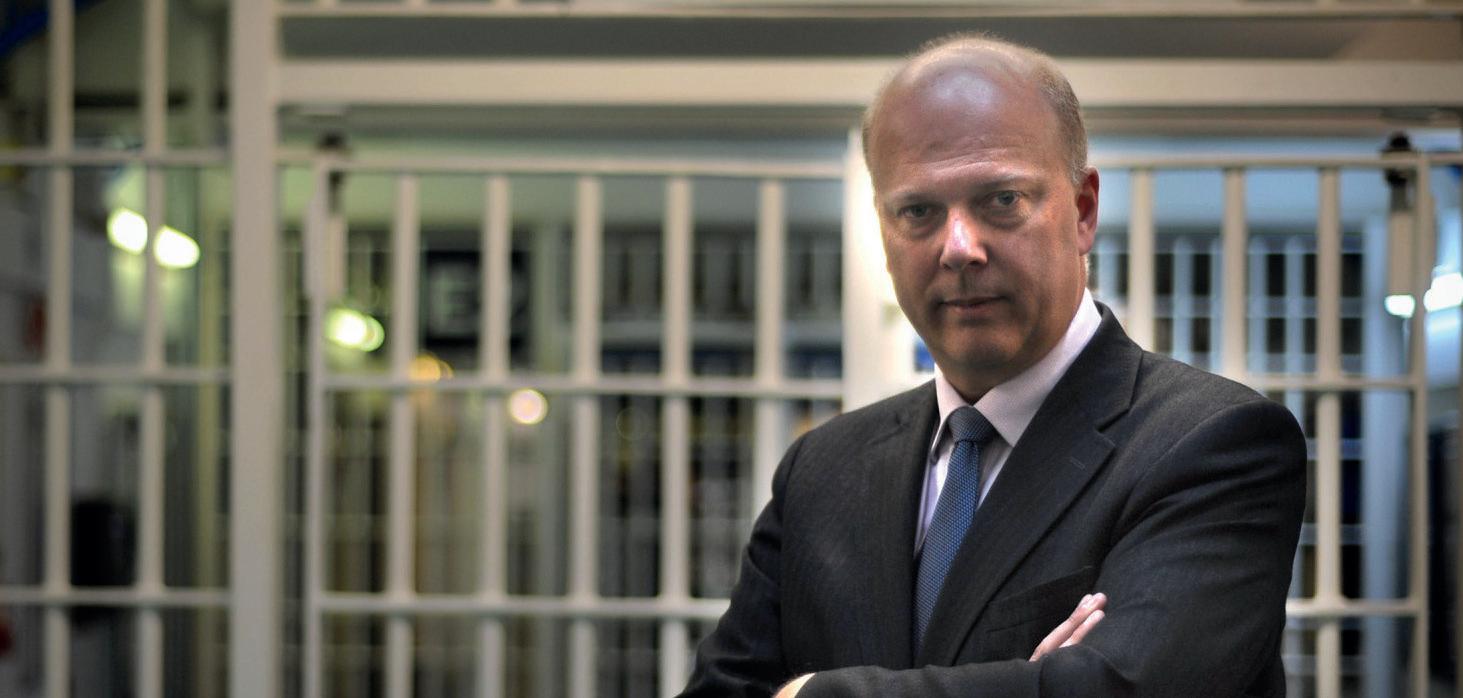
and women are not naturally equal”


In a speech given on the 24th of November, Turkey’s president, Recep Tayyip Erdoğan, caused outrage from feminist groups and shocked the international community, as he asserted that men and women were naturally unequal. is declaration comes amidst social tension, increasingly harsh policies toward women, and the implementation of increasingly conservative and religious legislation.
In his speech, Erdoğan argued that the gap between men and women’s natural physical abilities justifies a natural separation of activities. Erdoğan also emphasised that in the Islamic tradition, women’s role in society consists of giving birth and caring for their children, and that women are placed under the protection of their husband. He concluded his argument by stating that granting equal status to both would “go against nature”.
Erdoğan instead introduced the notion of “equivalence”, which would consist of “equality among women and equality among men”.
Feminist activists in Turkey fear that this declaration will foster a climate in which laws are unequally applied to men and women. ey claim that the situation of women in Turkey has considerably deteriorated since Erdoğan came to power.
Indeed, since his accession to power in 2003, Erdoğan’s policies have become increasingly extremist, in particular concerning human and women’s rights. For example, his proposition to abolish the right to have an abortion, his declaration that women must have at least three children, and finally that men and women’s supposed ‘natural inequality’ is responsible for the gradual differentiation of status between men and women. is differentiation in turn contrib-
uted to the legitimisation of domestic violence; demonstrated by the number of women killed by their husband increasing from 66 in 2003 to 127 in 2013. Erdoğan’s policies were also considered responsible for the progressive exclusion of women from public life and their confinement to domestic work.
Erdoğan’s latest statements have left many worried about future policies. Moreover, the degradation of women’s standing in society under Erdoğan’s regime could also prevent or delay Turkey becoming a member of the European Union. Since the beginning of the negotiation process in 2005, Europe asserted that meeting gender equality and eliminating all forms of discrimination against women were necessary for Turkey to join the EU. Erdoğan did try to convince European countries that he
would not establish an authoritarian regime based on religious principles and some legislation was passed to promote gender equality. e EU noticed this improvement, even stating in 2007 that Turkey’s legal framework on women’s rights “has in general been satisfactory”. However, these efforts were rapidly overshadowed by the implementation of non-secular legislation during Erdoğan’s second term, and Turkey’s accession was widely contested. In 2009, polls showed that 59 per cent of people in the EU were against Turkey’s membership, and approximately 9 out of 10 voiced concerns about human rights.
With these recent statements, and with the policies that are expected to follow, Erdoğan’s Turkey is likely to pass the point of no return with regards to EU membership.
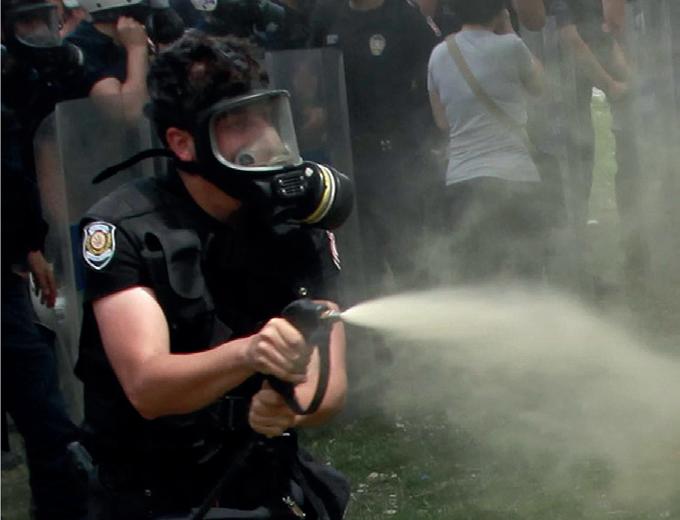

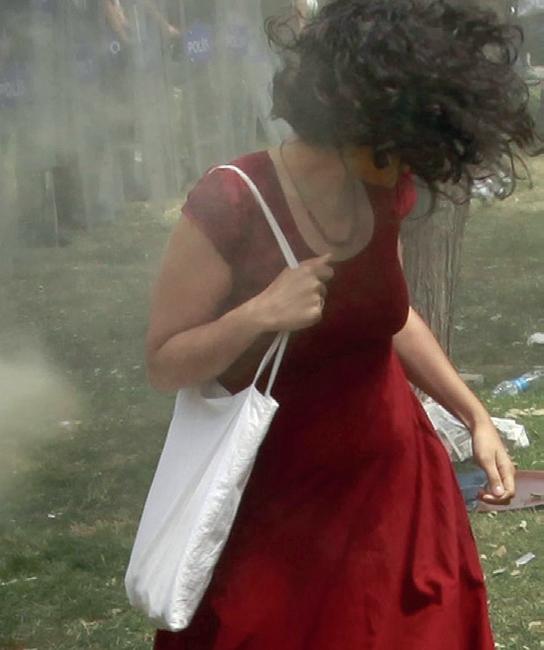
tweet us @GairRhyddPol mail us politics@gairrhydd.com or visit us online at gairrhydd.com/politics
Naomi Klein’s publishing history is littered with examples of blockbuster titles, each of which apparently “defines a decade”, (according to her website) and you’ve probably heard of her books No Logo and The Shock Doctrine . While I’m sure she’s aware of her growing legacy, her new book, This Changes Everything: Capitalism vs The Climate , is an accessible snapshot of the recent coalescence between environmentalism and left-wing politics that threatens to shake up the current political spectrum. An example of this is the Green Party’s current surge in membership and approval ratings, but this change is also happening outside of Westminster, in the rise of direct activism around issues like fracking.

Her book focuses on how many people increasingly see the solution of the climate crisis as the radical reshaping of the capitalist system, as our economies are built fundamentally on fossil fuel extraction. The challenge that climate change presents us with cannot be overstated. According to the International Energy Agency, by 2017 we will be locked into 2°C of average global warming, and beyond that point the extreme weather events which we have already been experiencing will make civilization as we know it increasingly untenable. Activists have consequently taken to referring to
Tthis decade as Decade Zero. In fact many organisations now believe we are locked into 4-5°C degrees of warming given current expansion rates for emissions. If you need further proof of this, countless UN and IPCC reports make the case better than I ever could.
Its not just the threat of climate change that means political opposition to the fossil fuel industry is growing however, as the extractive logic of the fossil fuel companies is driving them to engage in more and more dangerous ‘tight’ extractive techniques in order to keep oil and gas reserves high, and prices low. These are things like Tar Sands extraction, and Fracking, which can seriously damage if not destroy local ecosystems. Safety assurances have been made about these forms of extraction, but given the safety record of corporations like BP, which has had major oil spills in the Niger Delta and the Gulf of Mexico, these are probably not trustworthy assurances. On top of the damages to local ecosystems and the poor safety record of companies involved, the fossil fuel industry is increasingly coming to influence our political systems; the house of commons is currently debating an infrastructure bill, which, if passed, will redefine what industry is allowed to put into the ground beneath our feet.
As a first step, divestment from
the fossil fuel industry has emerged as a way to initially challenge the industry’s hold on our economy. Glasgow University has already embarked upon a ten year divestment plan, which will see them move investments into more sustainable industries, among 200 other organizations worldwide. Of course, it is unlikely that this will have a direct financial impact on the Fossil Fuel industry but the symbolic statement that widespread divestment would result in could be fairly strong. Cardiff University currently supports a large number of researchers on sustainability issues, yet invests £2.5 million of its endowment funds in the most unsustainable industry possible; divestment has the potential to be a powerful political tool in this context.
As the University has already divested in arms and tobacco companies, this makes the fossil free campaign even more hopeful, as it has been shown that we can divest successfully. We need your support however, to show the University that we care about the climate. If we want to change our unhealthy relationship with fossil fuels, and bring the failings of that industry into the spotlight, divestment offers a crucial opportunity to challenge them, and begin to expose just what they’re doing to the planet, and crucially, to our futures.
his week, it was revealed that members of the Welsh assembly could receive a pay rise of up to £10,000 after the 2016 election. is increase would in fact be nearly 20 per cent more than their current basic pay of around £54,000. Members, including First Minister Carwyn Jones, would see their pay rise to figures of £140,000 and £100,000 respectively.
Interestingly, this is not the first time plans to increase the pay of MPs have been suggested, as in December last year, plans for an increase of just over a 10 per cent, which would have taken the average pay up to around £74,000, were eventually criticised by politicians across Westminster, including leaders of the three main UK parties, as being “inappropriate at a time of public sector pay curbs”. As before, these plans were met with fierce criticism, particularly from Mr Jones, who, in an official statement, said he couldn’t see Labour supporting the proposal. “I recognise of course in these difficult times how people will feel about this and I can’t see how we could support the proposals as they stand.” However, he added: “We should not attack the remunera-
tion board. ey are independent of government and of the National Assembly, and this process was established with cross-party support.” e wage currently in place for Welsh MPs is similar to that of Scotland and Northern Ireland, who both receive around £60,000. e decision has caused much debate, with trade union leaders from insisting that these rises should be rejected.
is proposal comes months after announcing Wales are to be offered more flexible income tax-varying powers, meaning that Wales could vary income tax rates without ensuring all income tax bands change by the same amount.
ese powers though would only come into place after a referendum. e move would ultimately see the implementation of a new law, setting out which powers are reserved to Westminster, with what remains ultimately devolved to Wales.
Yet despite these developments, the argument persists that pay rises to MPs would be an affront to the public sector workers they represent. Critics have argued that elected officials ‘must not be compared to doctors, police officers, teachers and even refuse collec-
tors’ in terms of impacts made to everyday life, as ‘without these workers, this country would grind to halt’. Recently, public sector wages have risen faster than those in the private sector, with public sector pensions becoming significantly more generous than the majority of their private counterparts. Voters don’t want it to happen. If the point really needs explaining, a pay rise for MPs at a time
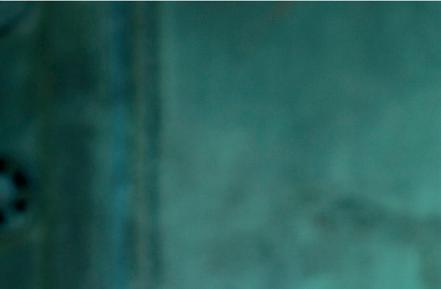

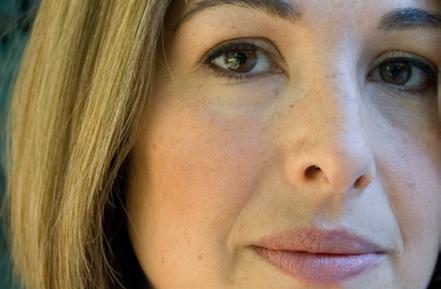
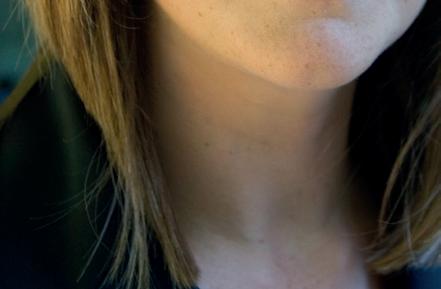




when most people find their incomes flat or falling would be very bad politics. It would fuel the idea that politicians are only in it for themselves and not to be trusted.
e bottom line is that MPs work for the people who pay their wages, the electorate! ey are the boss. And when the boss says no to a pay rise, you have two choices. Accept that, or find another job.

Glasgow University has already embarked upon a ten year divestment plan, which will see them move investments into more sustainable industries.

Many now believe the NUS is a toothless organisation since it failed to prevent the increase of tuition fees to £9000. Students have come to see an NUS card as a discount card rather than representing a politically relevant organisation. I spoke to Beth Button, the President of NUS Wales and former sabbatical officer at Cardiff, to find out what the NUS has achieved recently.
Beth Button believes that the most important recent achievement of NUS Wales is a several million pound national concessionary fare scheme for young people and a free childcare scheme for further education students.
e NUS report found that one in five young people in further education spend over £20 a week on transport to their place of learning. Overturning the Welsh Government’s scrapping of the £2.1 million Financial Contingency Fund, which supports students who would otherwise be forced to leave University, is another recent victory for
the organisation. Supporting students to allow them to stay in university is particularly important in Wales, as the drop out rate in Wales is 10.9%, which is higher than any other country in the UK.
e NUS faced criticism for not supporting a national free education demonstration, which led some student unions to also withdraw their support. e criticism is misleading as the NUS were forced to withdraw support for safety reasons. Despite the NUS paying for a risk assessment and providing support, the organisers of the protest didn’t provide a list of stewards or plan a route to give to the police.
NUS UK has a free education policy and has recently published its Roadmap to Free Education which shows that the Coalition’s University funding policy is accounting trickery: student borrowing has increased by £5billion but this doesn’t count towards the deficit even though three quarters of the debt will not be repaid. Cutting the Teaching
Grant by £3billion has decreased the deficit.
When I asked Beth Button about concerns that Wales is paying for Welsh students to study outside of Wales when they may not return to the country she responded, “opportunity should not be limited by geography”. e scheme helps disadvantaged students who want to study across the border – either because they are closer to universities in England or there are opportunities unavailable in Wales such as Oxbridge. e current funding is unsustainable but any changes to Welsh policy should be made based on how they affect disadvantaged students.
Beth Button believes that by focussing on tuition fees, the money students need to actually live on gets forgotten.
NUS Wales is using its position on the Diamond Review into higher education and student finance to emphasise the importance of maintenance loans and grants being sufficient for students
Protests against 43 murdered student teachers in Mexico
43 Mexican students who were attacked by police and then arrested, have subsequently disappeared and are presumed dead. is has led to massive protests drawn attention to corruption in Mexico, putting intense pressure on the President Enrique Pe ña Nieto. e incident has drawn attention to the 20,000 people who have disappeared in the country amidst drug related violence. Police corruption allows gangs to collude with police. Investigators searching for the
missing students have been carrying out DNA tests on bodies found in mass graves. None of the students have been identified.
Umbrella revolution student leaders arrested
116 protest leaders have been arrested in a crackdown on the pro democracy protests in Hong Kong including two student leaders.
Protesters want the right to nominate and directly elect the head of the Hong Kong government.
People old enough to remember the
bloody suppression of the Tiananmen uprising in Beijing in 1989 are largely against the “Umbrella Revolution”, so called because protestors protected themselves from police pepper spray with their umbrellas.
Campus rape crisis leads to protests in US
University of Virginia students have been protesting on campus at the treatment of rape victims by university authorities after Rolling Stone published a revelatory article about an 18 year old student who was gang raped
to live on. e NUS is campaigning for sustainable and equitable funding in higher education for everyone, including part time and postgraduate students.
e NUS campaigns on a wide range of issues ranging from votes at 16 to the scrapping of unpaid internships that last over a month. Beth Button says this is why she loves her job: one day she might be lobbying letting agencies to scrap agency fees, the next she could be campaigning on mental health or women’s issues.
e NUS is still working hard campaigning and producing professional research on issues important to us. Unfortunately students have become politically apathetic since the Liberal Democrats broke their coalition pledge and are now less interested in campaigning. Many students have also become less interested in student politics, seeing themselves merely as consumers of education.
by seven members of a fraternity. e student was discouraged by both staff and fellow students from reporting the incident, for fear of damaging the reputation of the university. One in five women are sexually assaulted at US universities and the Obama administration is investigating 86 universities suspected of inadequately investigating sexual violence complaints
Studies show that fraternity men are three times as likely to commit rape. A study of college men found that nine out of ten rapes were committed by serial offenders with an average of six rapes each.

Ajudge has ruled against Tory MP Andrew Mitchell in a high court libel action, saying he “probably did call police officers plebs”. It seemed the MP’s version of events was inconsistent with the CCTV footage presented on the incident in 2012. is event took place as Mr Mitchell, government chief whip at the time, was leaving Downing Street on his bicycle, and was reportedly asked to dismount the bicycle when the alleged verbal outbreak occurred.
e word “pleb” is more insulting than most of us realise. It derives from the word “plebian” which was used in Latin Rome to describe the lower
classes, as well as throughout British history to describe those considered ‘common’ people. We can see within the context of being Chief Whip in Government, calling a policeman a ‘pleb’ is offensive. Mr Mitchell acknowledged this was bad language but has consistently denied using the word.
Andrew Mitchell may now have to pay £2 million in interim costs and said he was “bitterly disappointed”.
Mr Mitchell had previously sued News Group Newspapers on the story that was written for the Sun. It was claimed Mitchell had called PC Toby Rowland a “f****** pleb”. However, there was initial controversy in
December of 2012 when it emerged that one of the policemen had sent an email pretending to be a member of the public, ultimately suggesting the policemen in question had lied about the event. Further to this it seemed that Mr Mitchell was owed an apology and an investigation should look into the three policemen.
After what seems to have been quite a public scandal from within the police force and Scotland yard, Mr Justice Mitting gave his verdict after listening to two weeks of evidence from 26 witnesses and considering volumes of documents concerning a 15 second exchange. is news is increasingly damaging to the MP’s reputation.

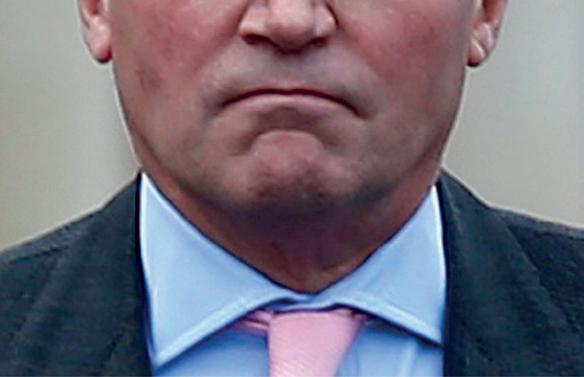
Opportunity should not be limited by geography
Beth Button, NUS Wales President “
Everyone dreads Homo Immunodeficiency Virus, known as HIV. It is deadly and unforgiving. However, it seems that its impact may not be standard throughout its victims. A recent study conducted by University of Minnesota has revealed why the effects of HIV may vary from patient to patient. It is hoped that this study may also lead to potential cures for this fatal ailment.
HIV-1 attacks immune system cells, called T lymphocytes, effectively taking them hostage. It lives off of their molecular machinery like a parasite and destroys the host cell. Even though T lymphocytes possess an anti-virus defence mechanism, made up of a protein called APOBEC3 to fight against viruses like HIV, HIV-1 has a counter-defence mechanism in the form of a protein called Vif. This fools the T lymphocyte into demolishing its own APOBEC3 protein.
A research team led by doctoral students Eric Refsland and Reuben Harris of the University’s College of Biological Sciences and Medical School conducted the study. They discovered that when the body is
infected by HIV-1, one kind of APOBEC3 protein - APOBEC3H is produced in larger quantities. This suggests that APOBEC3H is a vital factor for resisting HIV.
The investigation of varied levels of HIV in the body was carried out through a unique experimentation technique called separation of function mutagenesis. It essentially indicates that humans have varied levels of APOBEC3H protein efficiency in their body. The variations may be stable in some but unstable in others. Only the stable variant is capable of preventing the HIV-1 virus from replicating.
Another crucial factor affecting the manifestation of HIV is the strength of the HIV protein Vif. If the particular strain of HIV has a strong version of the Vif protein then even the stable version of APOBEC3H protein cannot beat it. However, a weak Vif presence can be countered by a stable version of APOBEC3H protein.
Refsland commented, “This work shows that the competition between the virus and the host is still ongoing. The virus hasn’t completely perfected its ability to replicate in hu-
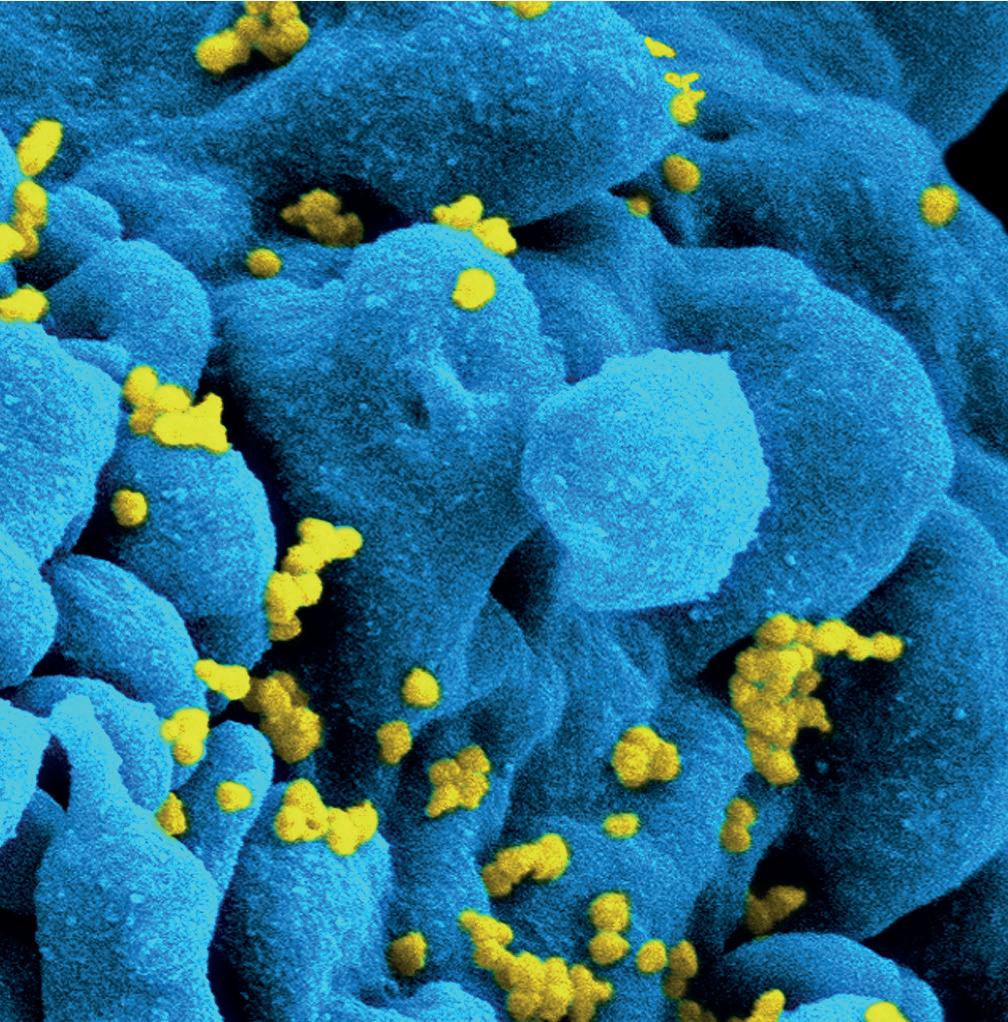
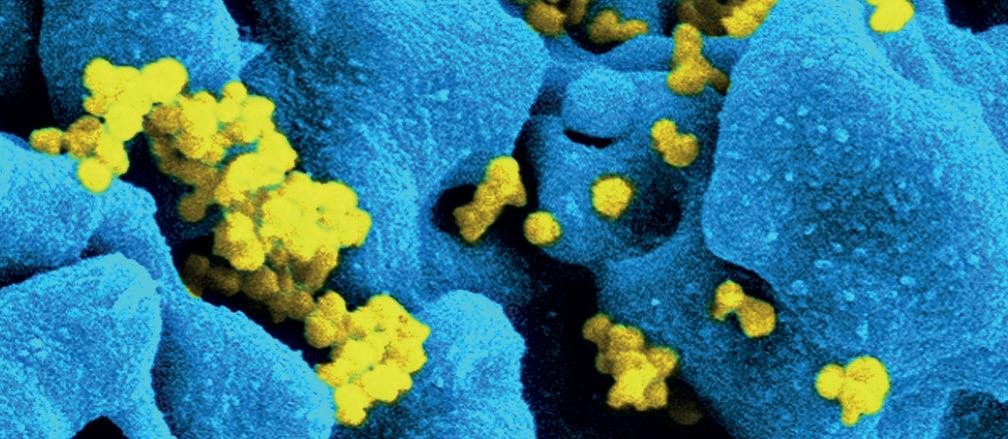
mans.” According to Harris, observations of this constant duel indicate that the next step in the process is to prevent Vif from demolishing APOBEC3 enzymes. This could be carried out by developing drugs that reduce Vif’s affinity for APOBEC. Har-

ris concluded the study by stating that, “This is a bonafide HIV killing pathway, and we just have to devise clever ways to activate it in infected persons. Such an approach could indefinitely suppress virus replication, and even result in curing it.”
(National Institute of Health)
Maria MellorCloning has long been the stuff of science-fiction with movie franchises such as Jurassic Park using the simple idea of taking a cell from an animal, in that case a dead dinosaur, and putting the nucleus into an enucleated egg to grow a living creature. Science-fiction is rapidly becoming science-fact in this field, as since 1952 our world has come closer to cloning larger animals.
be amazing to be able to revive a species previously thought to have been a lost cause? I find myself reliving childhood fantasies brought to life by the likes of the movie Ice Age.
Should we not attempt to save the animals on our earth already rather than bringing back what has already been and gone?
In 1996, scientist Sir Ian Wilmut unveiled the first ever cloned mammal, Dolly the sheep, which people believed could lead to a revolutionised way of farming. e same methods used to do this, today could lead to much bigger things. Much like Jurassic Park, scientists are considering the possibility of reviving the long-extinct woolly mammoth.
In 2013 on Maly Lyakhovsky Island, Siberia, a woolly mammoth was found and excavated from the ice. Not just the bones and tusks, but a whole body, remarkably preserved with fur and soft tissues virtually intact. e biggest hurdle to cloning an extinct species has been finding viable cells with intact DNA, but with ice caps melting and big thaws occurring in cold climates, mammoths have been found and an obstacle cleared to make this dream a reality.
Imagine it. We have elephants now, but wouldn’t it be amazing to be able to see real life mammoths? Wouldn’t it
Upon a first look it seems fantastic that a majestic creature such as the woolly mammoth could be brought back. It could mean wonders for other extinct animals with existing viable cells should it prove successful, and will provide great advances in the field of cloning and numerous benefits to the modern world. e cloning would not just be useful but also incredibly fascinating! Woolly mammoths died out thousands of years ago and I doubt there are many people who wouldn’t want the chance to see a real, live prehistoric animal, palaeontologists and palaeobiologists in particular.
Looking further into the requirements to bring to life such a creature, we must think of the limitations of cloning so far. ousands of mammoth embryos would have to be synthesised, so many surrogate elephant mothers impregnated to be able to have just one successful mammoth baby. Each elephant mother would have to go through almost 22 months of pregnancy, carrying an animal of a completely different species for perhaps not even a successful end result. e elephants our world has already are endangered, with unsuccessful breeding programs and poach-
ing throughout Africa for their ivory. More than 33,000 were killed in 2013 alone.
Should we not attempt to save the animals on our earth already rather than bringing back what has already been and gone? While it would be wonderful to have such an advance in cloning science and amazing to once again see the magnificent creature that is the woolly mammoth, we must think first of the ethics of the situation. Our endangered elephants should not be subjected to experi-
mentation simply for the purpose of human interest, and those in the know should perhaps make a move to try and protect them rather than increase their suffering.
Who knows, however, what the future may hold. Perhaps one day we may perfect a humane cloning process and use it successfully for the good of our planet. For today however, it’s probably best that the past stays in the past. is time it’s for the good of our planet that mankind should ignore its urge to play god.

Such an approach could indefinitely suppress virus replication, and even result in curing it
“Blood Sport raises the stakes of gaming, by making it so when you lose blood in the game, you lose it in real life, too.” Sounds insane right?
You’re in a first person shooter, a military commander or an undercover cop. You’re tactically moving through the map with your comrades, dodging grenades and approaching your target with caution. Out of nowhere, a bullet flies over the wall into the front of your skull.
Normally, you swear a little, feeling the rumble of your vibrating remote as you wait impatiently to respawn. But now with Blood Sport, this rumble pack does far more than just aggravate a frustrated player – it can take your blood too.
e activated electrical signal of the rumble pack, vibrating vigorously when you are shot in a game, is cleverly rerouted, connected by just two wires and a special circuit board to a blood collection machine. “So every time you get hit in the game, blood will be intravenously drawn from your arm,” says Blood Sport e circuit board carefully measures
when it is safe to take blood and when it is time to stop and power down, before you might really need to respawn. e company’s advertising executives are working hard to raise money for the initiative, which they hope to launch in March 2015 to coincide with the release of the much-hyped shooter game, Battlefield Hardline.
Participants at a multiplayer event will compete to see who can lose the least blood, “to see if they can handle Blood Sport. is is after signing an injury waiver of course. e blood taken as a result will be given to medicine in a drive to persuade more people to donate.
Supporters of the kick-starter are offered a range of rewards, including the opportunity to go to the designers’ apartment to try out the single player version, as well as the instructions and coding to build their very own model. is initiative has received a lot of criticism, but Blood Sport argue that “by running carefully monitored tests...we’ve created a unit that makes blood donation easy, fun and nearly painless... while also helping people in need.”

Two Australian archaeologists have deciphered an ancient Egyptian spell book written in Coptic. is ‘Handbook of Ritual Power’, as it has been translated, contains a series of invocations and charms that instruct readers on how to cast love spells, exorcise evil spirits and treat diseases such as leptospirosis, a deadly bacterial infection that still exists today.
Malcolm Choat and Iain Gardner, Professors at Macquarie University and the University of Sydney respectively, are responsible for making sense of this 1300 year old codex, which is the technical name for ancient handwritten books bounded in parchment.
it describes how to subjugate a person by chanting some magic words over two nails and driving them into his doorstep
According to them, the handbook possibly dates back to the 6th or 7th century as there are several allusions to Jesus and historical evidence shows that around this time many Egyptians had become Christians.
However, some invocations and rituals appear to be related to the Sethians, a Gnostic sect from the Roman era that showed devotion for Seth, the third son of Adam and Eve, and for Norea, the wife of Noah. Hence, it is believed to be a transitional text written before the Church purged Sethian and Gnostic invocations in the 7th century.
Sethians were considered heretics for their belief in magic and unusual rituals. Most of the spells and practices outlined in the ‘Handbook of Ritual
Power’ would definitely be condemned as dark magic by Christians. For instance, it describes how to subjugate a person by chanting some magic words over two nails and driving them into his doorstep placing one on the right side and the other on the left. Similarly, researchers claimed that there are also “a number of prescriptions or spells to cure possession by spirits and various ailments, or to bring success in love and business.”
Nevertheless, the exact origin of the 20-page parchment codex is uncertain.
It was acquired by Macquarie University in 1981 from Michael Fackelmann, an Austrian antiquities dealer from Vienna. Even though it is unknown where Mr Fackelmann got it from, researchers have concluded after analysing the dialect and the style of writing used that it comes from the Upper Egypt region, possibly somewhere close to Hermopolis or Ashmunein.
It is also a mystery who might have written and used this handbook. Apparently, it is unlikely that it was solely aimed at priests or monks as at
the time the book was written these practices were more common among normal people who did not want to be classified as “magicians”. Some of the language suggests that it was written with a male practitioner in mind, however, this would not have stopped women from following the spell book’s instructions.
For those interested in dark magic and Ancient Egypt, the codex can be found in the Museum of Ancient Cultures at Macquarie University in Sydney.
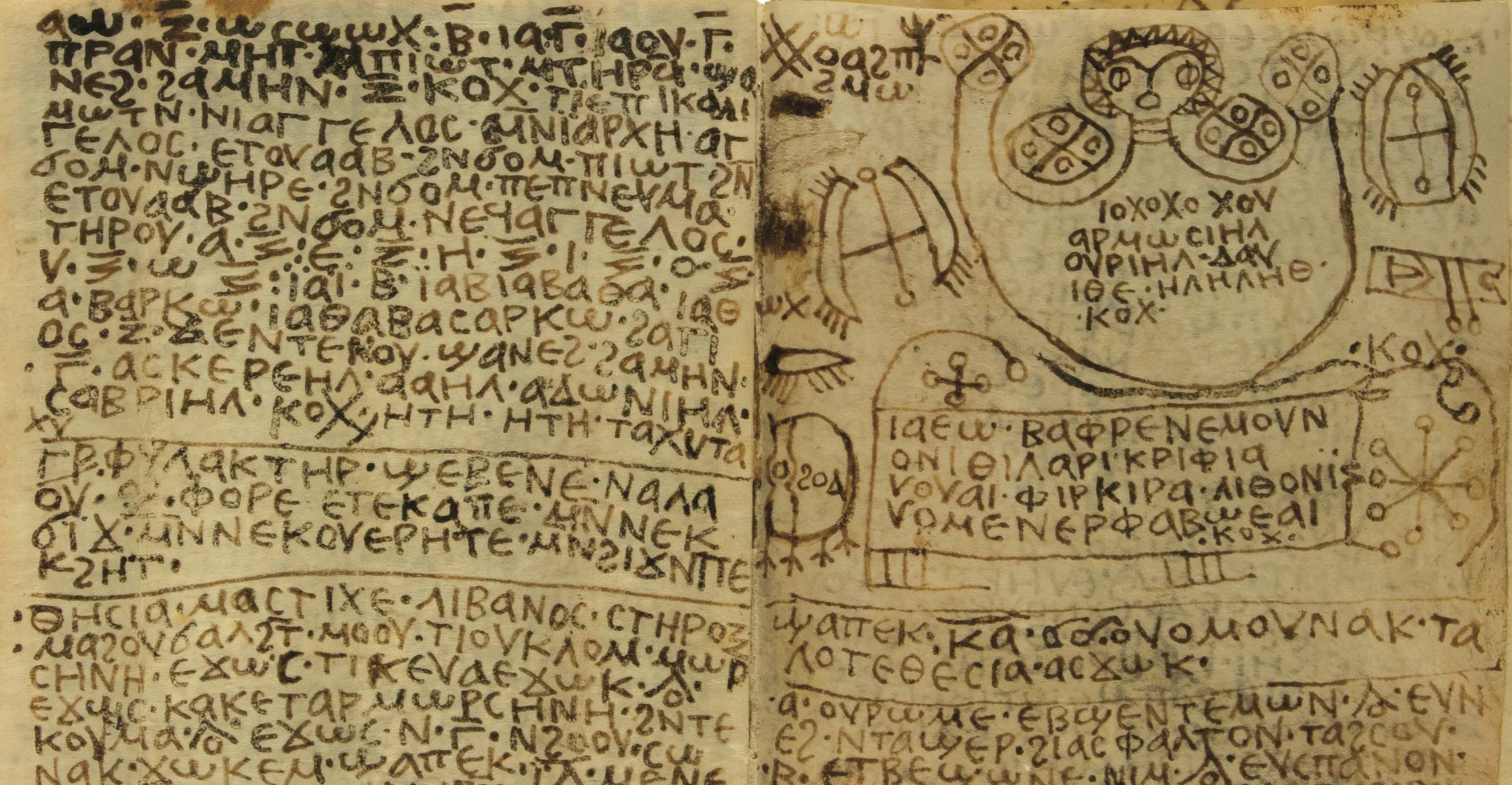
...when you lose blood in the game, you lose it in real life, too “ ”




December
Echo & The Bunnymen
04/12/14, £26.50 ADV LEGENDS
The Bob Marley Experience
05/12/14, £13 ADV
Embrace
09/12/14, £19.50 ADV
Funeral For A Friend
18/12/14, £16 ADV
January
Neck Deep
26/01/15, £10.50 ADV
February
KERRANG! Tour 2015 13/02/15, £16.50 ADV
Enter Shikari 17/02/15 - SOLD OUT
Chelsea Grin
17/02/15, £10 ADV
The Jesus And Mary Chain
27/02/15, £25 ADV
March
Stiff Little Fingers
08/03/15, £18.50 ADV


The Stranglers 10/03/15, £23 ADV
Sleaford Mods 10/03/15, £10 ADV
April
Limehouse Lizzy vs Livewire AC/DC
17/04/15, £20 ADV









It is that time of year folks. The time when sweet lady democracy calls and we must answer. I refer (in my very pretentious way) to the AGM! By the time you people of the future are reading this, we will know the results of the evening and how our Union will continue for the next year. If you missed out, make sure you check online to keep up to date
– the video version of the meeting will be uploaded online by CUTV soon if you are so inclined! In the world of societies, we are having something of a shout about all the great stuff going on! The Winter Showcase is a small campaign to raise awareness of the great stuff going on and all events advertised are aimed at and open to non-members!
For events part of the Winter Showcase, see overleaf
Tuesday 2nd December
Student Enterprise Christmas Market 10am - 4pm Y Plas, Students’ Union
Erasmus Society
Christmas Film Night 4.30pm - 7pm
Chemistry Society Cheese & Wine/Beer & Pizza Night 6pm - 1am
Chemistry Foyer, Main Building
Maths Society
MathSoc Festive Meal! 7pm - 10pm The Macintosh Pub
Teddy Bear Hospital Pub quiz and raffle
Raising money for Noah’s Ark Children’s Hospital Charity. Some of the amazing raffle prizes include £60 of Go Ape! Vouchers, afternoon tea at Waterloo Tea Gardens, vouchers for The Crwys, Dominoes and Face 11, tickets for bowling, treats from Starbucks and The Body Shop. Entry £2 7.30pm The Vulcan
Wednesday 3rd December
Psychology Society BPS Trip 7am - 6pm London
SIMA - Medics Revision Society Year 1 Anatomy Revision 2pm - 5pm Michael Griffiths Lecture Theatre
Student Enterprise Save the High Street 2.30pm – 4.30pm Training room 2 - CSEV, Students’ Union
Women’s Association CWA - All I want for Christmas... 6pm - 8pm Room 4A, Students’ Union
People and Planet Global Climate Justice: What Next After The People’s Climate March 7pm - 9pm Main Building
Art Society Christmas Cards and Decorations 8pm - 10pm Room 4H, Students’ Union
Graduate Centre
Postgrad Quiz Night 8pm - 11pm Graduate Centre
Thursday 4th December
Louisa Sham C
ardiff Marrow are going on their annual venture to the streets of Cardiff to raise funds for recruiting people to the bone marrow register and bone marrow transplants. Fancy dress will be provided in the form of scrubs! Please meet at 12pm on Saturday December 6th outside the big Boots
store on Queen Street in town. Bring your Santa hats and tinsel! Choirs, singing groups, individuals and even those who can’t sing welcome. For more information, please send a message to our Facebook page, ‘Cardiff Marrow’ or contact cardiffmarrow@gmail.com.
tweet us @gairrhyddsoc email us societies@gairrhydd.com or visit us online at gairrhydd.com/societies
If you have yet to get involved and feel like you missed the boat, pick an event and go along! I will be going to as many of them as I can so I hope to see you there.
Finally, I am happy to say that plans are in motion for a mini-fair for the AU and Societies shortly after the January exams are finished! We want people to feel they can get involved no matter the point of the year and I hope this helps! As ever, get in touch on VPSocieties@cardiff. ac.uk if you need any help from me!
SHAG
SHAG C-Card noon - 2pm Students’ Union Boardroom
Effective Altruists Society Me, Myself and Global Health
12:30pm - 4pm Students’ Union
Optometry Society OPSOC Christmas Ball 7pm - 1am
Thistle Parc Hotel
Student Minds
Christmas Party: Student Minds and Anza!! 8pm - 11pm
Koko Gorilaz
Friday 5th December
Psychology Society Christmas Dinner @ The Vulcan 6pm - 9pm The Vulcan Lounge
Postgraduate Students Association Postgraduate Christmas Jumper Party
7pm – 11.30pm Graduate Centre
Radiography Society
Radiography Society Xmas Ball
7.30pm - 11pm Ten Mill Lane, Cardiff
Saturday 6th December
Fashion & Beauty Society Clothes Show Live 9am - 6pm SU Steps - Birmingham NEC

Healthcare Music Society Busking in the Concourse 1pm - 4pm UHW Concourse
SIMA - Medics Revision Society Year 1 Anatomy Revision 1pm - 4pm TBC
Catholic Society CathSoc Christmas Dinner 7pm – 11.59pm Aquinas Hall, Catholic Chaplaincy
Wildlife and Conservation Society Christmas Meal! - WildSoc (Buffet Meal)
7pm - 1am
Gassy Jacks
Sunday 7th December
English Language & Communication Non-drinking Meet ‘n’ Greet Social noon - 2pm
Talybont Social
Erasmus Society
Christmas Meal 2pm - 5pm 10am - 6pm
Wilderness and Expedition Medicine
Waterfall Walk 10am - 4pm Students’ Union
Harry Potter Society Yule Ball 7:30pm - midnight Y Plas, Students’ Union


Have an event you want covered?
Email: societies@ gairrhydd. com
Student Minds Cardiff is a Student Led Service, helping to support students with eating disorders by facilitating weekly peer-led, self-help support groups. The groups are held every Thursday, 6.15-7.15pm, in the boardroom on the 3rd floor of the Students’ Union. The groups are run by two trained student facilitators who are present to ensure a safe environment for prorecovery discussion. Student Minds also holds events to raise awareness of all mental health difficulties. For more information about our groups and events have a look at our Facebook page: StudentMindsCardiff, our Twitter page: @StudentMindsCDF or email us: cardiff@studentminds.org.uk
Anza is an international development charity working in the rural Kilimanjaro region of Tanzania.
Anza aim to empower youth to uplift themselves and their communities through the development of social enterprises. Anza Soc is recruiting a team of students to go out to Moshi, Tanzania for 4 weeks in Summer 2015 to help a local high school that has been threatened with closure by


All events must be signed up to in advance. To sign up and for more information about all of these events, go to cardiffstudents. com/giveitago
Monday 1st December
Give it a Go - Volunteer ‘Going home for
holidays’ Advice Campaign
4.45pm – 7.30pm
Students’ Union, SVC Office
Keeping Your Finances Safe Workshop
5.30pm – 7.30pm
Students Union, Room 4I
Give it a Go Anime Libraries
6pm – 8pm
Students’ Union, the Lounge
Give it a Go - Volunteer ‘Going home for
holidays’ Advice Campaign
4.45pm – 7.30pm
Briefing at the Students’ Union SVC Office
Give it a Go DanceSport Salsa 6pm – 7.30pm
Students’ Union, Great Hall
Student Senate
2nd December, 6pm – 8pm
Students’ Union, Room 4J
An Audience with Steven Berkoff
7.30pm – 10pm
St David’s Hall - The Hayes
Give it a Go DanceSport Latin & Ballroom
7.30pm – 9pm
Students’ Union, Great Hall
Give it a Go Italian Language Taster Session 8pm – 10pm
the government due to unsanitary conditions. Students will fundraise together throughout the year before heading out after exams in June 2015. If you would like to get involved or just want some more info about the project, email cardiff@anza.com
This Christmas our two charities are coming together to hold a Christmas party! On Thursday 4th December, the top floor of Koko Gorilaz will be transformed into a Christmas wonderland, and we would love for you all to join us for an evening of food, drink and entertainment.

Entertainment will be provided by some of the talented societies we have at Cardiff University including FAD and Expression dance societies, and the comedy society. We will also have Christmas cards on sale handmade by the Art Society! Tickets are £3, and all money raised will be split between the two charities. Tickets can be purchased on the Cardiff University Students’ Union website, from the reception of the SU between 12pm and 2pm on Monday 1st December and on the door! Doors open at 8pm! We hope to see many of you there!
Students’ Union, Room 4I
Student Cinema- Love Actually 8pm Y Plas, Students’ Union
Give it a Go DanceSport Technique Class 9pm – 9.30pm
Students’ Union, Great Hall
Wednesday 3rd December
Give it a Go - Christmas Carol Concert - St John’s Church (Rehearsal) 12pm – 2pm
Students’ Union, SVC Office
Chirstmas Card & Decoration Making 1pm – 4pm Students Union, Room 4J
SIMA: Year 1 Anatomy Revision 2pm – 5pm Michael Griffith Lecture Theatre
Give it a Go - Jailbreak Information Session 4.30pm – 5.30pm
Students’ Union, Room 4J
Give it a Go – Volunteer ‘Going home for holidays’ Advice Campaign 4.45pm – 7.30pm
Students’ Union, SVC Office
Give it a Go presents Bubble Football! 6pm
Students’ Union, the Great Hall
Thursday 4th December
SHAG C-Card 1pm – 2pm
Students’ Union, Boardroom
Give it a Go - Volunteer ‘Going home for holidays’ Advice Campaign 4.45pm – 7.30pm Students’ Union, SVC Office
Give it a Go Blank Verse at Christmas 5pm – 6.30pm The Octagon Foyer, Music Building
Speaking and Presenting Workshop 5.30pm – 7.30pm
Students Union, Room 4I
Give it a Go Rowing 6pm – 7pm Talybont Sports Centre
Friday 5th December
Give it A Go Mens’ Cricket 5.30pm – 7.30pm Talybont Sports Centre
Give it a Go Anime Screenings 7pm – 9pm Main Building, Large Shandon Lecture Theatre
Cardiff Philharmonic Orchestra - A Night at the Movies 7.30pm – 10pm St David’s Hall - The Hayes
Give it a Go Ladies’ Football 8pm – 9pm Talybont Astro Pitch
Saturday 6th December
Give it a Go Healthcare Basketball 2pm – 4pm Heath Sports Centre
Brass Band Winter Concert 5pm – 9pm Concert Hall, School of Music
Sunday 7th December
Give it a Go Mens’ Cricket 10pm – 12pm Talybont Sports Centre
Give it a Go Medics Ladies’ Hockey 4pm – 6pm Talybont AstroTalybont Astro
Pictured: Student Minds and Anza logostweet us @gairrhyddsoc
email us societies@gairrhydd.com or visit us online at gairrhydd.com/societies
December brings one of the many highlights of the year for the various societies here at Cardiff – namely the Dance Winter Showcase! Taking place on Thursday December 4th from 6pm - 9pm in the Great Hall, it will be bigger and better than ever with a record number of dance societies taking part! This year, the event brings together eight societies and teams, including Broadway Dance, Expression, FAD, Slash, Bollywood Dance, Belly Dance, Breakdance and Pole Sport. After all the hard work everyone has put in throughout the semester, this evening is the opportunity for all involved to show off what they have been up to, performing several routines to the other societies and the wider student population. Whether these routines come from upcoming shows, those used in competitions or for recent local performances (not forgetting freestyling too), the Winter Showcase will have it all! Entry is just £2, with all proceeds going to the charity Danceaid, who raise money for the disadvantaged around the world through the medium of dance. Whether you’re a seasoned dance pro or just want an evening of entertainment to fill up the cold December nights, come along and see what we have been up to - who knows, you may even discover a new hobby or talent to pursue next term!
Christmas is a time of tradition. Hideous jumpers must be donned, cliché songs must be played to death and a family argument or ten is guaranteed. Part of this tradition is the Pantomime. Pantomimes are cheesy, cringey and a little bit old fashioned but then so is Christmas. Act One, Cardiff University’s Drama society, takes tradition very seriously and so every year a pantomime is put on. Honestly, it’s not high art, but then they never pretend it is. This year they take on the classic, A Christmas Carol . Ebenezer Scrooge is a one percenter who loves nothing more than ripping off those in need, not least his own employees. But one Christmas eve, he is visited by three ghosts and will never be the same
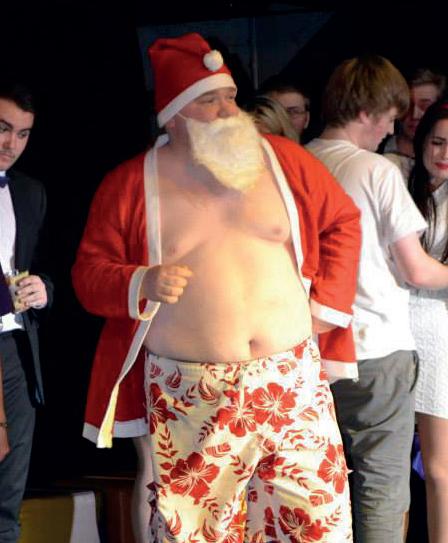
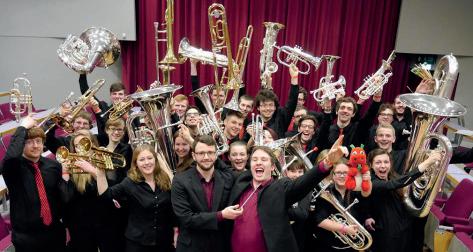
again. With song parodies galore, a dame and even a pantomime horse, A Christmas Carol follows many panto traditions you grew to love as a child. However it is strongly inadvisable to bring a child to Act One’s panto, in fact anyone under the age of 18 should stick to Peter Pan. The show is lewd, crude but ultimately a heartwarming tale of Christmas spirit.
A Christmas Carol – The Panto is in CF10, at the Students’ Union on the 8th, 9th and 10th December with doors at 7.30pm and student tickets £5. Audience participation is encouraged and the bar will be open - seriously, pantomimes are best enjoyed inebriated. A bit like Christmas.
Don’t miss Brass Band’s Winter Concert with guest conductor, professional trombone player Roger Argente, which promises to be an evening with a wide variety of styles of music from one of the best university brass bands in the country. This year they will be doing a joint concert with the Cardiff University Jazz Choir which will be held on Saturday December 6th at 7pm in the Concert Hall, School of Music for just £2. The Jazz Choir was created in September 2013 to allow for singers interested in the genre to have performance opportunities within the society. So far this year they have participated in a few smaller concerts within the School of Music and are highly anticipating this joint concert.
CUBB is a 35 strong band, consisting of a mixture of music and non-music students and is
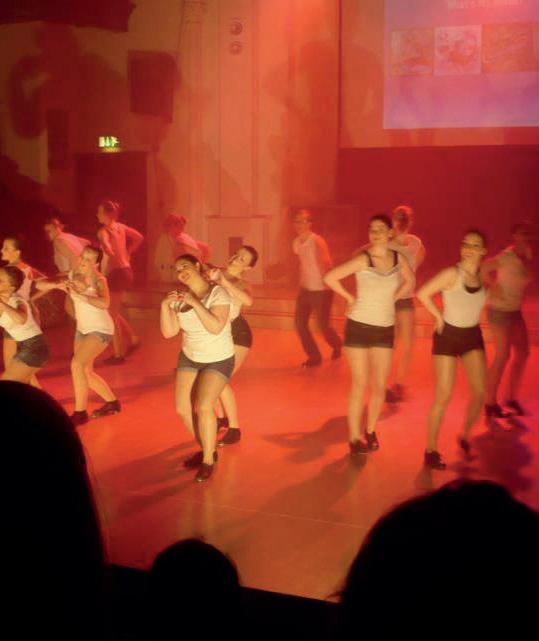
Events this week:
Dance Winter Showcase
Thursday 4th December 6pm - 9pm, £2 entry, The Great Hall
Jazz Society - Jazz at Christmas
This is the Jazz Society’s showcase of the term’s hard work in rehearsals. It will be a relaxed evening of festive cheer, and there will be a bar! It will feature the society’s four main ensembles: Jazz Orchestra, Big Band, Jazz Choir and Sax Choir, with the addition of a few smaller ensembles affiliated to the society or featuring its members. Repertoire will include several Christmassy songs and jazz standards with a few unexpected extras.
conducted by two students, Elan Higueras and Andy Wareham, and led by a committee. The band attracted a great number of new members this year and has been working hard during rehearsals to produce a great sound and maintain their superb reputation. For this concert each year the band invites a professional conductor to take the band in rehearsals and a concert, giving the band a chance to flourish and fine tune their pieces to give them a high class finish. In the past conductors such as Richard Evans, David Childs and Paul Holland have graced their stage, and this year the chosen conductor is Roger Argente, professional trombonist and head of brass at Trinity College of Music. Roger, originally from South Wales, has been the guest conductor for many famous bands, including the BBC Symphony Orchestra and the London Philharmonic Orchestra, so the university brass band really is in for a treat! The concert will exhibit the pieces they have rehearsed during this term, including one piece which will feature in their set for the annual inter-university competition Unibrass, where the brass band have achieved a top five position since its beginning.
Their calendar has been jam packed for this term, filled with concerts and competitions. One of the most exciting of these was the Composition Competition, a competition for young composers all over the UK with the theme of Space (to fit with their 2015 Unibrass set). After receiving many excellent entries, it has been great to see the composing interest out there and how far the Brass Band name can spread. With several other socials planned for the rest of the term, including the much anticipated annual Brass Band Pub Golf and their usual carolling in a variety of locations including the annual pub busking event, the city will be full of Brass Band’s musical Christmas cheer. Watch out for them in the coming weeks!
In summary, there are so many events happening for the last two weeks of term and all for an incredibly reasonable price. Why not share the festive cheer and attend one of these events!
Thursday 4th December 7pm9.30pm, £2 entry, Concert Hall, School of Music
Christian Union Carol Service
Look forward to a great evening of festivities, singing all your favourite carols with TCUPS choir, hearing from the bible and eating lovely mince pies., with refreshments afterwards. Everyone’s invited so get all your friends along for a wonderfully Christmassy evening!
Friday 5th December, Doors 6.30pm for a 7pm start. free entry, The Great Hall
City of Cardiff Concert Band and Jazz Orchestra
Charity concert including a raffle with all proceeds to Recovery Cymru
Friday 5th December 7.30pm, £3 student entry, St. Teilo’s Church, Woodville Road
Male Voice Choir, Saturday 6th December , 7.30pm, St. Teilo’s Church, Woodville Road
Brass Band and Jazz Choir
Saturday 6th December, 7pm, £2 entry, Concert Hall, School of Music
Aberdare Hall Carol Service
Aberdare Hall is holding its 72nd annual carol service, led by Father Jones and the Aberdare Hall Choir (directed by Emily Schollar,, The service will be followed by refreshments in Aberdare Hall itself. There will be a collection for the Hall’s chosen charities this year, Diabetes UK and Save the Children. Sunday 7th December, 3.15pm -5.30pm, free entry, Concert Hall, School of Music
Male Voice Choir and Cardiff University Brass Ensemble (CUBE) Monday 8th December 1pm, Concert Hall, School of Music
Cardiff University String Orchestra, Monday 8th December 7pm, Concert Hall, School of Music
Act One
A Christmas Carol the Pantomime 8th, 9th, 10th December 7pm, £5 student entry, CF10, Students’ Union
Audience participation is enouraged and the bar will be open - seriously, pantomimes are best enjoyed inebriated. A bit like Christmas.
Hannah Sterritt with contributions from Megan Wilding, Aimee Hardman and Sarah Harris Pictured: Brass Band after Unibrass 2014 Pictured: Left Hand: Act One Panto 2013 Right Hand: Broadway Dance Society previous ShowcaseJames Ledward
Cakes, games and free contraception. Three of life’s simple pleasures that we can all be grateful for.
Good sexual health is also something we can be grateful for; and during SHAG week, SHAG is willing to help out with all four. Following last year’s success during the re-launch of SHAG, Cardiff University’s Sexual Health Awareness Group, the team has been working endlessly to provide accurate information and continue to raise awareness of sexual health issues, as well as fundraise for various sexual health organisations.
Once again we’re back with SHAG week, a whole week dedicated to

your sexual health! Throughout the week (beginning 1st December –coincidentally World AIDS Day) you can find SHAG in the Students’ Union reception. As well as games, sales, freebies and shag packs, we’ll be promoting our C-Card Scheme which allows you easy access to free Durex condoms each week. Here’s the lowdown on what will be going on and when.
To kick the week off, on Monday we’re teaming up with the LGBT+ association and getting involved with activities related to World AIDS Day. They’ll be in the foyer of the SU all day so pop along and find out what’s going on! At 4.30pm there will be a
gathering outside Main Building as we light the building red in recognition of World AIDS Day. This will be followed by a sex and relationships themed quiz in the SU. We’ll also be running our C-Card Scheme from 1-3pm, so come along for some free contraception!
On Tuesday, come along for our ‘Cake and a Condom’ event. As well as walking away a few condoms richer, you can enjoy your cake guilt-free as all profits will be donated to The Terrence Higgins Trust.
If cake isn’t your thing (or you just want some more SHAG week fun), come and see us at YOLO on Wednesday night for some SHAG games. Previous antics have involved
being blindfolded, spun around and then attempting to put a condom onto a plastic penis model.
On Thursday and Friday more games and handouts will ensue. We’ll also be running C-Card on Thursday 1-3pm. We will be handing out SHAG packs throughout the entire week containing useful information, condoms and sweets. On Thursday evening you’ll find us in The Taf adding our own spin on the regular pub quiz!
For more information visit SHAG on Facebook in order to stay posted on the latest events throughout the week. If you are involved with any of our events, tweet us on #CUSHAGweek14
Would you know what to do in an emergency situation?
Fast and effective First Aid can often be the difference between life and death.
At Cardiff LINKS we create a fun and social atmosphere to train members in a number of first aid qualifications. We are the student side of St John Ambulance - a charity devoted to First Aid volunteering which provides onsite First Aid services to the public, and as a qualified volunteer you can attend duties at big music or sporting events, such as at the Millennium Stadium covering the rugby Six Nations and Cardiff City football matches.
Once done with student life, members can continue to use their First Aid qualifications and volunteer with St John Ambulance in any part of the country. We’re currently in the middle of our first set of training, work-

ing towards the Intermediate First Aider (IFA) qualification.
We hold weekly meetings on Tuesday nights where we go through the First Aid required to pass the Intermediate First Aid qualification, lucky enough to be with members of our committee, qualified student trainers. We also have external speakers in to talk about topical issues. Previous speakers have discussed their firsthand experience with everyday CPR, how to deal with drunken situations, self-defence and sports injuries.
At Cardiff LINKS there is also a social side, where you will get to meet other likeminded people through a variety of social activities and nights out. For the rest of this term, we have a Christmas themed social planned where we will don our Christmas jumpers and go to Winter Wonderland. Also, linking in with the training we’ve done this year so far, we are

hosting a light-hearted quiz with related First Aid questions and prizes. Additionally, members have the opportunity to attend the annual LINKS conference held with other LINKS units in the UK, to discuss and com-
pare ideas and share our achievements.
Cardiff LINKS teaches you to save lives and have a good time doing it! For more information, search ‘Cardiff Links’ on Facebook.
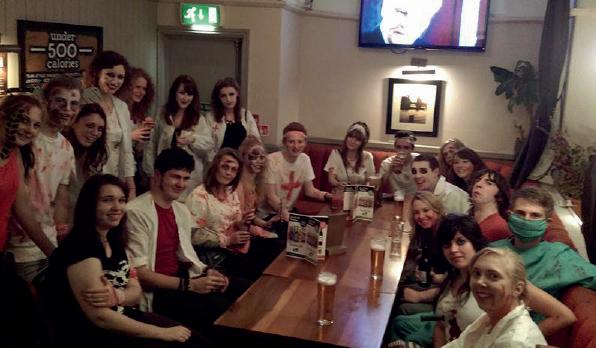
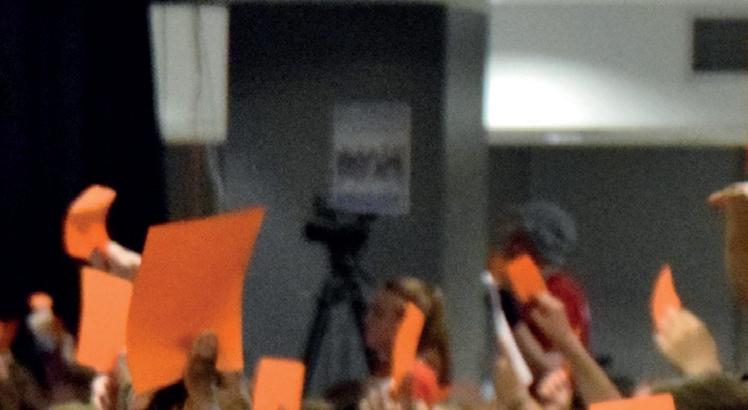
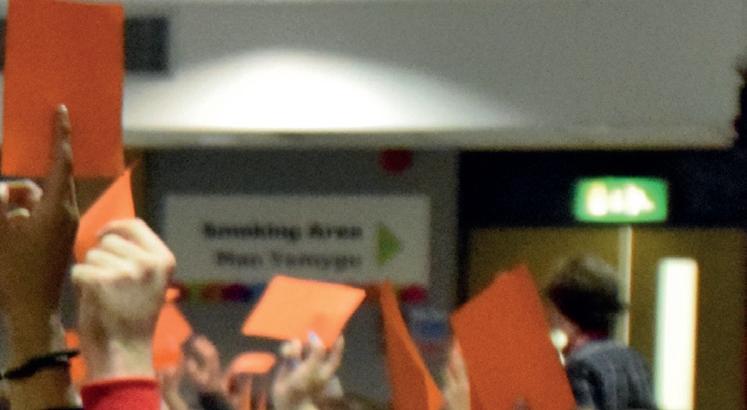


trydar @taf_od
ebost tafod@gairrhydd.com ar-lein gairrhydd.com/tafod
Steffan Bryn Jones
Morgan Owen


Cofiwn y crwydro, y breuddwydion liw dydd a’r ymddiddan di-drefn ym mherfedd nos, a byth y gwaith
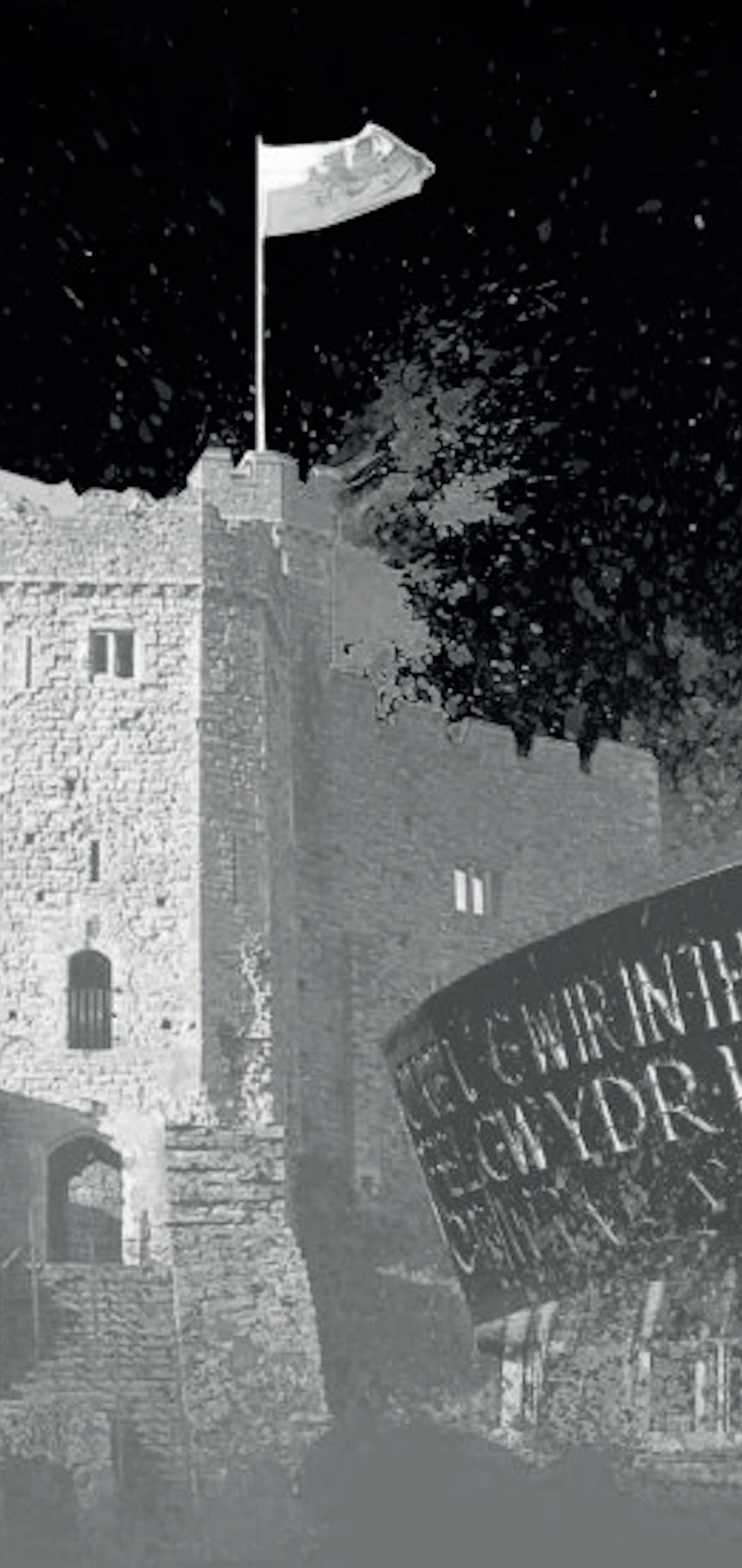
FYel bachgen o’r Cymoedd, cyfareddol o beth yw’r môr i mi, ac er agosed tref fy magwraeth i’r arfordir—cwta 25 milltir—prin ar y cyfan y gwelais y weilgi fawr yn laslanc, a phrinnach byth y’i gwelaf y dyddiau hyn, a minnau’n byw yng Nghaerdydd! Hawdd y gellir deall, felly, fawredd y môr i un sy’n gyfarwydd â dyffrynnoedd sarffaidd Cwm Taf a chysgodion safadwy’r Bannau. Onid yw’r môr yn gwrthod â gwên a gwawd ymgais ofer y dynoliaeth i’w ddarostwng, fel y llwyddwyd gennym ddofi’r mynydd a’r iseldir? Dichon mai yn y gwylltineb dihalog hwn y gorwedd rywfaint o swyn y môr, neu o leiaf i fab tref haearn lle mae pob dyrnaid o bridd a grefir o’r tir yn llawn o wehilion. Dagrau gleision y ddaear, y sorod serw, a’r glasaf beth a geir ymysg y llwydi. Ond ni pherthyn unrhyw dlysni i sorod, a chamwedd fyddai ei gymharu â glesni’r môr. Afraid dweud, ni all neb adael ei farc ar donnau’r eigion fel y creithiwyd y Cymoedd, na chorlannu’i eangderau, ac yn hyn o beth, mae iddo ogoniant dychrynllyd braidd. Dyma’r hyn a gredwn o hyd, ond bellach, mae fy hoffter, ac weithiau, parchedig ofn, o’r môr yn ddyfnach, ac mi draethaf yma y rheswm pam. Benwythnos diwethaf, mi fûm yn Aberystwyth am y Ddawns Ryng-golegol, a phryd hynny, ni welaswn y môr ers rhyw dipyn o amser. Croe-
ae’n anodd credu mor sydyn mae’r wythnosau wedi mynd rhagddynt, a hithau’n llai na mis tan y Dolig yn barod! Diau fod pob un ohonoch wedi bod wrthi’n gweithio’n ddiwyd ac ni fyddwch yn melltithio ebrwyddder treigl amser erbyn i’r rhifyn hwn o Dafod eich cyrraedd. Ond bid a fo am hynny, cawn ni oll ddigon o gyfle dros y gwyliau i wneud iawn am y munudau a dreuliasom â’n golwg i ffwrdd o’n gwaith; ac onid yn y munudau hynny y digwydd y peth annelwig hwnnw a elwir byw? Cofiwn y crwydro, y breuddwydion liw dydd a’r ymddiddan di-drefn ym mherfedd nos, a byth y gwaith. Ond dyna ddigon o synfyfyrio! Yn y rhifyn hwn, cyfrannaf i, Morgan, erthygl yn traethu’r profiad hynod a gefais wrth wylio’r machlud dros y môr yn Aberystwyth benwythnos y Rhyng-gol, ac arwyddocâd a swyn y môr i rywun a hana o’r mewndir, gan orffen gyda throad bach wrth i mi ddatgelu’r elfen honno o unrhyw brofiad sydd yn ei ddyrchafu’n brofiad aruchel. Yn anffodus, dyma’n hunig erthygl yr wythnos hon, ac felly cymeraf y cyfle hwn i alw arnoch, annwyl ddarllenwyr, i gyfrannu! Gellwch gyfrannu erthygl ar unrhyw bwnc, ac nid oes rhaid bod yn rhyw Saunders Lewis i fod yn gymwys; os ydych yn rhugl yn y Gymraeg, rydych yn gymwys, ac rydym ni olygwyr yma i gywiro unrhyw fân wallau. A chyn i mi gloi’r gair golygyddol hwn, hoffwn eich hysbysu y bydd cynnig yn mynd gerbron yr AGM ddydd Mawrth am swyddog llawn amser dros y Gymraeg, a phe derbynnid y cynnig, mi fyddai refferendwm ar y mater. Pe bai hynny’n digwydd, byddai’n ddigon posib y ceid buddugoliaeth pe baem ni Gymry’n uno a phleidleisio! Amseroedd cyffrous, yn wir!
ae’n falch gennyf adrodd y crëwyd hanes mewn llawer i ystyr yng Nhyfarfod Cyffredinol Blynyddol Undeb Myfyrwyr Prifysgol Caerdydd nos Iau diwethaf. Yn dilyn cymeradwyo Siarter Cenedlaethol y Gymraeg UCM Cymru yn Senedd y Myfyrwyr ychydig wythnosau yn ôl, gyda’r Cyfarfod Blynyddol ar y gorwel, aeth yr Undeb ati i ymateb ar frys i un o argymhellion y Siarter. Nodir yn y Siarter y dylai myfyrwyr fod â’r hawl i ddefnyddio’r Gymraeg mewn cyfarfodydd democrataidd. Er mwyn rhoi’r hawl honno ar waith yn ymarferol, mae’n rhaid sicrhau cyfieithu ar y pryd. Roeddwn yn hynod falch o weld gwasanaeth o’r fath wedi’i drefnu mewn dim o dro. Gyda phob parch i’r Undeb, nid ar chwarae bach mae cyfieithu cyfarfod â chymaint yn bresennol. Mae lle i ddiolch yn arbennig i Elliot, Llywydd yr Undeb ac i Emma McKeogh, Cydgysylltydd Llais y Myfyrwyr yn yr Undeb am wneud hyn yn bosibl o fewn cyn lleied o amser. Nid carreg filltir hanesyddol i’r Undeb yn unig mo’r datblygiad haesyddol hwn ychwaith. Gyda 650 o glustffonau mewn defnydd, dyma hefyd y cyfarfod mwyaf i’r cwmni cyfieithu Cymen fod yng nogfal ei gyfieithu erioed!
Roedd yr ymateb, at ei gilydd, yn anhygoel! Calonogol oedd gweld ymateb y myfyrwyr Cymraeg a’r di-Gymraeg,
fel ei gilydd, yn llifo i mewn ar ffrwd Twitter y cyfarfod. Gallwch edrych yn ôl ar #CardiffAGM (gan ychwanegu Cymraeg/ Welsh) i gael gweld popeth. Y neges yma, gan Heather Sadler, yw un o fy ffefrynnau i’n bersonol:
‘Simultaneous #welsh translation at the #CardiffAGM is so awesome!!! #language inclusion!’
Nid yn unig y cafodd rheiny oedd am ddefnyddio’r Gymraeg ryddid i wneud hynny yn sgil y cyfieithu, ond roedd hefyd yn fodd o wnneud gwyrthiau yn ei hun o safbwynt ymwybyddiaeth ieithyddol. Cafwyd cyfraniadau clodwiw a theimladwy ar faterion o bwys mawr, a hynny yn y Gymraeg. Ymhell o fod yn ‘gul’ neu yn ‘blwyfol’, dangoswyd mai ehangu’r profiad a’r drafodaeth a wna’r Gymraeg. Mae’r egwyddor y dylid cynnal pwyllgorau’r Undeb yn ddwyieithog wedi’i sefydlu bellach. Gobeithio y bydd mwy a mwy o gyfraniadau yn digwydd yn y Gymraeg dros y misoedd a’r blynyddoedd nesaf felly.
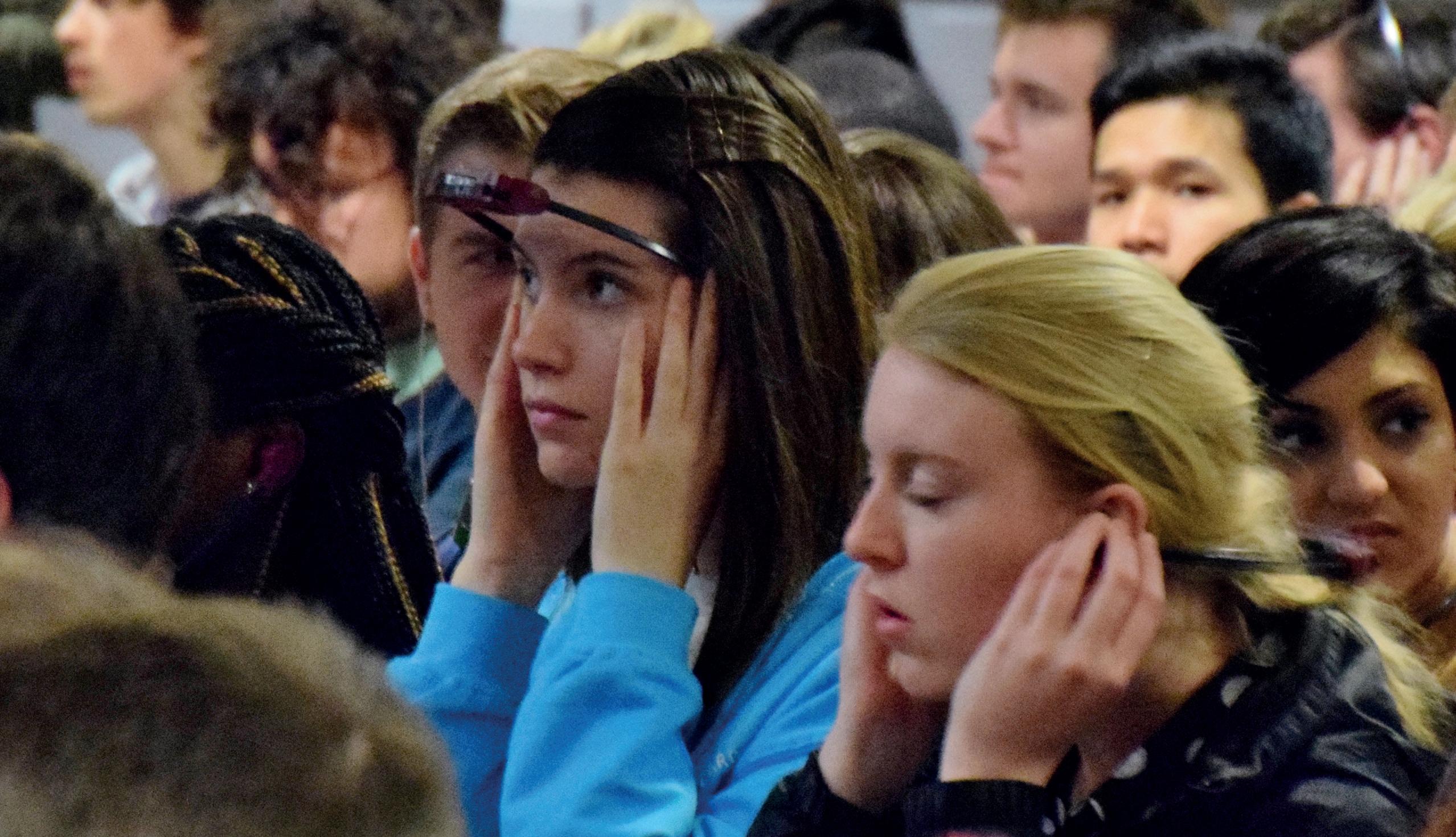
sewais yn llon gyfnewid aer merfaidd y brifddinas am yr awyr hallt, ac yn wir, roeddwn yn llawn cyffro a gwefr i fod yn ailymweld â’r dref hynod honno sydd â lle arbennig iawn ynof. Llefared rhywun arall am firi nosweithiau’r penwythnos hwnnw; soniaf innau am weld y machlud dros Gefnfor yr Iwerydd, a’r argraff ddofn a adawyd arnaf ganddo. Wrth i’r pnawn dynnu tua’i derfyn arwisgwyd y dref â gwawl euraid wrth i’r haul gychwyn ar ei daith i lawr y tu ôl i’r môr, ac wedi diwrnod o grwydro, cafodd fy nghariad a minnau ein hunain ger adfeilion y castell, yn edrych dros y tonnau. Erbyn yr amser hwnnw, llenwyd y gorllewin â llewyrch eiriaswyn wrth i’r haul ddechrau cyffwrdd, fel petai, â wyneb yr eigion, a chan fod y gaeaf ar ein gwarthaf, buan y nychai’r goleuni. Gellid bron â bod canfod yr haul yn suddo, a chyda phob eiliad, dwysaodd arlliw eurdde’r machlud ac fe ddaeth i mi’r llinellau canlynol o gerdd T Gwynn Jones, Tir-na-nOg: ‘’Lliwiwyd y maith orllewin / I gyd ag aur, gwaed a gwin; / Mor dyner yw’r môr danom”. Nid rhyfedd i gyfeiriadau i’r machlud frithio’r gerdd honno; deallais i’r dim yr ennyd honno ei brydferthwch, ac hefyd, dyna oedd y tro cyntaf i mi weld y deubeth hynny, môr a machlud, gyda’i gilydd. Dyrchafwyd y weilgi yn fy nychymyg wrth iddi adlewyrchu marwor y machlud. Roeddwn eisoes yn ymwy -
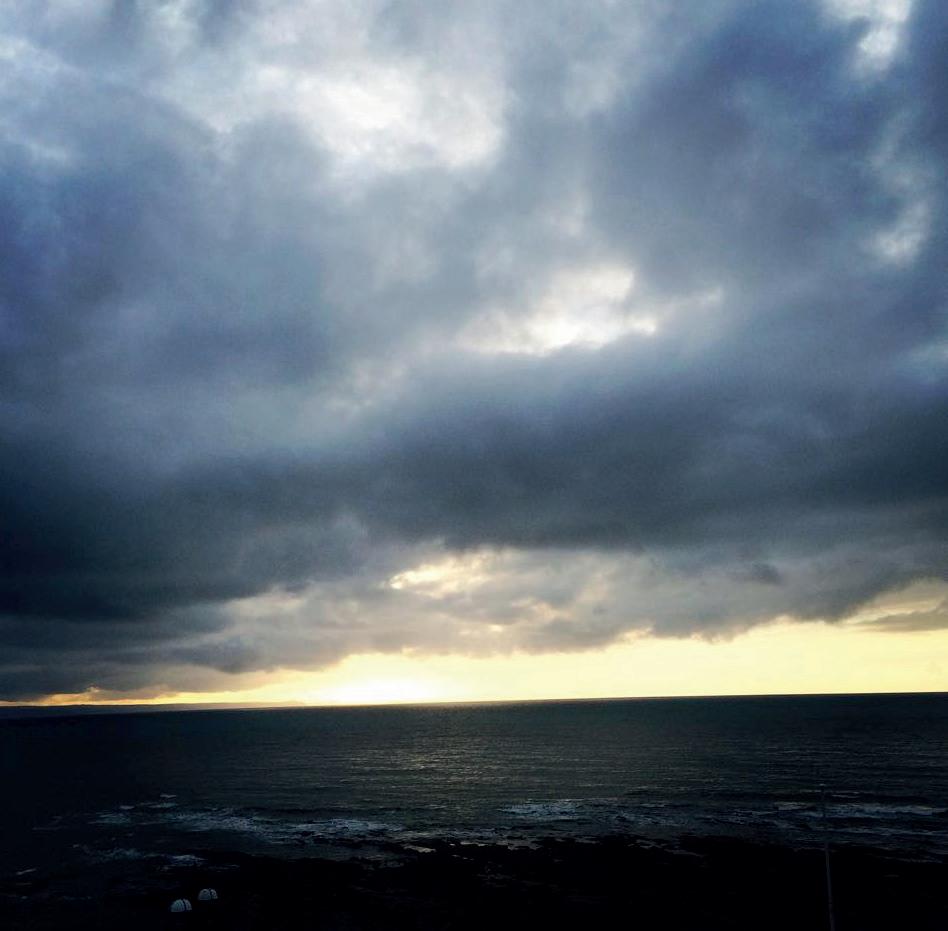
bodol o nerth y môr a’i gwylltineb na ellir mo’i ffrwyno, ond yn ei fantell eurgoch, gwelais ei ochor arall, ac mae swyn y môr bellach yn gyflawn, a mwy cytbwys, i mi. Ond yn bennaf oll, hynodrwydd mwyaf y profiad oedd ei rannu. Adre, yr wyf yn gyfarwydd â chrwydro a rhedeg y mynyddoedd ar fy mhen
fy hun a mwynhau’r rhyddid y rhydd hwnnw, ond hyd yn oed bryd hynny, teimlwn mai siom ydoedd mai dim ond fy llygaid i oedd yn gwledda ar harddwch y dydd yn ildio’i le i nos. Ond y Sadwrn hwnnw yn Aberystwyth, syllodd ddwy bâr o lygaid ar y machlud dros y môr, a theimlais ogoniant nad oes modd ei ddisgrifio.
Dyrchafwyd y weilgi yn fy nychymyg wrth iddi adlewyrchu marwor y machlud’
Morgan Owen










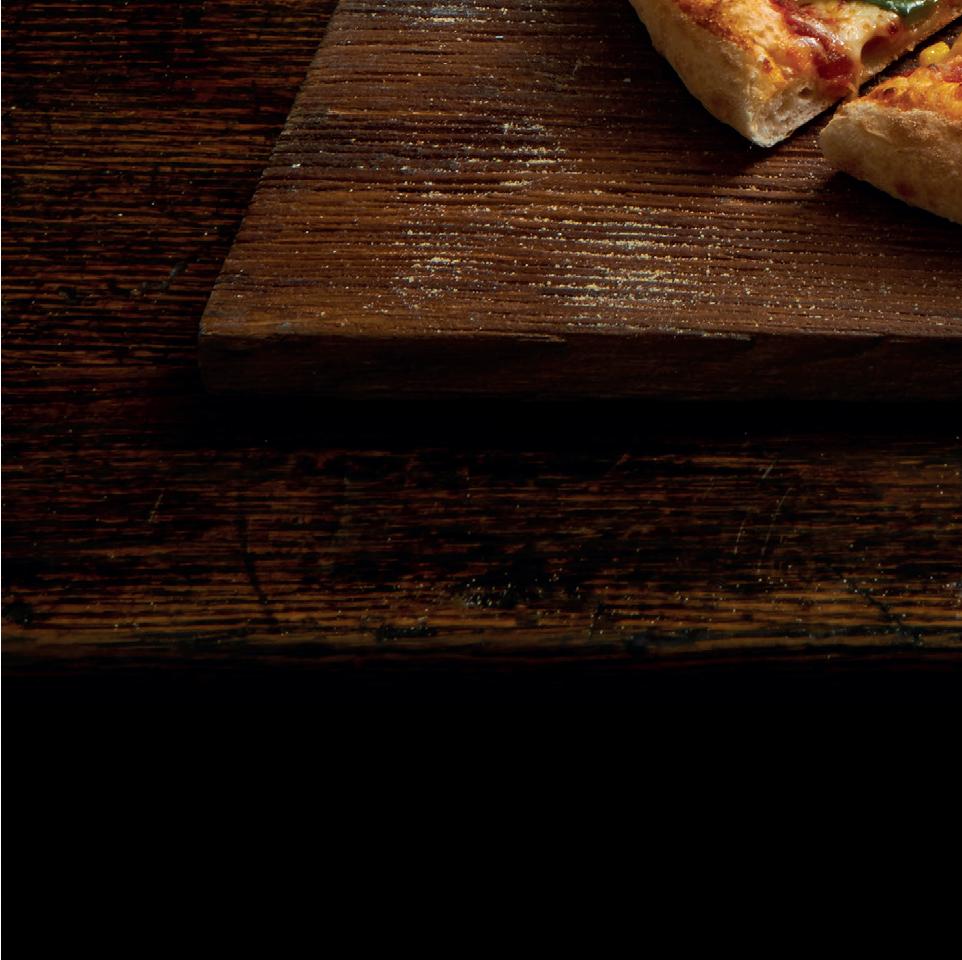







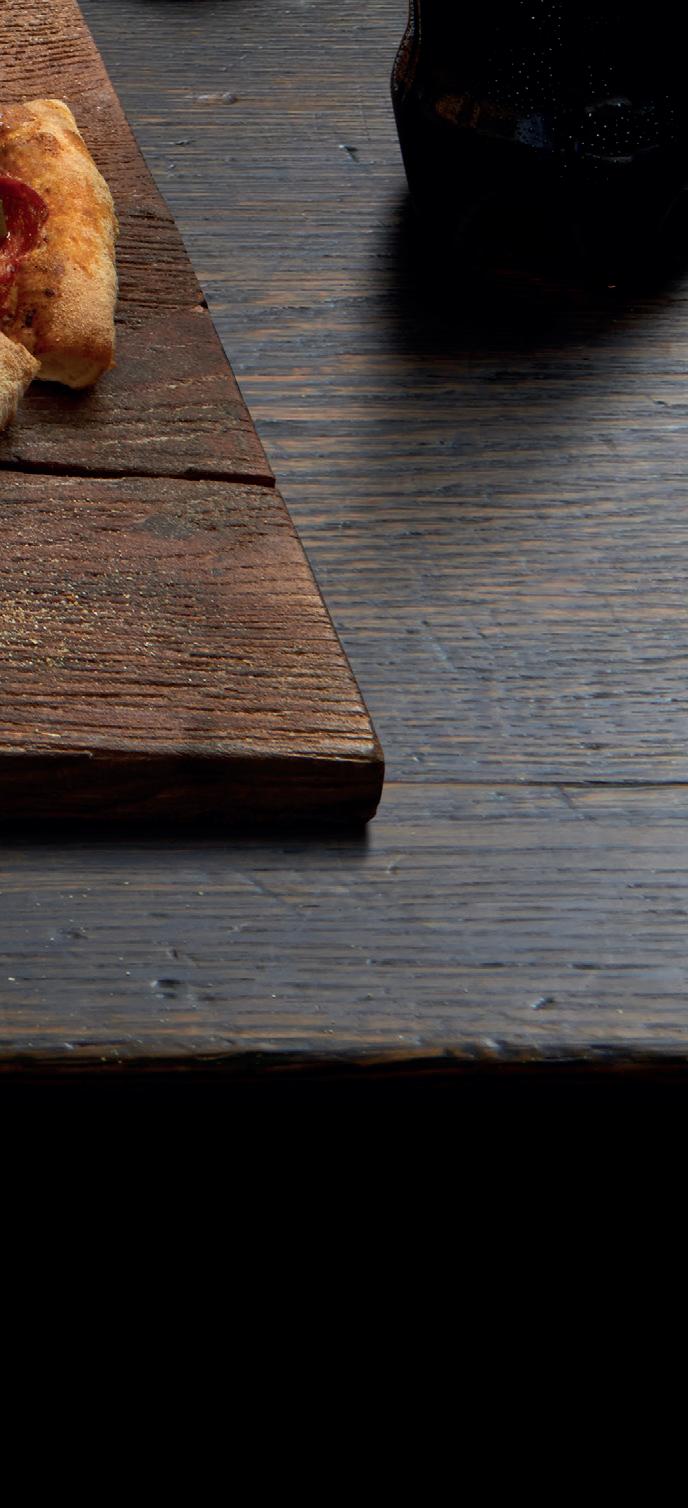

cardiffstudents.com/wintershowcase

Rents starting from£230 per person per month


Presented by:




Remember, we’re always looking for match reports. Email sport@ gairrhydd. com with your team’s progress!
Biomed student Amy Radford has won the very first Athlete of the Week award
Bryn Griffiths VP Sports & AU PresidentBiomedical Science 2nd year
undergraduate Amy Radford has now been fencing for 11 years, having been introduced to the sport by her cousin. At the age of nine, I’m sure her first taste of the sport was an unusual one as she explained her initial disappointment upon arrival at the local club and the discovery that it was fighting with swords not putting up fences. Despite this, Amy must have taken to it like a duck to water as by age 13 she had made her first appearance for Great Britain’s Under 20 Team! Needless to
say she was the youngest member of the team, and would again have been three years later when she was initially selected as reserve for the Senior Commonwealth Games before it was decided she was too young.
Up until this year Amy had represented for both England and GB, and competed in two Junior Commonwealth Games. Last week she took the piste in Largs in her first Senior Commonwealth Championship – e rotation of sports meant that Fencing, like Rowing, wasn’t in the Games this year.
In the quarter finals England were drawn against New Zealand and with the score tight at 24-22 Amy stepped up to the mark and took an 11-2 victory catapulting England into a 15pt lead going into the final bout. Overall Amy scored 20 of the team’s 45pts in only two fights compared to contributions of 12, 12, and 1 from the other three English athletes. England progressed through the competition to take the Bronze medal with Radford once again finishing strong with a 5-1 win in her final fight of the Bronze medal match against Australia.

Pictured: Amy Radford Any club member can nominate one of their teammates via the AU webpage after Wednesday matches through until Monday
tweet us @gairrhyddsport email us sport@gairrhydd.com or visit us online at gairrhydd.com/sport
succession of well worked tries left the score 37-0 at full time, completing the whitewash for Cardiff Medical School.
Following a recent National Association of Medical Schools (NAMS) cup match in which the Cardiff Meds won 41-0, Cardiff waited to see how Bristol Meds would respond with baited breath for this fixture. e weather was brisk, the ground soft and the pitch wide, perfect running rugby conditions to suit the Cardiff Meds.
After a 3 hour warm up due to “referee issues” the match kicked off with a bang. Cardiff ’s Medics were clearly up for it and, after running in 3 tries in the first 20 minutes without response, the match seemed to be following the same course as the previous fixture.
Gameplay broke down during the middle third of the match with what seemed to be an endless run of scrums. With light fading in the early winter afternoon, an agreement was made to cut the second half to 30 minutes. is seemed to spur Cardiff on and a
A dominant scrum, scintillating backs running and superb team play and work ethic proved too much for Bristol on this occasion.
Nonetheless, huge credit must go to Bristol Medics for sustaining their effort and performance despite the ever increasing margin. is well spirited and clean game was a pleasure to play in, and the sense of sportsmanship throughout the whole varsity competition speaks volumes of the young men and women who took part from both medical schools.
Squad list:
Forwards: A. Rees, F. Smith, G. Latters, M. Cooper, D. Mock, B. Cresswell, R. Pilcher, C. Watson.
Backs: S. Trewick, C. Edwards (c), D. Phillips, S. Wiggill, B. Jones, J. Brock, K. O’Rourke.
Replacements: A. Duff, J. Cantelo, O. Young, R. James.
On a hazy Sunday morning, Cardiff Medics FC boarded a coach destined for Bristol and the first ever Medics varsity. With a number of key players missing, including goalkeeper Matt Knight, Cardiff were up against it from the start. After watching all the other teams dominate the opposition in every sport, the nerves started to kick in at 1pm when the medics
football team entered the changing rooms. e warm up was integral due to the bitterly cold weather, and to get accustomed to the boggy field.
After a rousing speech from Captain Alex Cooper the Cardiff side were ready to go. e spectators went wild as the teams got into their starting positions, ready for kick off.
Cardiff were slow out the blocks, finding it difficult to adapt to the conditions. For the first twenty minutes it was a scrappy aff air,
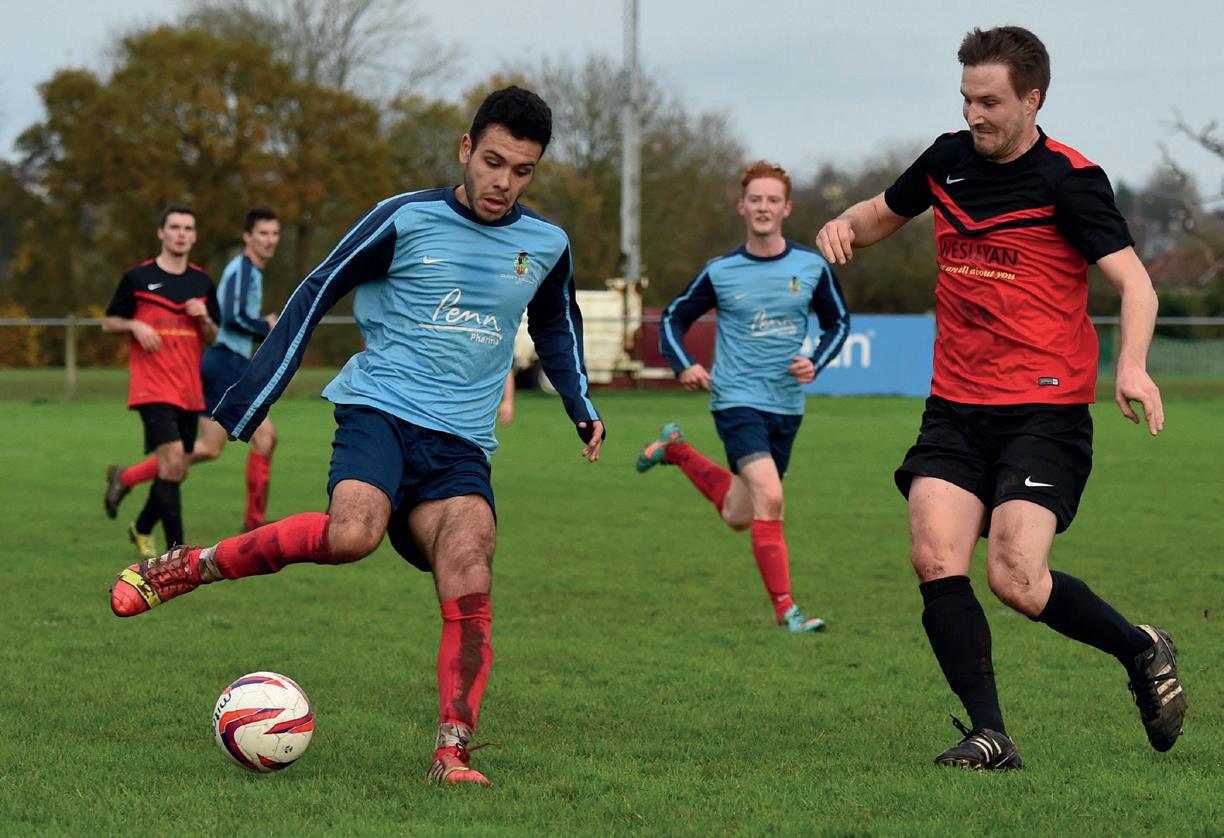
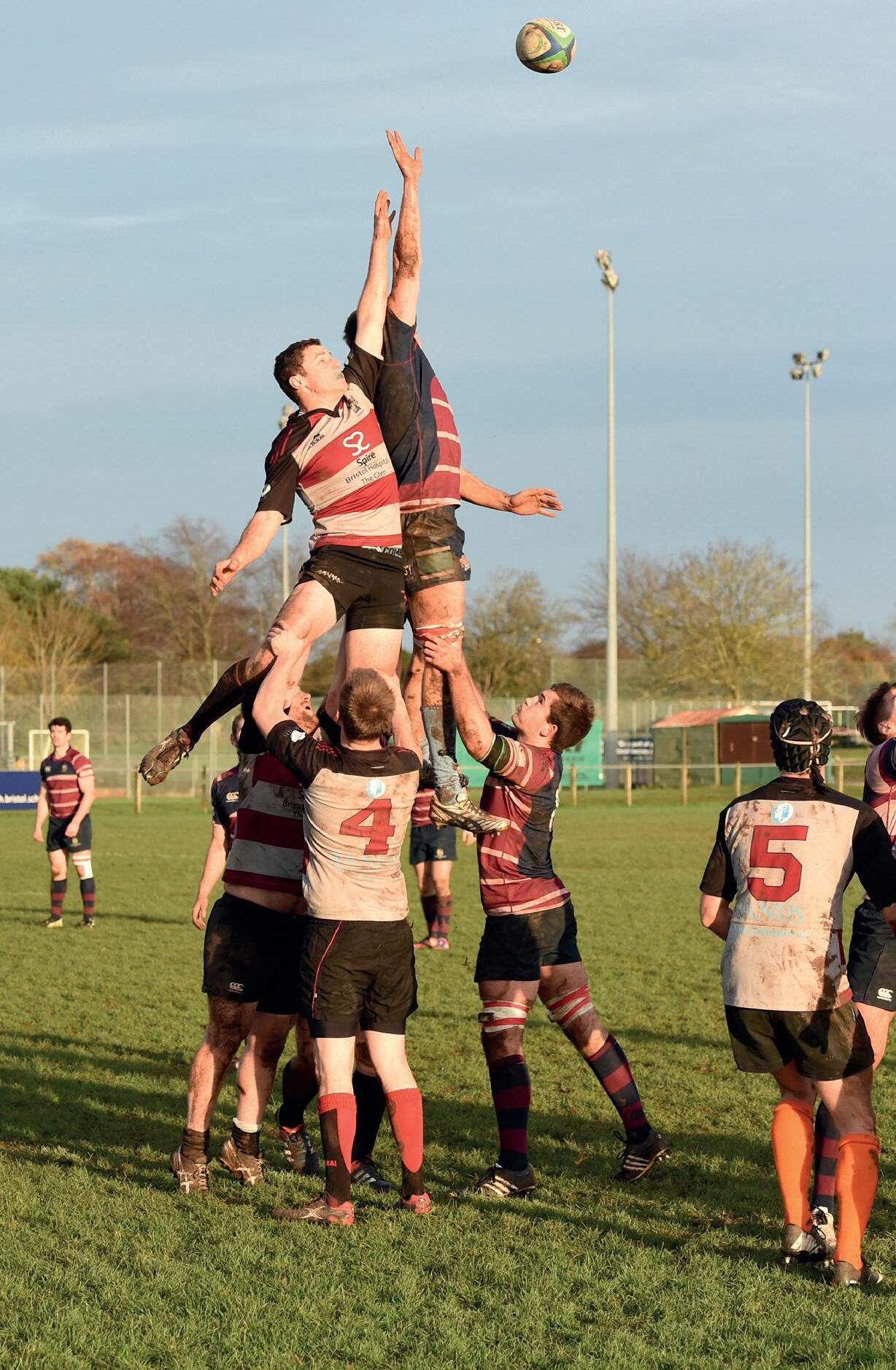
as expected, with some heated challenges being put in from both sides.
Bristol’s first goal came from a scramble in the box which proved too hard for replacement keeper Mark Shipway. After this, Cardiff settled and retained the majority of possession, but without an end product. ere was a strong penalty claim for the visitors, who also struck the woodwork from a free kick. e teams went in at the break with the scoreline 1-0 to Bristol.
e second half started similarly to the first, with Cardiff again finding it difficult to grasp the game by the scruff of the neck.
Bristol scored around the 60th minute with a fast counter attack down the right flank. A pass was flashed across the face of goal and tapped in by the Bristol frontman to double the lead.
With half an hour to go, Cardiff had a mountain to climb. e quality was there, but the game was now a test of Cardiff character. A tactical substitution and change of formation put four players upfront, which proved too much to handle for Bristol.
Cardiff mounted attack upon attack, until they finally broke through. Oscar Emmanuel cut in
from the wing, creating a clever onetwo with Dafydd Pearce to volley home Cardiff ’s first goal.
e momentum was now with the South Wales side, who created several chances. One shot was destined for the roof of the net, only to be denied by a terrific save from the Bristol keeper. e shot was pushed wide for a corner with two minutes to go, setting up for a dramatic finish. e corner was swung in from the left hand side at pace, and Kory Watkins leapt above his marker, and perfectly placing a glancing header into the back of the net, past the despairing Bristol keeper.
Cardiff were back to level in the match, seconds before the final whistle. e game went straight to penalties, despite Cardiff wanting to continue in open play due to their new found momentum.
Emmanuel, the Cardiff goalscorer, went in goal for the shootout, and after he scored the first penalty and saved Bristol’s second, Cardiff were in a good position to take the shield home.
Four out of four penalties were converted by Cardiff, when Bristol stepped up for their fourth. With an outstretched arm, Emmanuel denied the penalty to win the game for Cardiff.
on some better players which made for a more challenging and enjoyable game.
Playing outside in the freezing cold was a bit of a change for Cardiff, but they made sure they did a thorough warm-up and were ready to take on Bristol in the first ever Medics Varsity shield.
ere was great support on the sidelines from the rest of the netball club, and the football boys were out in force.
Cardiff started strong in the first quarter. ere were some great interceptions from the Cardiff sides, and the ball was worked quickly down the court into attack.
Sarah McAnallen and Emma Rodgers were ready to receive the balls in the circle and scored some great goals, netting balls from just inside the circle.
Bristol were down in the first quarter by a long way and Cardiff wanted to keep their standard high. In the second quarter, Bristol brought
Cardiff swapped some players around to make sure everyone got some good match play.
Cardiff put great defensive pressure
on Bristol at every centre pass, pushing their players towards the middle and dropping back to mark tight.
Bristol scored a few more goals, but Cardiff were still on form, making some great interceptions in the centre third
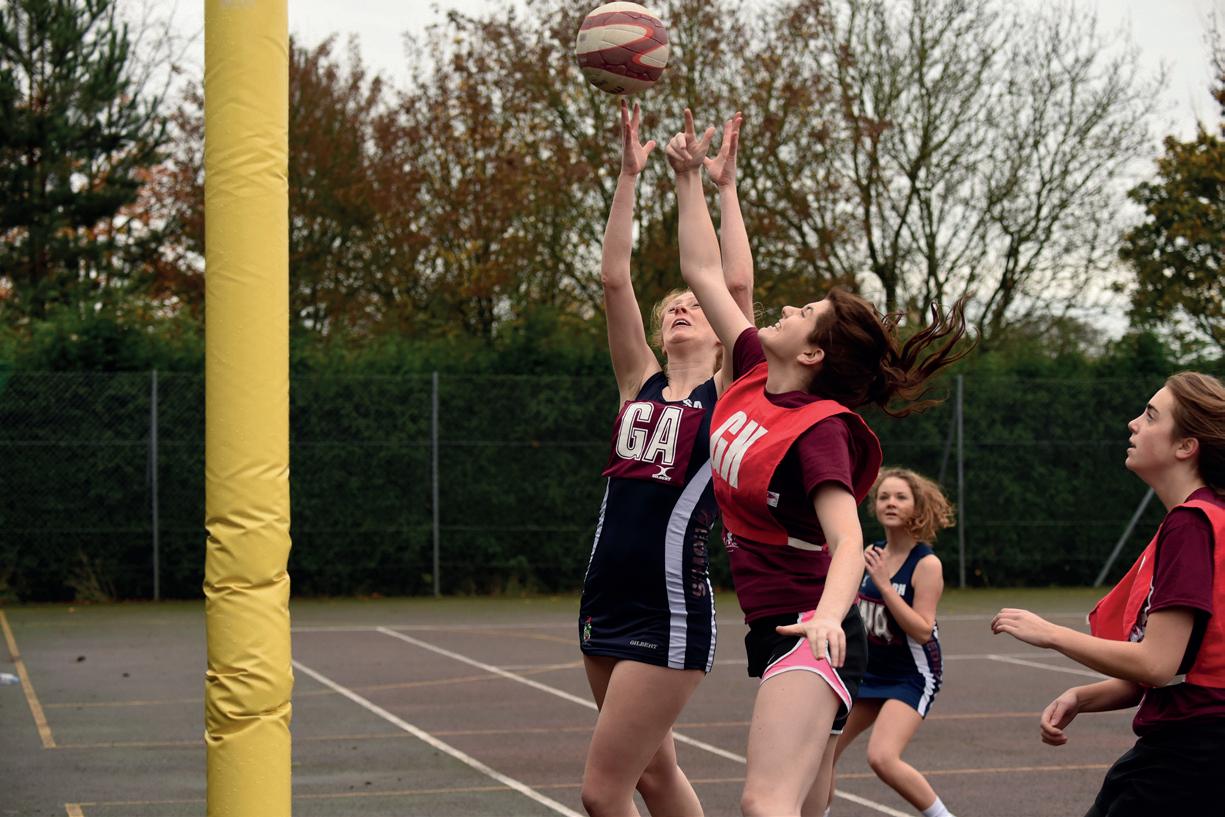
and finding great space on the court to receive the turned-over balls.
In the third quarter Bristol brought on a tall GK, making the high balls to the circle more difficult to receive.
Cardiff ’s attack quickly realised they needed a change of tactic and there was great play by the South Wales side, moving the ball around and working it into the circle. Both shooters were both on top form jumping up for rebounds and really challenging Bristol’s defence.
Cardiff continued to play well in the last quarter, creating space on court and driving the ball down into attack.
After a series of well-worked scoring attempts, the game was brought to a close. e final score was a welldeserved 57-21 victory to Cardiff, which brought the first ever Medics netball Varsity title back to South Wales.
Squad list: A. Smale, B. Linley-Adams, A. Bayers. F. Melindo, R. Hackett, S. McAnallen, E. Rodgers
Bristol Ladies.................................0
Cardiff Ladies................................3
Gaines and Jenny Stuart-SmithWatching the netball girls and hockey boys beat the Bristol Medics put the pressure on the hockey girls in the lead up to their game. Captain Charlotte Hayward gave a determined team talk before push back, and the game started with the Cardiff Medics hungry for victory.
e first half was slow; missed opportunities and scrappy play led to frustration from both players and umpires alike. With the title of the first ever Medic Varsity at stake, both teams were strong and aggressive on the ball, but with little reward.
e Bristol team utilised their strongest players in the centre of the pitch, putting the back 4 under pressure with some dangerous breaks through the midfield. 5th year, Tuke, held her own in the centre, beating numerous players and distributing the ball from the midfield.
Despite some great attacking breaks down the lines by wingers, Silver and Lea, the first half ended with an uneventful 0-0 score-line.
Bristol Men..................................1 (1)
Cardiff Men.................................1 (4)
Cardiff required penalty flicks to defeat their Bristol counterparts in the men’s hockey fixture.
After a tense four quarters, in which Cardiff had taken a first half lead only to be pegged back by a determined Bristol side, the away side managed to keep their cool and put four penalty flicks past the Bristol goalkeeper, with a solitary
Hayward motivated her team at half time, who entered the second half stronger, more composed, and determined to grab an early goal. e support of the men’s hockey team on the side-line drove the team into an early hold of the game, maintaining possession and switching around the back to create opportunities down the wings.
Jenny Stuart-Smith and Megan Burton dominated the defence, blocking any threats from the fast Bristol forwards.
A neat pass and outstanding skills from fresher, Izzy Jones delivered CMLHC with their first goal of the match after a solo challenge on the Bristol keeper.
With the crowd behind her, Izzy proceeded to repeat this performance a few minutes later, when a strong pass up from midfield from Phillips came her way. She weaved the ball towards their goal, along the baseline and slotted it straight past their keeper, granting Cardiff a 2-0 lead.
With a new spring in their step and enthusiastic cheering from the sideline, CMLHC continued to maintain composure and control on the pitch.
e fitness and patience paid off, with
reply from the hosts.
It was a frustrating day for the Cardiff team, who struggled to break through a resolute Bristol defence, and the opposition provided a more sturdy test than Cardiff’s women faced in their game later in the day.
However, the Bristol resistance ended when the game went to penalty flicks come the final whiste, and a series of saves and misses on Bristol’s part saw the visting Cardiff Medics come away with the victory.

Cardiff ’s final goal set up by a forced foul in the D by the panicked Bristol defence.
A strong push out from Club Captain, Stuart-Smith provided a perfect set up for captain, Hayward to secure a 3-0 with a rocket shot into the bottom corner, which was shortly followed by the final whistle.
A comfortable victory for the team from South Wales, despite a sedentary
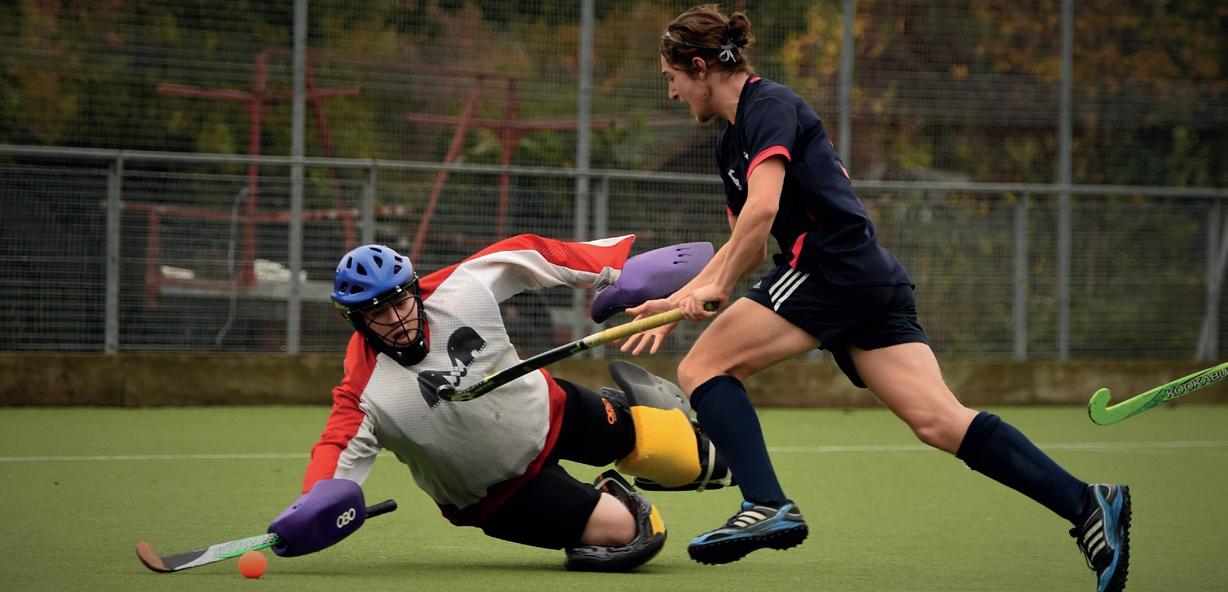
(Photographer:
We try and play possession, always playing the easy option - I get angry if people don’t play it easy.
tweet us @gairrhyddsport
email us sport@gairrhydd.com or visit us online at gairrhydd.com/sport
Opus 11 are one of the newest teams in the IMG and serves as the team for music students at Cardiff University. Captain Laurie Evers talked about his hopes for the team, and spilled the beans on his teammates. Evans, an Arsenal fan, also discussed the Gunners.
What is your role as captain of the team?
I basically just organise everything As we are a completely new team I have done things like getting the nets to, getting the players in, organising match days and some pre-season friendlies. We have had a lot of interest but getting people committed is hardest part of the job. We have sixteen players signed on but our problem has been that because there hasn’t been a music team for a while most of the music players already play for the University team so they are always busy.
Do all your players do music or play a musical instrument?
No! About half of us do, the rest is built up from flatmates, housemates, and people on different courses.
Do you have socials?
Yes, but I don’t organise them. My housemate is a bit of a drinker so he organises them and has become the social sec.
What is the standard like in your team?
It’s variable - I made the team because I wanted to play football but I wasn’t good enough for some of the other teams so I made it for people who like football who aren’t that good. However we actually have had some players who are pretty good so they’re kind of teaching us. It’s like Sunday league; we have three players who have played for Uni, Josh Eckley is making his debut soon and Adam Price is very good. Have you had many games this year?

e Cardiff Blues’ season is already in a perilous state, only three months into the Guinness Pro 12 season. As has previously been stated in this very column, Mark Hammett will need time to create a competitive side in the Welsh capital, due to the mess that the Kiwi inherited from the failed regime of Phil Davies.
However, despite the notion of Hammett needing more time still ringing true, what will be very concerning for Blues supporters is that after three months at the helm there is very little improvement whatsoever on
A lot of them have been called off actually. We have played three so far and we’ve had a rest week - we lost the first one 3-2, which was gutting though! We were 2-0 down within ten minutes. We pulled it back to 2-2 by the 85th minute and some awful play right at the end cost us. We lost our second game 9-0 to JOMEC, they were insane and in our last game we won 3-1.
Do you have any targets for the season?
We don’t really have any long-term targets. We look at the game in front of us - if we can end up third in our division that would be good, and we have already beaten the team who were in third so we think that we can end up there.
What are the strengths and weaknesses in the team?
Everyone can play football but sometimes we tacttically aren’t aware. We are probably better at the back because that is where most of our experienced players play.
As you’re an Arsenal fan, would you rather have Alex OxladeChamberlain or eo Walcott to help your team going forward? Ox by a mile as he doesn’t get injured all the time! He would fit in alright with his pace down the wings. We play down the wings quite a lot so he would definitely fit in, I think Ox can play many more positions than Walcott.
Wouldn’t he have to play an instrument? Rosicky is a guitarist so he could be eligble.
Which player in your team is most likely to be sent off?
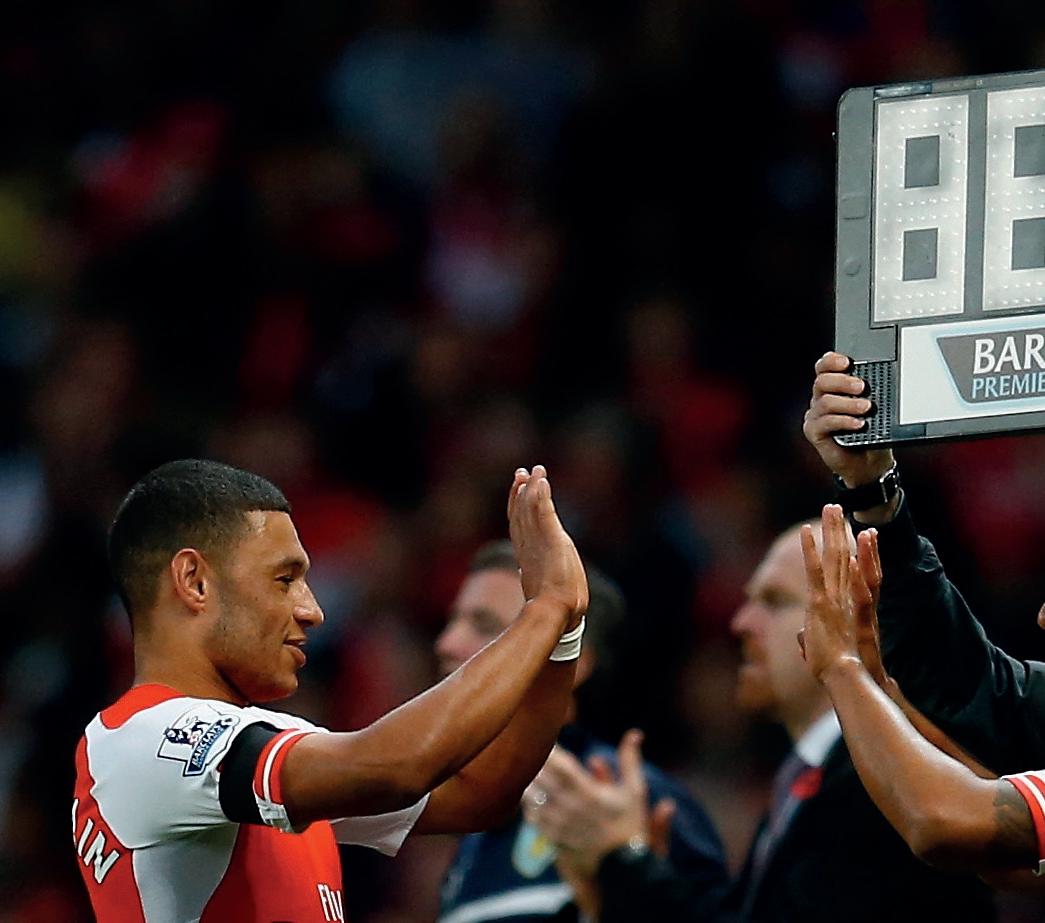
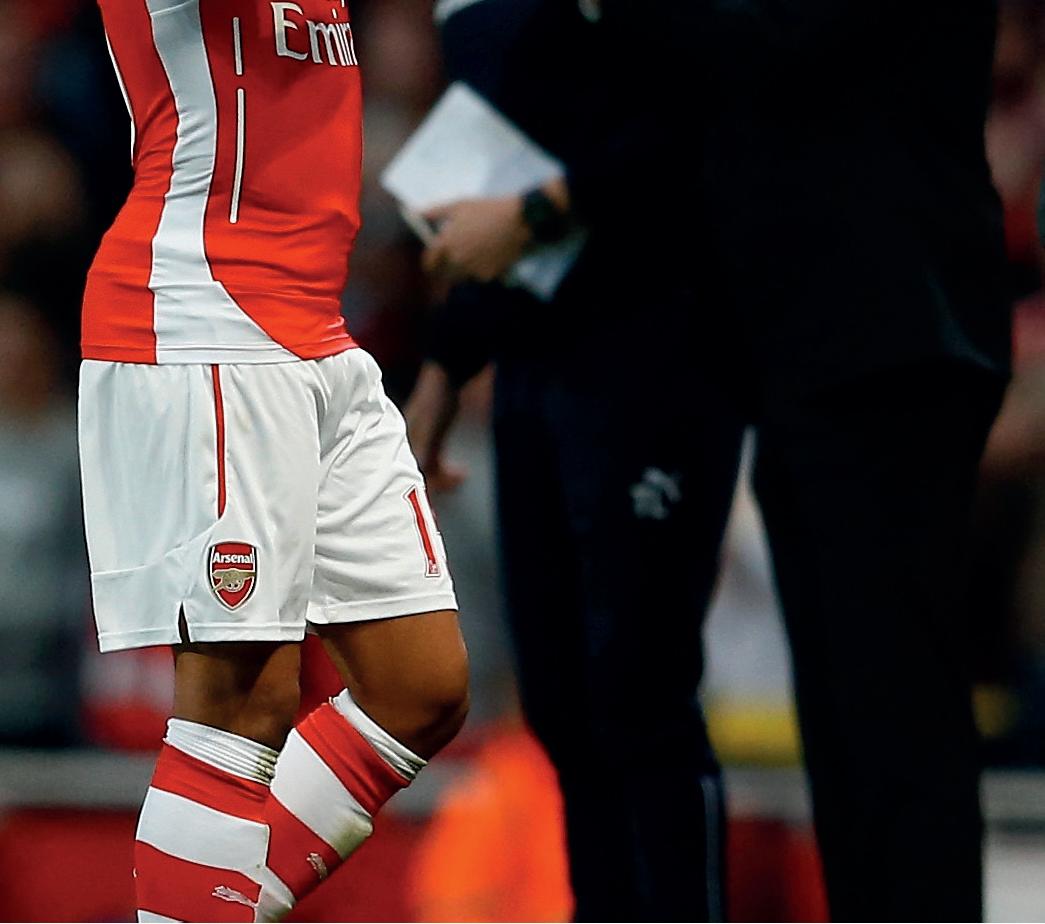
Andy Cirly probably. He is 6ft 5, he is massive; he played up front for the first few games and now he plays centre back. He is super physical, no nonsense.
the field of play.
Of course, the former Hurricanes boss was never going to come to Wales and fix all the Blues’ deep rooted problems as if he had a magic wand at his disposal, but the Arms Park hierarchy would have at the very least expected there to have been some form of on field improvement by now. Instead, what was supposed to be Wales’ strongest region this term, are languishing down in eighth place, and fourteen points off that all important Rugby Champions Cup spot.
One would expect the Blues’ Pro
Do you have any team tactics?
We were a bit of a Stoke, we used to lob it to the guy up front but now we try and play possession, always playing the easy option - I get angry if people don’t play it easy.
Who are your rivals in the league?
Personally I know a few guys in Law
A so that’s a big one for me. Seeing as we’re new we have no historical rivalries.
12 form to improve over the coming months given the quality of player that they have at their disposal. A front five of Welsh prop legends Gethin Jenkins and Adam Jones, test Lion hooker Matthew Rees, All Blacks lock Jarrad Hoeata, and Samoan international Filo Paulo should be able to compete in the physical stakes with any side in the Guinness Pro 12. Unfortunately they are not functioning as a unit, with the Blues’ lack of improvement upfront of paramount concern. Hammett has already gone public with his claim that the Blues’ professionalism preparation

What do you enjoy most about the IMG league?
It’s a good mix between competitiveness and friendliness, people do take it seriously, it is not just a kick about, but at the same time it is nice to play with your friends.
Finally, who is the most skilful player?
I’ll probably say Liam, he scored a hattrick in our last game, so can’t fault him on that.
wise is 15 years behind what he left behind in the Super 15. at comment is an extreme example of hyperbole, with the Blues’ training facilities at the Vale of Glamorgan as good as anything in world rugby, therefore there really shouldn’t be any excuses on the fitness front.
Of course Mark Hammett is a very capable rugby coach, but gradual improvements must begin to show over the next couple of months, otherwise the Cardiff-based region will be plying their trade in the second tier of European rugby for another season.
Steffan Thomas Pictured: Arsenal fan Evers believes Alex OxladeChamberlain is the future, rather than eo Walcott Photgrapher: Julian Finney via Getty ImagesGoing abroad always seems an escape: away from the scrutiny of the British press a manager can thrive
As David Moyes becomes the latest British coach to venture beyond our shores, we ask why so few leave their comfort zone
Such is the rareness that a British coach decides to up sticks and look beyond our Isles for a job in football management that the press goes into perpetual overdrive at the very thought of one of our own seeking out pastures new in some foreign land.
David Moyes is the latest to try his hand at coaching abroad, taking the reins at Spanish club Real Sociedad following a poor start to their La Liga campaign. e Scot follows in the distinguished footsteps of Sir Bobby Robson, Terry Venables and John Toshack in moving to Spain, but just why is it so rare that we see British managers making steps outside of their comfort zone?
After all, the Premier League isn’t overtly accommodating to homegrown coaching talent – at the time of writing there are eight foreign managers in charge of teams in the division, while there has never been an Englishman in charge of an English Premier League winning team since the competition’s cash-driven metamorphosis in 1992. Going abroad always seems an escape; away from the scrutiny of the British press a manager can thrive. You may have heard that David Moyes’ last job didn’t go too well; his reputation took a body blow with his failed spell at Manchester United last season, but he’s determined to mend it at Sociedad.
In a similar vein to Moyes’ move, Steve McClaren went all Dutch on us in joining Eredivisie club FC Twente following his England team’s dismal failure to quality for Euro 2008. McClaren in part restored his reputation by winning the Dutch title in 2010, and is now back in England heading up Derby County’s Premier League promotion push.
Another man that can offer Moyes advice is the incumbent Wales manager Chris Coleman, who managed Real Sociedad briefly when they were in the Spanish second division. Coleman was recommended by Sociedad legend John Toshack, who enjoyed a fruitful spell in San Sebastián in the eighties, including a Copa Del Rey win in 1987. And at two British coaches I find myself all out of recent examples. e obvious question to ask would be: Why

Will the real Cardiff City please stand up? Is it the home-comforts Cardiff whose form in South Wales is such that thoughts are gathering of a play-off push or even a top two spot? Or is it the away day Bluebirds who offer reminders that a real slog is ahead this season and that there could be too much to do to realise dreams of a Premier League return?
It is nothing new for sides to see their form see-saw depending on whether they are in their usual surroundings or on the road in a



is this the case? Why do so few British managers roll the dice?
For a start, the overwhelming narrative around Moyes’ move seems to be along the lines of: ‘he’s brave’ and ‘good luck to him’. e last time I checked bravery wasn’t taking a job for which you are qualified and for which you are paid excessively, while you don’t need luck to learn another language. What we should be saying is: ‘he’ll do well, he’s a good manager’ or vice-versa depending on your point of view – but to insist that such a move is courageous is patronising to both club and coach.
Yet what other obstacles are there other than the language barrier? e game is still played with eleven players per side and a spherical ball is it not?
It is as if British coaches have become settled in a culture where there is no need to adapt - maintain the status quo, keep calm and carry on, etc.
Perhaps it’s a reflection of the times; the Premier League has killed
far-flung corner of the division. But what is strange about Cardiff this term is that few sides are so wildly different from how they are at home and how they fare away.
In terms of home form, there haven’t been many better than the Bluebirds – even considering the successive home losses to Norwich and Middlesbrough that led to the departure of Ole Gunnar Solskjaer earlier this season.
The question Cardiff’s players have to ask themselves is why do they seem so comfortable and
the British game, or so the story goes. Cheap imports from abroad are squeezing the life out of grass-roots football, and they should be deported – the currently popular Ukip discourse of ‘blame Johnny Foreigner’ has taken its hold on the game in our country.
Maybe we’re just rubbish and we’re in a state of denial. Perhaps management isn’t for someone of the British persuasion; does our national ability to throw a pessimistic spin on the most positive of situations affect our football management skills? Sir Alex Ferguson would argue with you on that one.
As alluded to previously, the main reason a British coach goes abroad is to escape the scrutiny of the media, and only when they’ve ‘done their time’ will they be permitted to re-join the Premier League gentlemen’s club. Managing abroad is framed as something of a punishment nowadays, and quite frankly it shouldn’t be – La Liga and
confident on their own patch compared to on the road? There does not appear to be a great switch in styles, either from the Bluebirds or the sides hosting them.
Cardiff do have the quality – as they have shown at home – for this trend to be bucked. The key characteristics such as organisation and attacking fluidity that Slade has attempted to drill into the team should be there, no matter on what patch of grass.
True, there is not the fans’ backing to go forward and seek
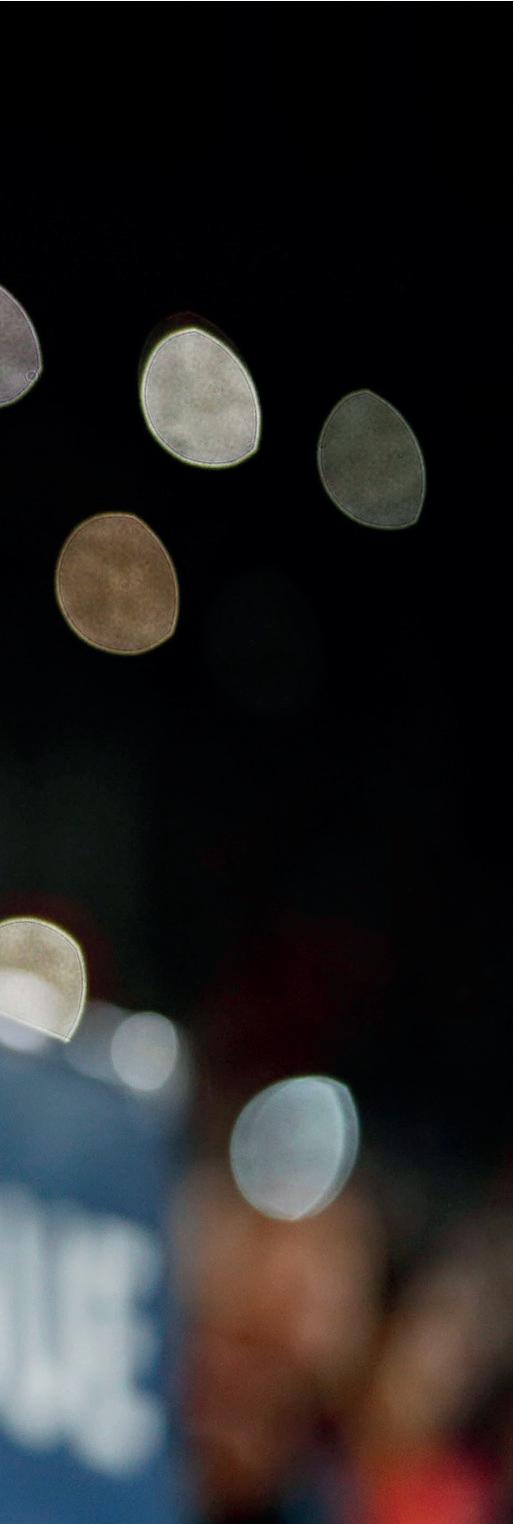
the recent German-Spanish monopolisation of the Champions League and international tournaments. It’s all about perceptions really, and it seems we have them totally wrong.
e British (and English in particular) seem inclined to turn their nose up at foreign football and have been fooled by the commercial juggernaut that is the Premier League into believing that the competition is the undisputed king and that it is worshipped the world over.
Make no mistake, David Moyes will have time; Real Sociedad are a club with modest funds and a production line of talented young players, much like the Everton team the Scot managed with great success for eleven years before his ill-fated stint at Old Trafford. Here’s hoping he succeeds –he may just change our perceptions if he’s not careful.
victory away from home like there is at the Cardiff City Stadium, but surely to be hard to beat is the same at home as it is away.
Indeed, putting wins aside, isn’t it more acceptable for teams away from home to dig in and graft out a point when the game isn’t on to win?
Could it be that an unfortunate run of results has started to have a psychological effect that could run and run? Only Cardiff themselves can stand up and show their true selves.
tweet us @gairrhyddsport
email us sport@gairrhydd.com or visit us online at gairrhydd.com/sport
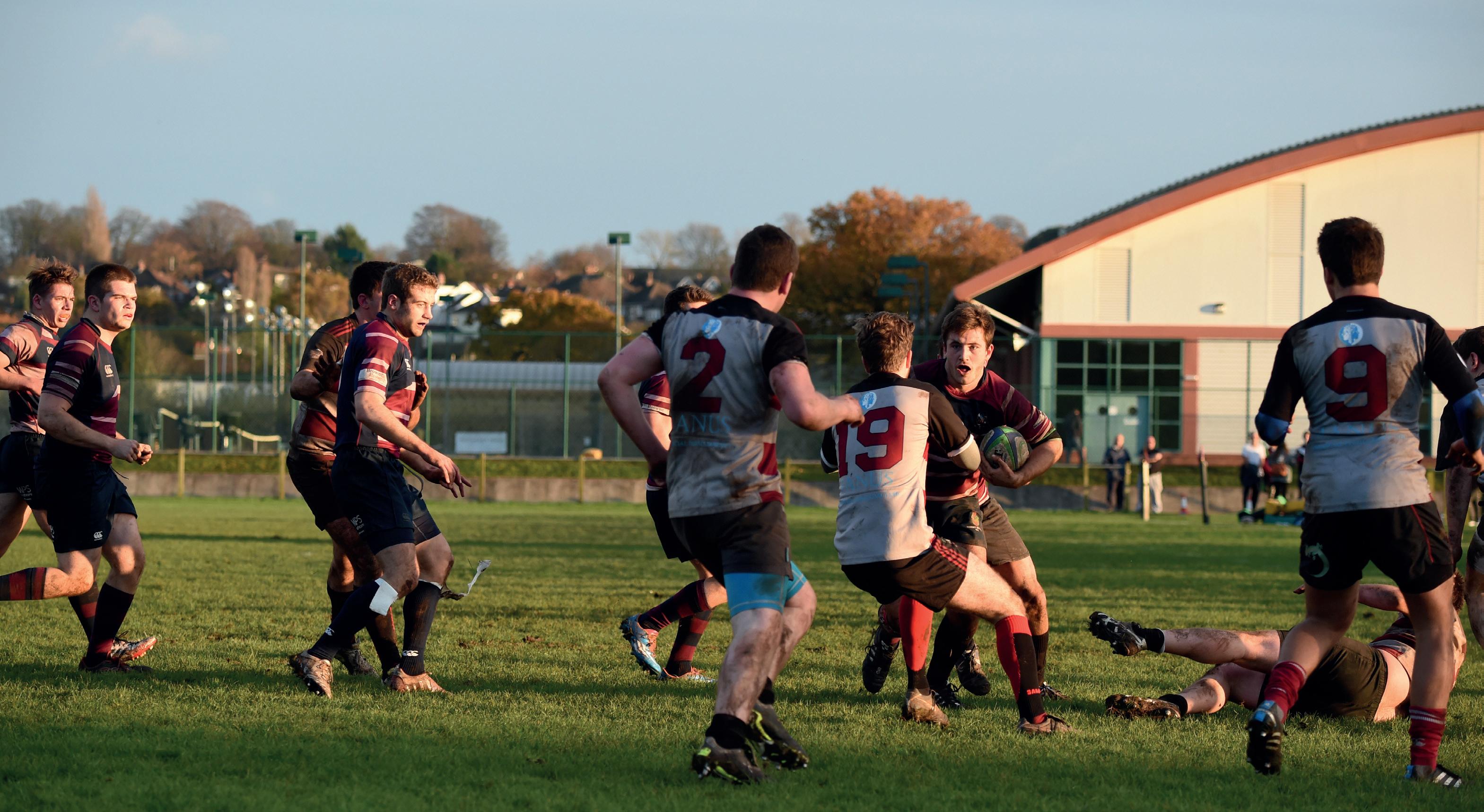
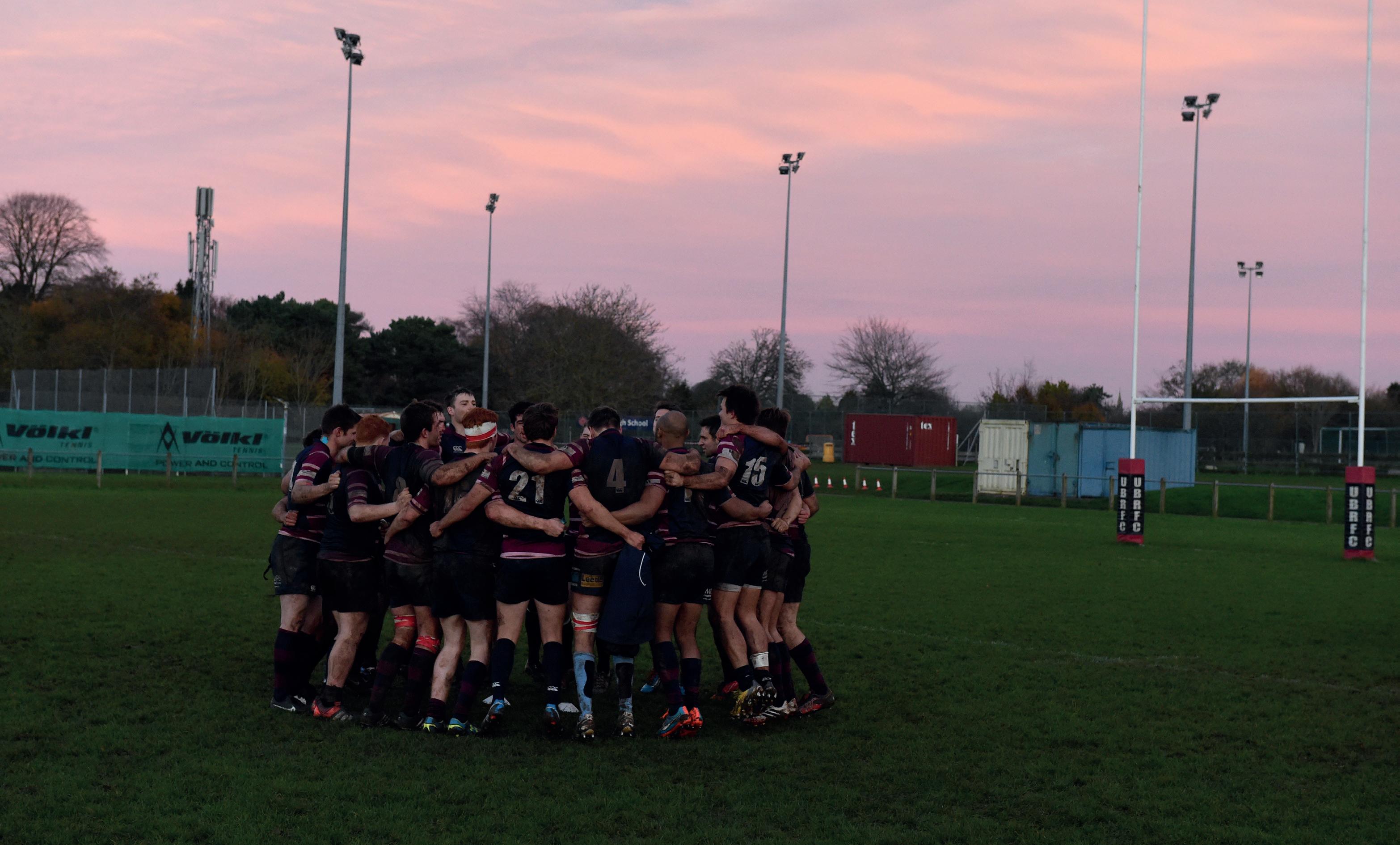
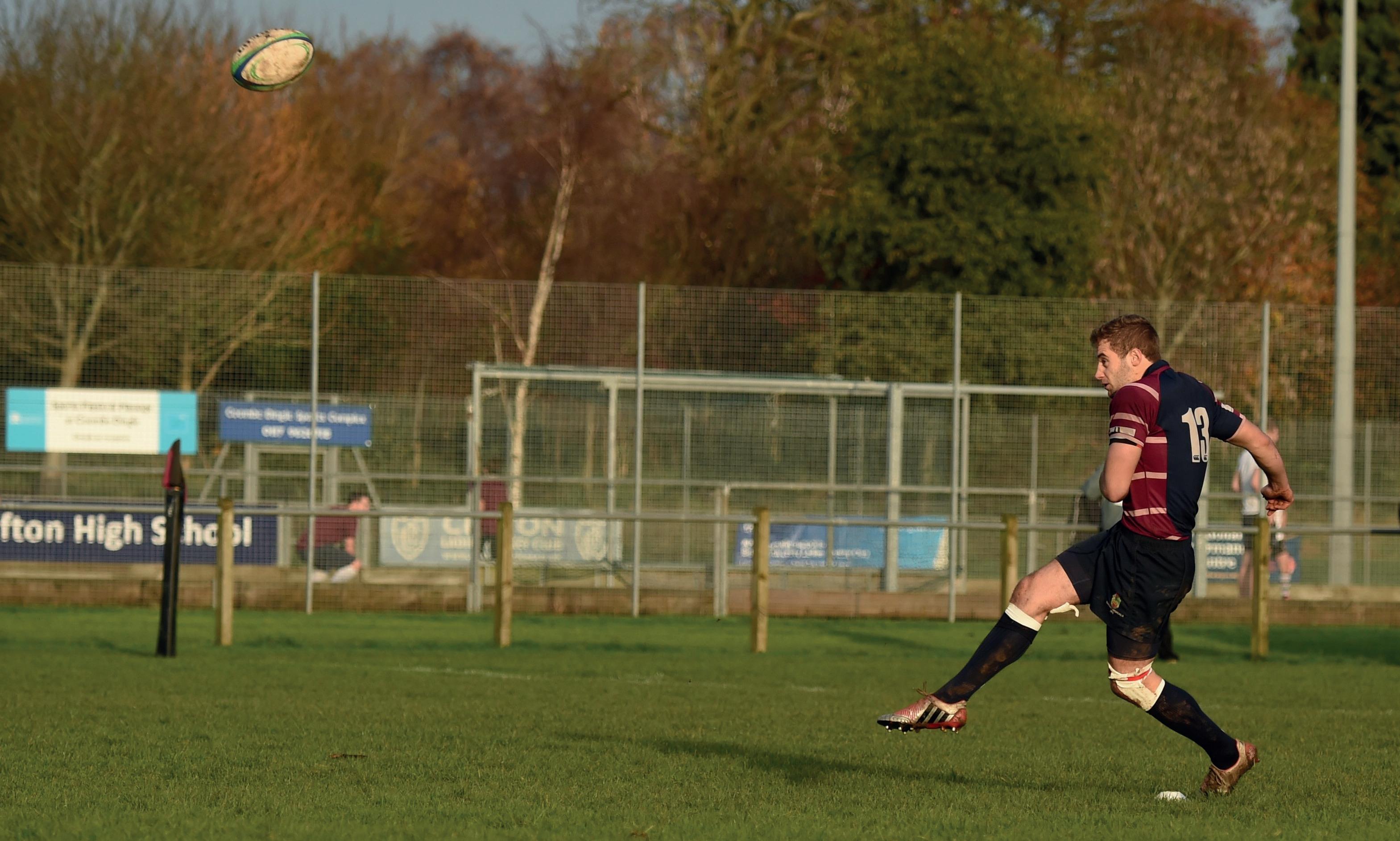
The inaugural Medics’ Varsity turned into a Cardiff whitewash as they comprehensively beat Bristol over all sports at Coombe Dingle
Cardiff’s medical students proved their mettle as they gave Bristol University a hiding to bring home the first Medics’ Varsity Shield last weekend. Medic students competed in rugby, football, netball and hockey, securing victory in every single match played on the day to condemn Bristol to a disappointing inaugural
Varsity defeat.
The event, organised to give the significant medical student population on Heath Park Campus their very own Varsity experience has been hailed as a huge success by organisers and participants alike.
Hosted by the University of Bristol’s Coombe Dingle Sports Complex, the event was the first
in what organisers hope will be an annual occurance.
The rugby medics team’s 37-0 destruction of their Bristol counterparts polished off a perfect day for Cardiff, and bad weather held off despite the late November cold.
While, as expected, not as many spectators turned up compared to the Cardiff-Swansea Varsity clash,
their were enough to make a good atmosphere at the games played.
In the five games played, three were won in regular time, with thrashings from rugby and netball.
Meanwhile the football and men’s hockey matches went to penalties, which resulted in Cardiff victories that brought the Medics Varsity Shield to Cardiff’s trophy cabinet.

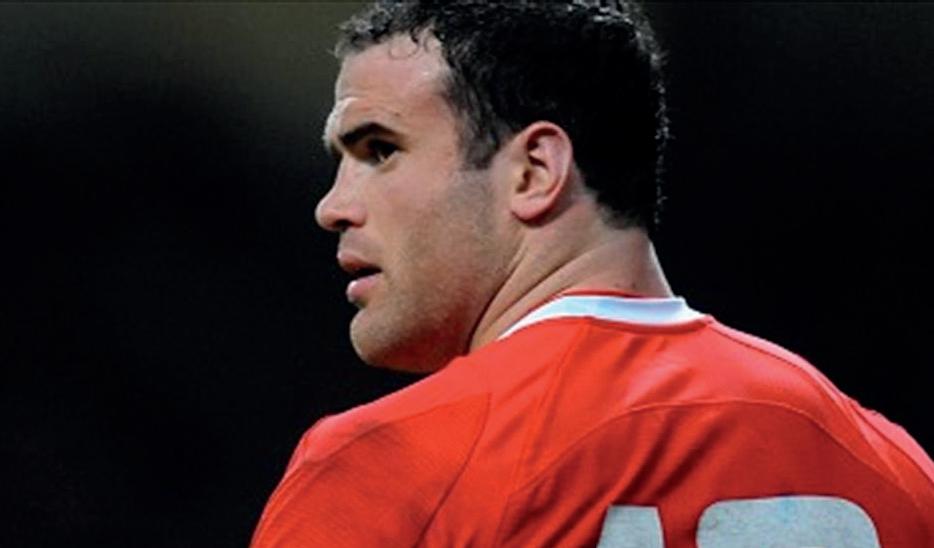

Blues column: Can Hammett revive poor season? P38>>

Should more British coaches follow Moyes’ lead? P39>>




City column: Home comforts and away day blues P39>>